It seems we can’t find what you’re looking for. Perhaps searching can help.




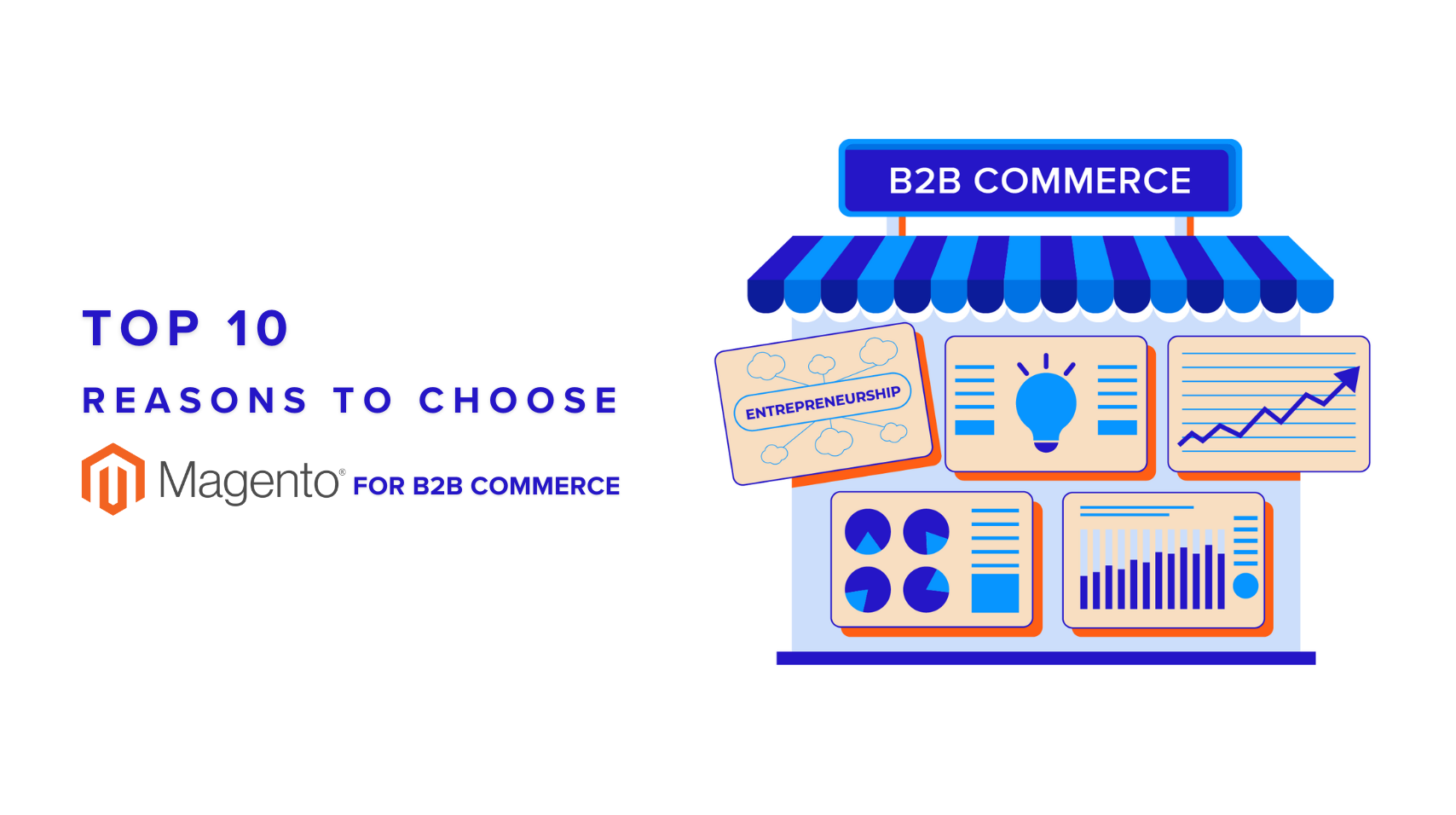
TOP 10 REASONS TO CHOOSE MAGENTO FOR B2B COMMERCE
Over the past decade, Magento has solidified its position as one of the leading eCommerce platforms in the market. With its robust capabilities, the platform serves not only B2C businesses but is also a popular choice for enterprises.
By combining Magento’s strength with the specific requirements of B2B Commerce, you can leverage this platform’s powerful benefits. In the following part of the article, let’s explore 10 reasons why Magento is the ideal choice for deploying this great business model.
What is B2B Commerce?
Business-to-business commerce (B2B Commerce) refers to the buying and selling of goods or services between businesses rather than between a business and end consumers (B2C). In the B2B environment, transactions often occur on a large scale and involve large orders, long-term contracts, and strategic partnerships.
This business model has distinct characteristics and requirements compared to B2C Commerce. In the B2B world, businesses typically have more complex demands regarding product management, order management, customer management, and compatibility with enterprise resource planning (ERP), customer relationship management (CRM), and other systems.
Additionally, the business model often requires features such as order confirmation, complex payment processes, batch ordering, and wholesale pricing. For B2B enterprises, choosing a suitable eCommerce platform is crucial to ensuring business efficiency and delivering the best user experience for their partners and customers.
What is Magento?
Magento is a powerful and flexible eCommerce platform developed by Magento Inc., a subsidiary of Adobe. Launched in 2008, it quickly became one of the top choices for you looking to build and operate professional online stores.
It allows you to create custom eCommerce websites. This platform provides a range of features, including product management, order management, payment integration, customer management, and many others, enabling you to easily manage and operate your online stores efficiently.
It is built on open-source code, meaning that you can access and customize the platform’s source code based on specific technical requirements.
Ten reasons why you should choose Magento for B2B Commerce
Reason 1: Customization and scalability
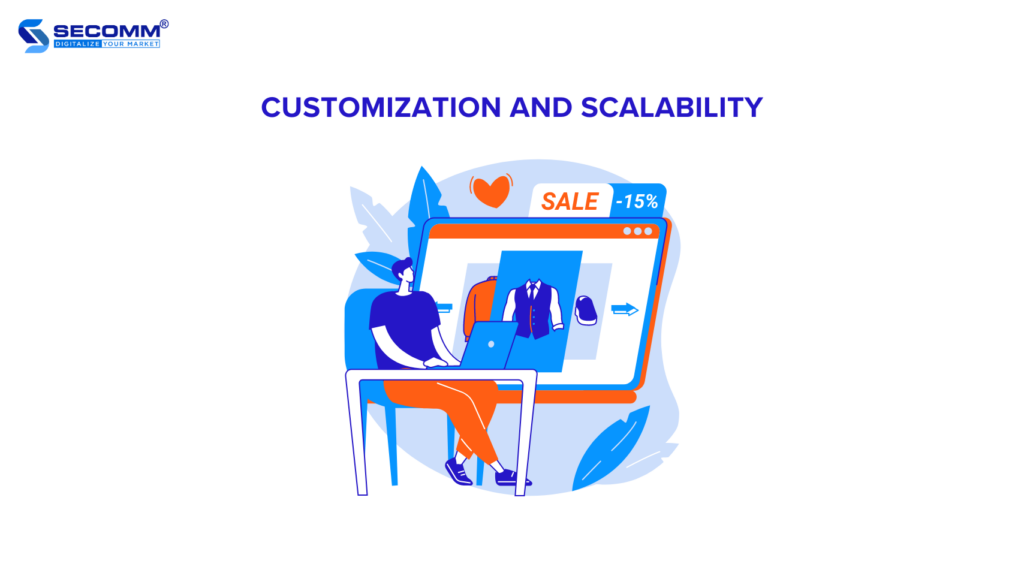
Magento’s open-source platform characteristic enables businesses to easily and effectively expand their business scale. This is particularly important as businesses grow and must enhance the system’s scalability.
Additionally, the platform provides high customization capabilities, allowing businesses to adjust to their specific business needs flexibly. This also means that the shopping experience can be customized to become unique and tailored to the target customers.
Reason 2: The Comprehensive B2B platform
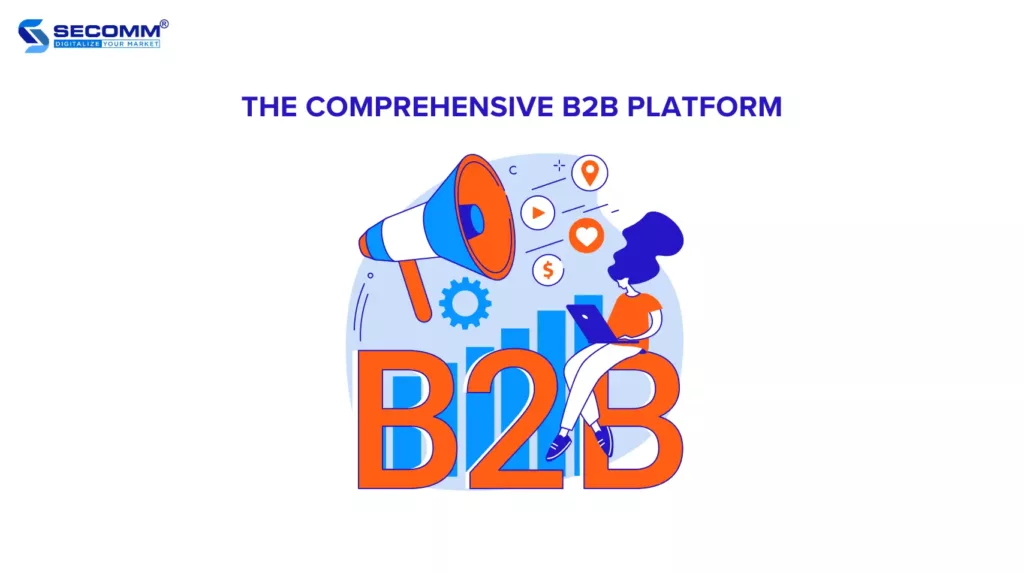
In addition to offering built-in Magento B2B features, the platform allows businesses to seamlessly and quickly integrate with many third-party applications and systems, thereby creating a comprehensive and automated eCommerce system. Some integrated systems may include:
- Enterprise Resource Planning (ERP) systems
- Customer Relationship Management (CRM) systems
- Product Information Management (PIM) systems
- Point of Sale (POS) systems, and so on.
Reason 3: Order management
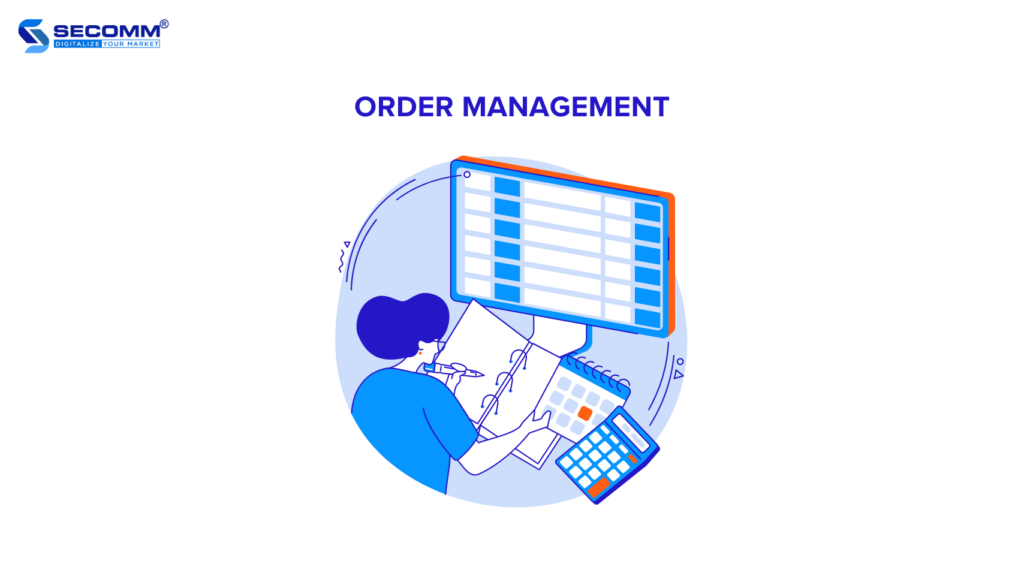
Magento B2B provides a variety of order management features, from creating and editing orders to tracking and processing orders efficiently. This helps B2B businesses easily monitor and manage their orders accurately and consistently.
Additionally, it offers tools and features that allow tracking and analysing their orders’ performance. From generating overview reports to tracking order history and purchasing trends, the eCommerce model deployed, you can better understand your activities and make informed strategic decisions.
Reason 4: Payment and shipping options
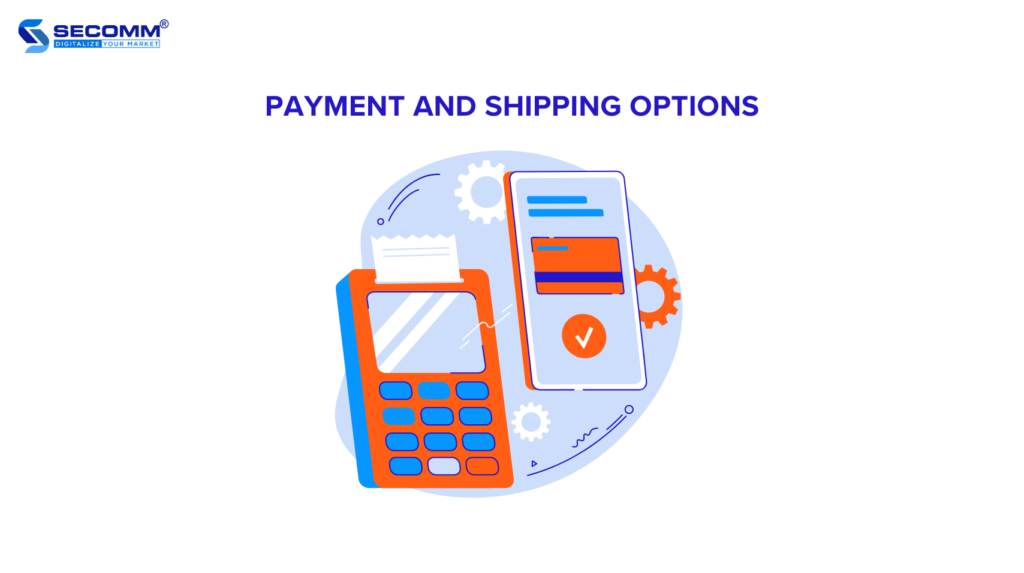
Implementing Magento B2B allows you to offer more payment methods to customers, from online payments through electronic payment gateways to cash on delivery (COD).
Additionally, you can integrate various payment gateways through Magento, such as PayPal, Stripe, Authorize.Net, and many more. This ensures security and convenience in the payment process for both businesses and customers.
Reason 5: Segmentation
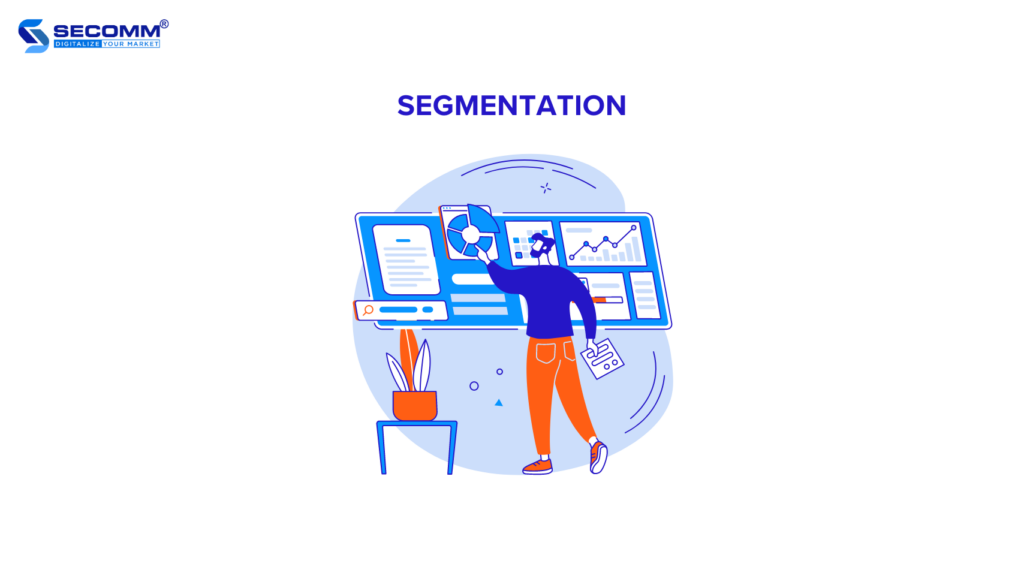
Magento B2B provides features and tools to implement customer segmentation strategies effectively. Among these, the most notable is the Advanced Reporting feature, which provides a dashboard for tracking and analyzing sales data.
With this feature, businesses can segment customers and customize experiences based on web browsing behavior, purchase history, and various other criteria.
Reason 6: Custom user roles and permissions
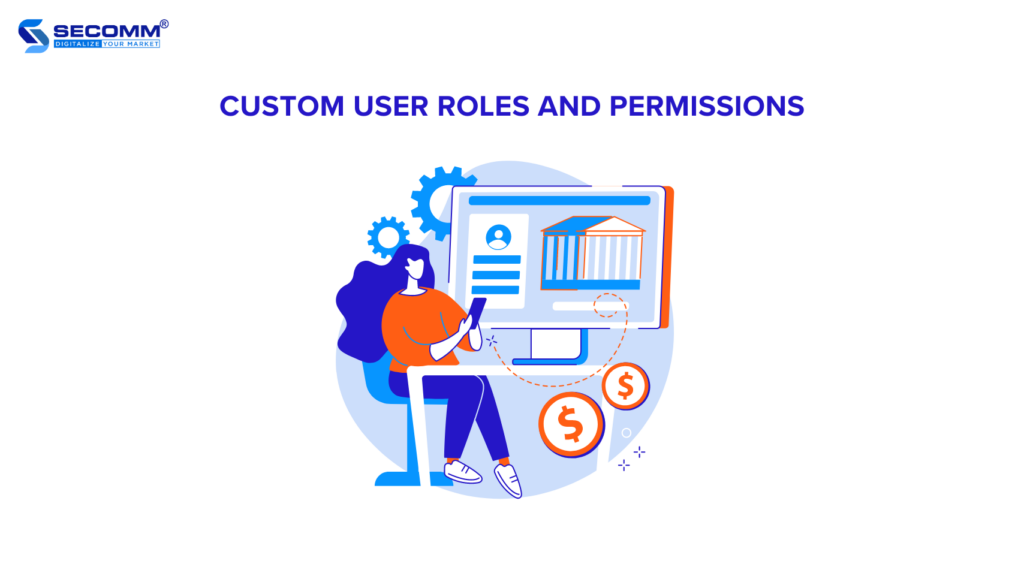
Customizing user roles and permissions is an important part of optimizing the B2B purchasing process. This feature allows B2B customers to create multiple accounts with different contact details for purchasing, ordering, quoting, negotiating, and payment. Additionally, Magento B2B allows sellers to create and assign admin accounts to manage specific customers.
Reason 7: Manage pricing through shared catalogs
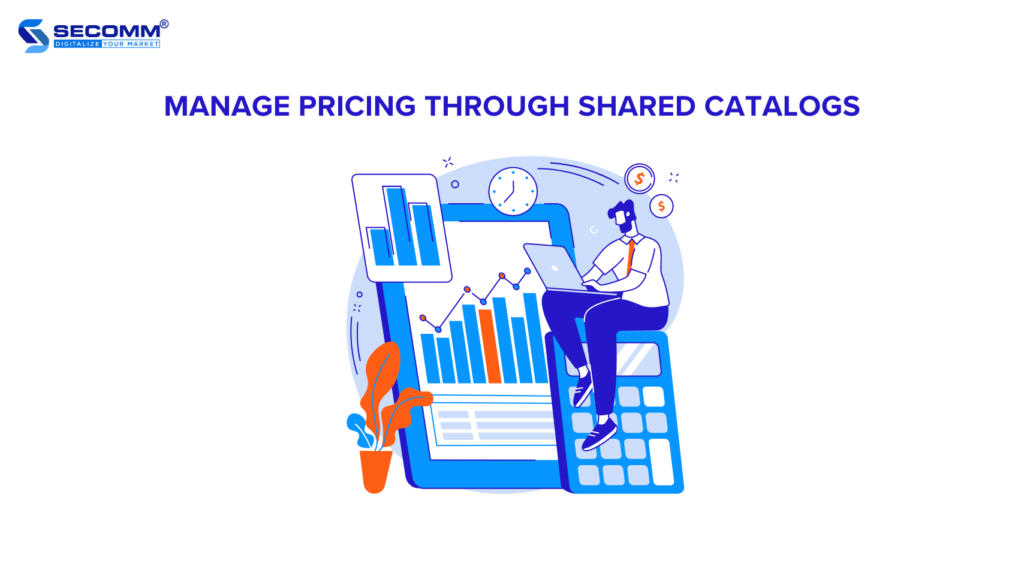
In B2B Commerce, Magento helps manage quotations through shared catalogs, which effectively provides product information and prices to B2B partners and customers. These catalogs can be created based on criteria such as product type, product group, or other suitable business needs.
Within each shared catalog, administrators can define prices and special conditions for each product or product group. This helps create customized quotations that meet the specific requirements of each customer.
Reason 8: Advanced inventory management
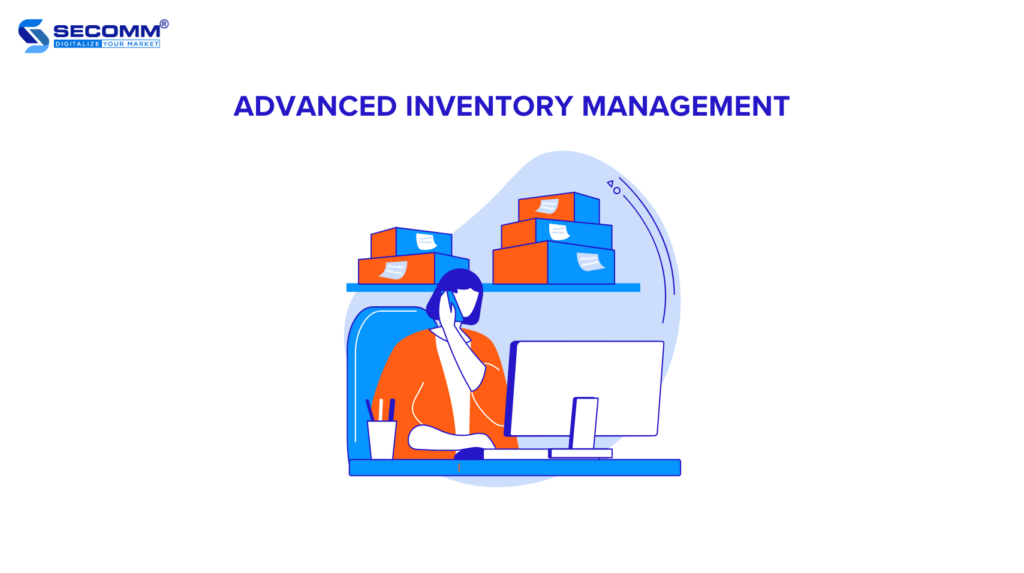
Inventory management is a challenging task for businesses implementing B2B Commerce. The eCommerce platform provides advanced features to effectively manage and control your inventory levels. These features allow administrators to track inventory quantities and forecast future inventory needs.
Additionally, Magento B2B helps manage special types of inventory such as damaged goods, special inventory items, or batch inventory.
Reason 9: Enhanced security
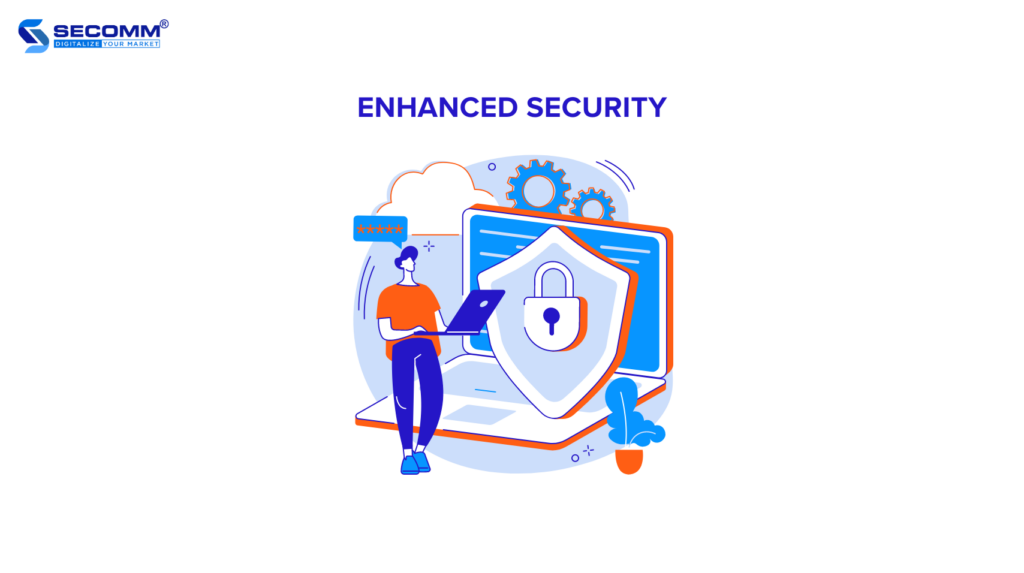
Security is an important issue when building and developing online stores in general. Magento provides many advanced features to help B2B businesses to secure their eCommerce systems. Among these, PCI Compliance, 2FA, WAF, DDoS protection, and preventing CSRF and XSS attacks are notable.
Reason 10: Technical support
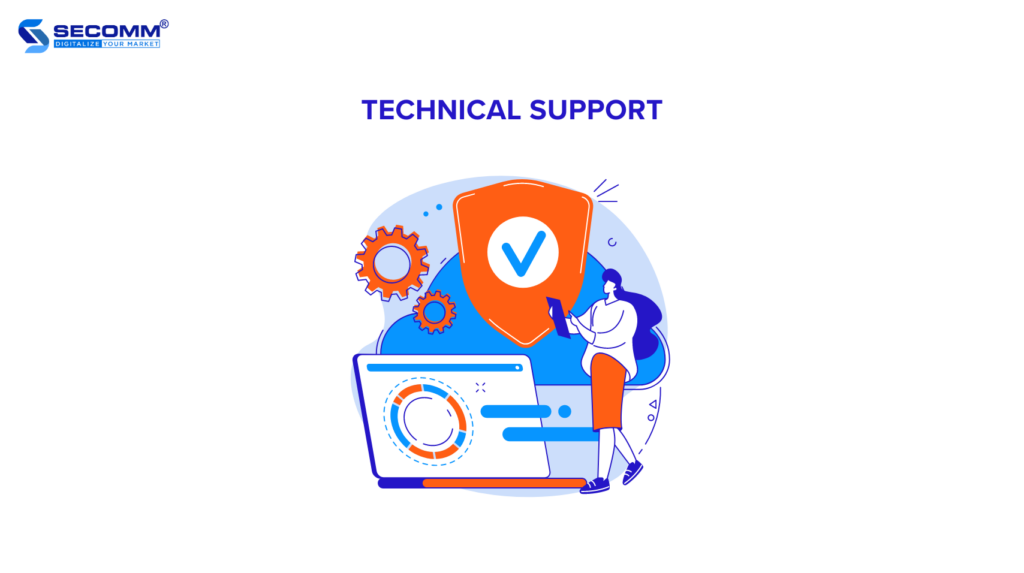
Technical support plays a crucial role in maintaining and operating an efficient online store. Magento B2B provides tools and support services to help users address technical issues and optimize the performance of their eCommerce websites.
This includes expert support via phone, email, or online. Additionally, Magento has a large and vibrant community of developers, experts, and end-users. You can search and ask questions on the forum to receive assistance from the community.
Build your first Magento B2B site today!
In the context of the increasingly developing and fiercely competitive eCommerce market, using a powerful eCommerce platform is extremely important to ensure the success. With its unique features and superior flexibility, Magento has proven to be a top choice for building and developing B2B stores.
Need more deep advice? Contact SECOMM or call (+84)28 7108 9908 now!
 2
2

 425
425

 0
0

 1
1
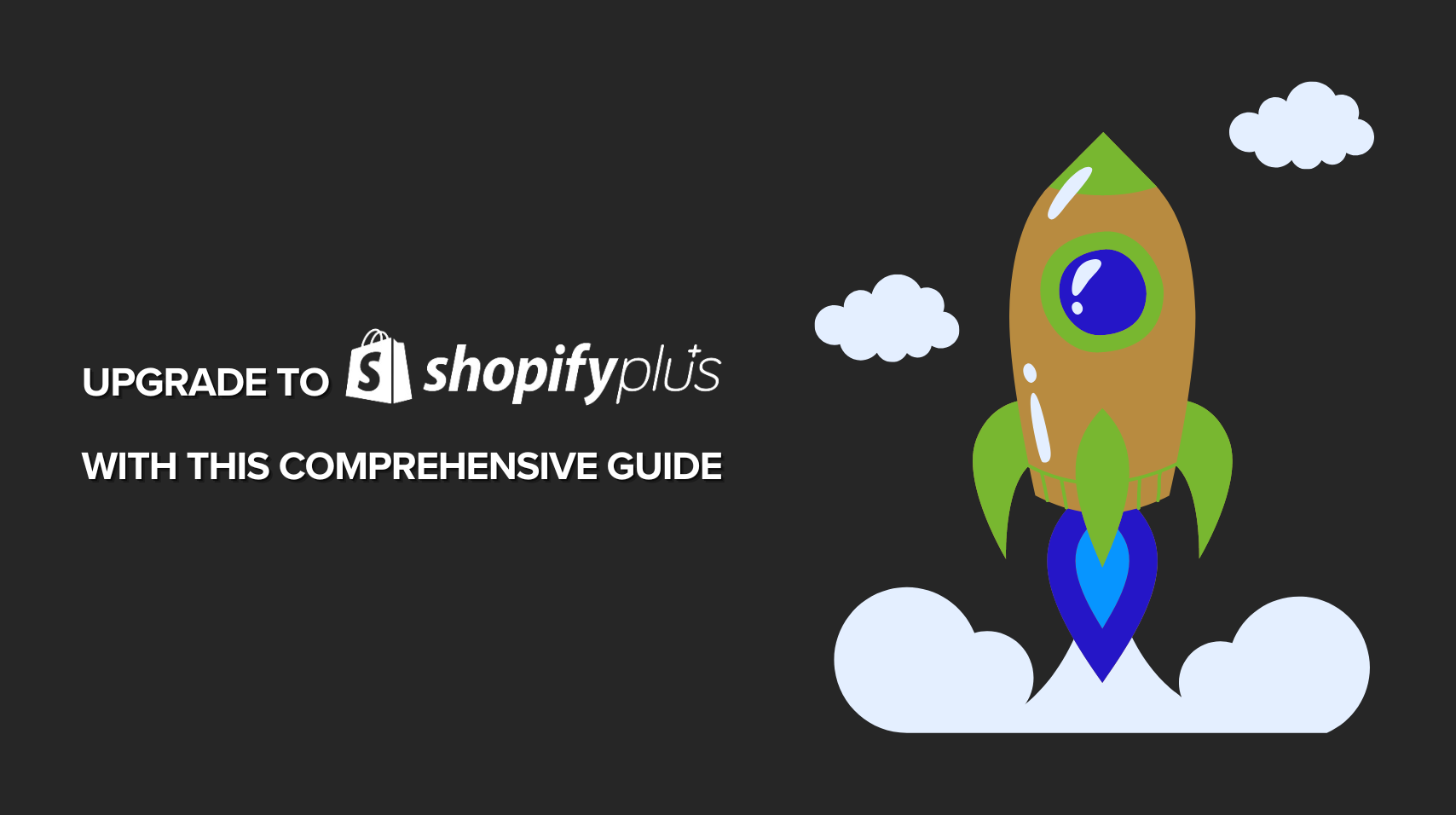
THE 6 CRUCIAL STEPS TO UPGRADE TO SHOPIFY PLUS EFFECTIVELY
Upgrading to Shopify Plus is a strategic decision for growing ecommerce enterprises. Many merchants have encountered the challenges and opportunities this upgrade brings along their journey.
From optimizing business performance to expanding operations globally, upgrading to Shopify Plus isn’t just a technical step but also an opportunity to transform ecommerce activities into a springboard for market breakthroughs.
In this article, let’s explore the steps to upgrade to Shopify Plus and some critical considerations.
What is Shopify Plus?
This is the premium version of the Shopify platform, specially designed to meet the needs of large and rapidly growing ecommerce businesses. With Shopify Plus, you can experience many powerful features and services that help optimize operations, expand scale, and enhance customer experiences.
One notable aspect of Shopify Plus is its flexibility and ease of customization. You can leverage features such as multi-store management, integration with ERP and CRM systems, creating multilingual and multi-channel websites, as well as adjusting interfaces and features according to your specific needs.
In particular, Shopify Plus provides a secure and easily scalable infrastructure that is capable of handling large volumes of traffic and online transactions robustly. With Plus, you can ensure that your website operates smoothly and seamlessly, even during peak shopping seasons.
Why upgrade to the Shopify Plus plan?
Upgrading from the standard versions of the Shopify platform to the Plus version is a significant milestone in the transformation of ecommerce businesses. Below are eight benefits and also eight main reasons driving businesses to undergo the transition:
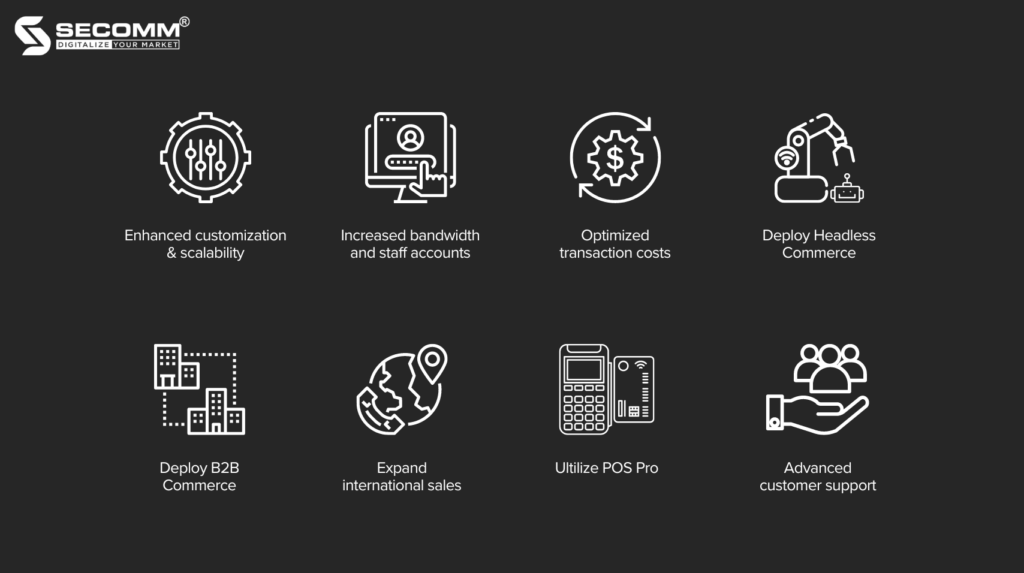
Enhanced customization & scalability
Shopify Plus offers a range of powerful features and tools to customize and expand ecommerce websites flexibly and efficiently. These include customizing checkout pages, personalizing customer experiences, and customizing product displays.
Additionally, you can utilize some exclusive solutions, such as LaunchPad, Shopify Scripts, and Shopify Functions, to customize shopping experiences and automate sales processes.
Increased bandwidth and staff accounts
High traffic volumes will require a large amount of bandwidth to maintain a stable website. Shopify Plus allows you to access unlimited bandwidth, 200TB of storage, and unlimited staff accounts to handle large transaction volumes efficiently.
Optimized transaction costs
Upgrading to Shopify Plus can help optimize transaction costs. If you use Shopify Payments, transaction fees are the lowest in all Shopify pricing plans but will be customized based on geographical regions. Conversely, Plus merchants must pay 0.2% per transaction for security and compliance costs.
Deploy Headless Commerce
In the Plus version, you’ll be provided with tools and solutions to build a Headless ecommerce website. Through the Hydrogen + Oxygen solution, you can leverage the power of Headless architecture to create more customized and flexible customer experiences.
Deploy B2B Commerce
Shopify Plus provides features and tools to expand your B2B operations. The recent Shopify Editions Winter ’24 update introduced new features to optimize B2B Commerce activities.
From Headless B2B and advanced order management to integrated payment systems and unique features for B2B customers, Shopify Plus helps you streamline your operations and enhance customer relationships.
Expand international sales
With Shopify Plus’s multilingual and multi-channel capabilities, you can efficiently expand your operations to international markets. Shopify Plus provides tools and features to customize websites according to each market’s needs, from handling currencies to managing orders and shipping.
Ultilize POS Pro
The Plus merchants can utilize the exclusive POS Pro system for free. With advanced features, POS Pro allows seamless integration of multi-channel sales operations into the website, enables unlimited staff account access, and provides professional retail reports. This helps enhance customers’ shopping experience and optimize your offline and online sales activities.
Advanced customer support
When upgrading, you can expect more in-depth customer support services, especially in terms of consultation and technical support by a team of experts. Through hotlines, emails, and live chat, you can access the 24/7 support team.
Additionally, to help clients better understand this platform, Shopify offers a free learning program called Shopify Plus Academy. There, you can access detailed tutorials on setting up stores, customizing store interfaces, and much more.
When to upgrade to the Shopify Plus plan?
You currently on one of Shopify’s standard pricing plans may consider upgrading to Shopify Plus under the following circumstances:
- Monthly revenue exceeds $800,000 with over 100 transactions per minute. In such cases, a more robust system is needed to handle high traffic volumes without compromising user experience, and to effectively manage and optimize business performance.
- Expanding sales to international markets requires flexibility in managing multilingual, multi-currency, and region-specific inventory.
- Desire to harness the advantages of Headless Commerce architecture to enhance user experience and achieve deeper customization of user interface and technical infrastructure.
What to prepare before upgrading to Shopify Plus?
Before deciding to upgrade to Shopify Plus, there are four important steps that businesses need to take to ensure a smooth and effective upgrade process:
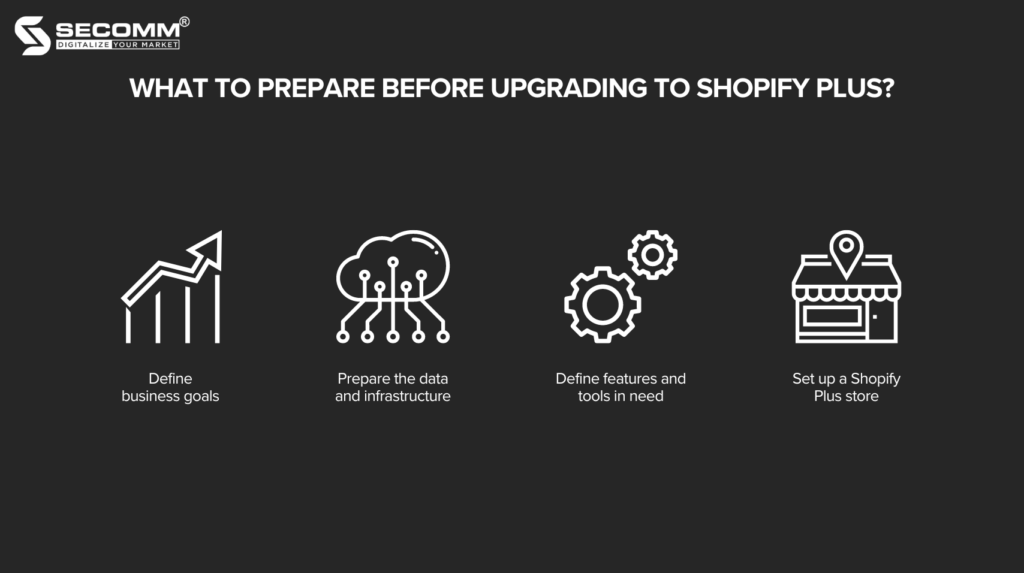
Define business goals
Firstly, you have to clarify your needs and wants. This includes evaluating the current and future growth of the business, as well as the necessary features to meet specific needs.
Prepare the data and Infrastructure
Next, you’ll need to prepare data and technical infrastructure for the transition process. This may involve backing up current data, checking the compatibility of current applications and features, as well as ensuring that the technical infrastructure is robust enough to satisfy your requirements.
Define features and tools in need
Finally, you’ll identify the specific features and services you desire from Plus. This may include considering features such as multi-store management, integration with ERP and CRM systems, multi-language and multi-currency support, as well as special features like deploying Headless Commerce and accessing POS Pro systems.
Set up a Shopify Plus store
Setting up a Plus store will differ from deploying previous standard pricing plans. Plus usage fees start from $2,300 per month, and this price isn’t fixed but customized based on each case’s specific needs. Therefore, you’ll need to contact the Shopify Plus team for advice. When collaborating with a Shopify Plus agency, the developer will work with the platform to provide a specific pricing quote.
The six-step process to upgrade to Shopify Plus
Below are six specific steps for the entire process of upgrading your ecommerce website system from a lower version to Shopify Plus:
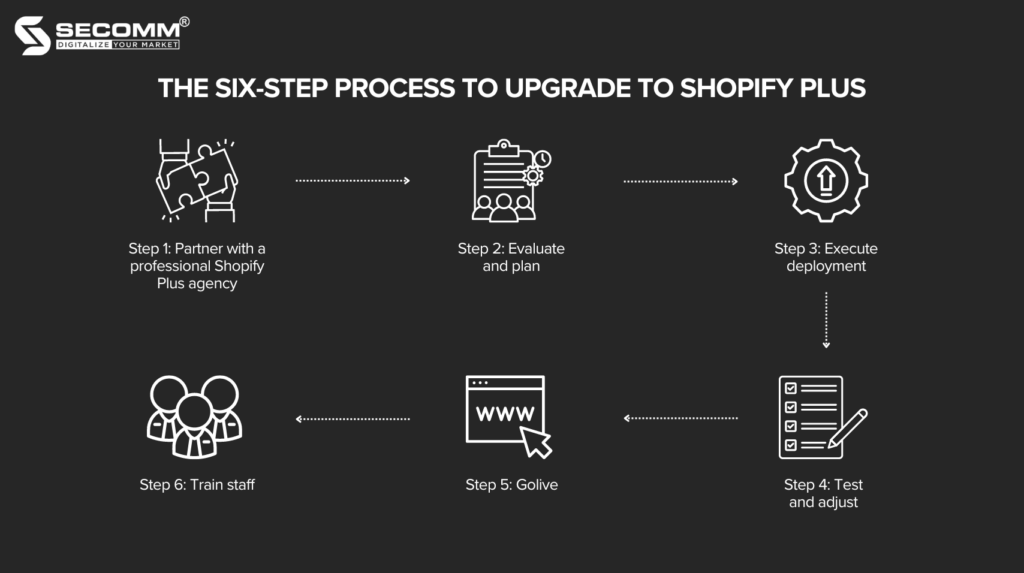
Step 1: Partner with a professional Shopify Plus agency
The first and most important step is collaborating with experienced teams specialising in Shopify Plus to optimize the upgrade process and post-operation, especially concerning costs.
To select a suitable Shopify Plus development partner, you should consider previous Shopify Plus projects they have completed, how they identify and solve problems in each project, and feedback from previous clients regarding those projects.
Step 2: Evaluate and plan
The next step is equally important as it determines the effectiveness of the conversion and future operations. You and your development partners need to clarify business goals, identify necessary features and data to be transferred, and develop a specific deployment schedule based on these goals.
You’ll also need to ensure data backup and updates are safely conducted to avoid data loss during the conversion process.
Step 3: Execute deployment
After assessment and planning, proceed with upgrading to Shopify Plus. The development partner will set up and configure new features, migrate data from the old platform to the new one, and test compatibility to ensure the website operates smoothly.
Step 4: Test and adjust
After deployment, test and adjust the Shopify Plus website to ensure all features and functions work correctly. The development partner’s QA/QC team will collaborate with you to check the quality of the website experience as actual end-users and correct any issues that arise.
Step 5: Golive
Once testing is complete, the new ecommerce website will be launched into the market, and promotional campaigns will be deployed to attract initial traffic and orders.
Step 6: Train staff
Finally, employees should be trained to use and manage the new website on the Shopify Plus platform. You’ll provide detailed instructions on new features and how to use them to optimize the performance. Additionally, since Plus has unlimited staff accounts, personnel allocation should be reasonable and planned accordingly.
The Final Words
While upgrading to Shopify Plus can be complex, it significantly benefits business growth. From high flexibility and customization to scalability and deep customer service, Shopify Plus is the perfect choice for expansion.
Various insights and a systematic 6-step deployment process make the upgrade process more manageable. However, to increase efficiency and maintain the stability of the new website, businesses need a professional development partner to accompany them.
Contact SECOMM or call us at (+84)28 7108 9908 to plan your deployment today!
 2
2

 597
597

 0
0

 1
1
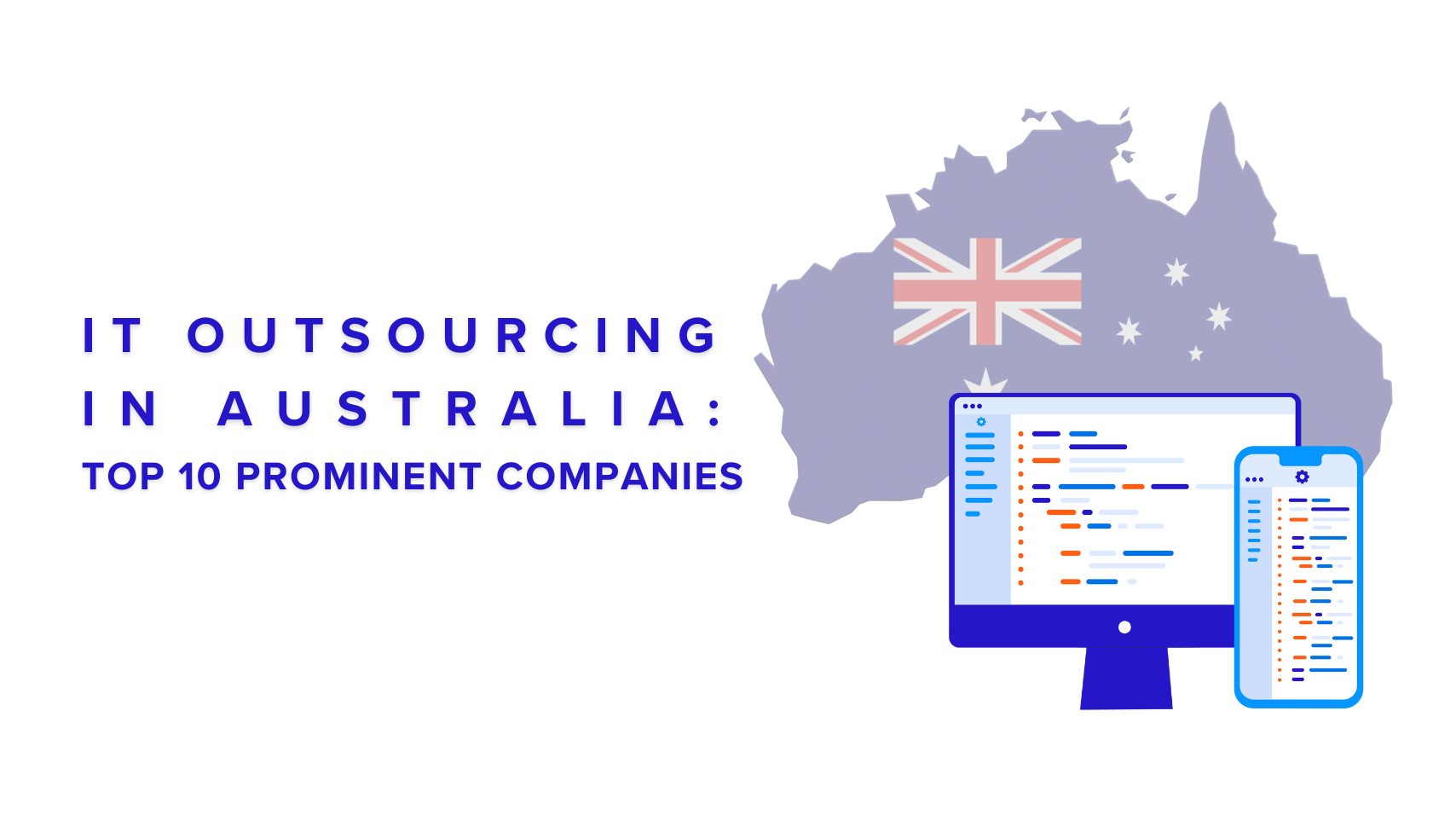
IT OUTSOURCING IN AUSTRALIA: TOP 10 COMPANIES
IT outsourcing in Australia is emerging as one of the most rapidly growing and attractive fields in the information technology market. As technology projects become increasingly complex and diverse, Australian businesses are increasingly serious about finding highly skilled outsourcing partners to address technical challenges and product development.
In this article, let’s explore the top 10 IT outsourcing firms in Australia, what makes them stand out in this field, and the key criteria for selecting a potential partner.
The growth of the Australian IT outsourcing industry
In recent years, the Australian IT outsourcing sector has undergone remarkable development, reflecting the boom of the information technology field in the country’s economy.
According to Statista, the projected market revenue for IT outsourcing in Australia in 2024 is expected to reach $14.49 billion, with a CAGR of 10.99% from 2024 to 2028. This indicates substantial prospects and expansion potential.
One crucial factor driving this growth is the emphasis on quality and efficiency. Australian IT outsourcing firms have heavily invested in workforce development and infrastructure to ensure they can deliver high-performance services and meet their clients’ increasingly complex technical requirements.
Furthermore, technological innovation has significantly contributed to this impressive growth. Adopting new technologies such as artificial intelligence, machine learning, and blockchain has opened up numerous opportunities for IT outsourcing firms to provide breakthrough and effective solutions for their clients.
4 Criteria to choose the right Australian IT outsourcing firms
When deciding on a partner to use IT outsourcing services in Australia, you must consider various criteria to ensure the partner can provide services that meet their needs. Below are four key criteria for choosing the right Australian IT service provider.
Professional and expertise
You need to ensure that the Australian IT company has experience and expertise in the field they are interested in. For example, shopping applications can be developed on the iOS operating system using the Kotlin language. The experience and deep knowledge of the IT outsourcing firms in a specific technology and industry will determine whether they are a potential partner.
Service quality
This is the next important factor to consider. You need to check whether the IT outsourcing firm has high-quality standards and whether they have good experience in providing solutions and services to similar clients. Reviewing portfolios and engaging in direct consultations will help businesses evaluate more easily.
Client testimonials and feedback
Social Proof is quite useful in this case. Before making a final decision, you can check reviews, feedback, and gather opinions from customers.
Pricing and efficient
Finally, you need to consider the issue of pricing that the IT outsourcing firm offers, as well as the overall project costs for collaboration. Ensure that the price they offer is suitable for the business budget and that they can provide optimal solutions to meet the project’s requirements.
Top 10 IT outsourcing firms in Australia
The companies listed below are all top names in the IT outsourcing field, with extensive experience and knowledge. They provide the highest-quality services and solutions to meet customers’ diverse needs in complex business environments.
SECOMM
Over the past ten years, SECOMM has become a leading provider of eCommerce solutions in Vietnam for its clients’ general and specific information technology projects. SECOMM is committed to providing clients with a team of skilled professionals capable of quickly adapting to the technological advancements of the era.
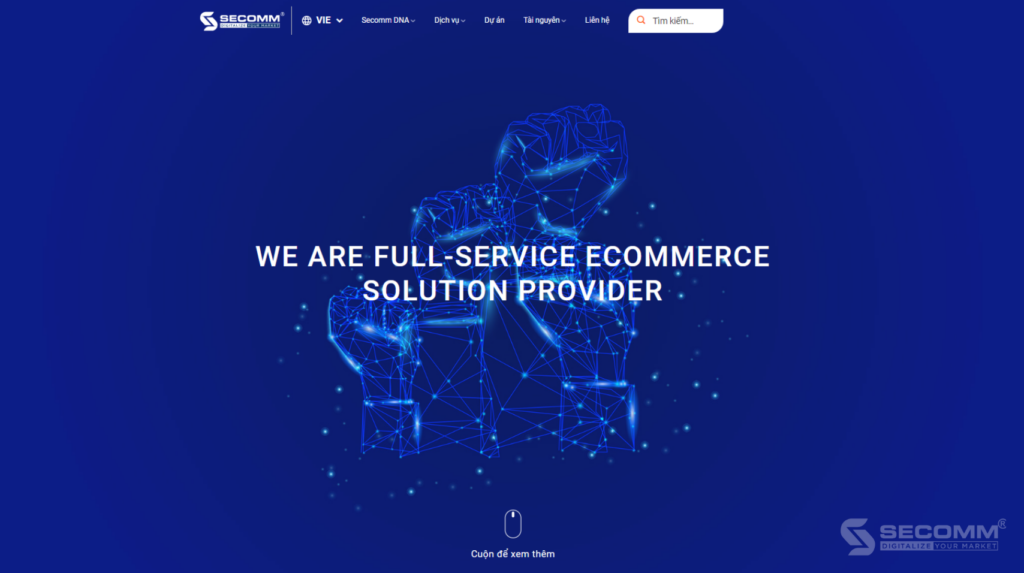
Seasia Infotech
Seasia Infotech is a leading software development company in Australia. It provides custom software solutions and mobile application development. The company also offers IT outsourcing services, including developing a dedicated IT team for a specific project.
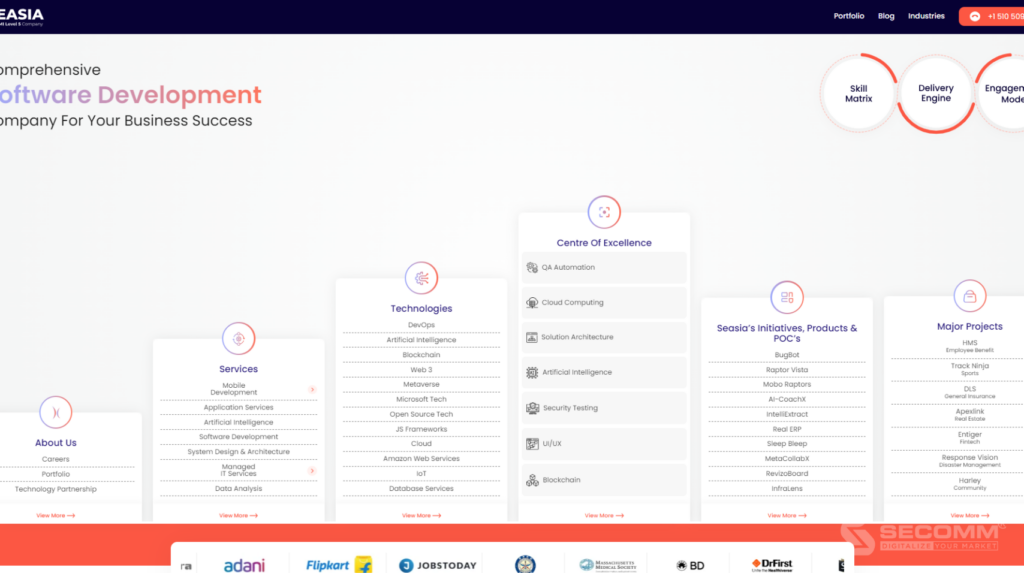
OpenXcell
OpenXcell is one of the leading companies in the field of mobile application and software development in Australia. Its personnel and IT team are professional and outstanding. OpenXcell also ensures experience, skills, and knowledge to meet the specific requirements of the project.
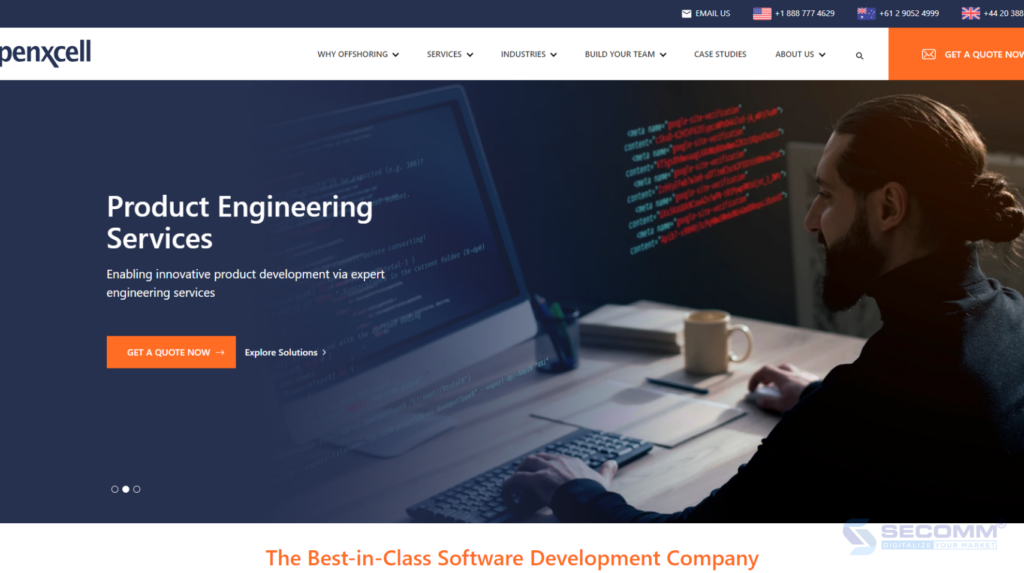
Offshore Business Processing
Offshore Business Processing specialises in IT outsourcing services, including data processing, digitalization, and human resource management. Over the years in the market, the company has become a reliable partner of many leading businesses in Australia
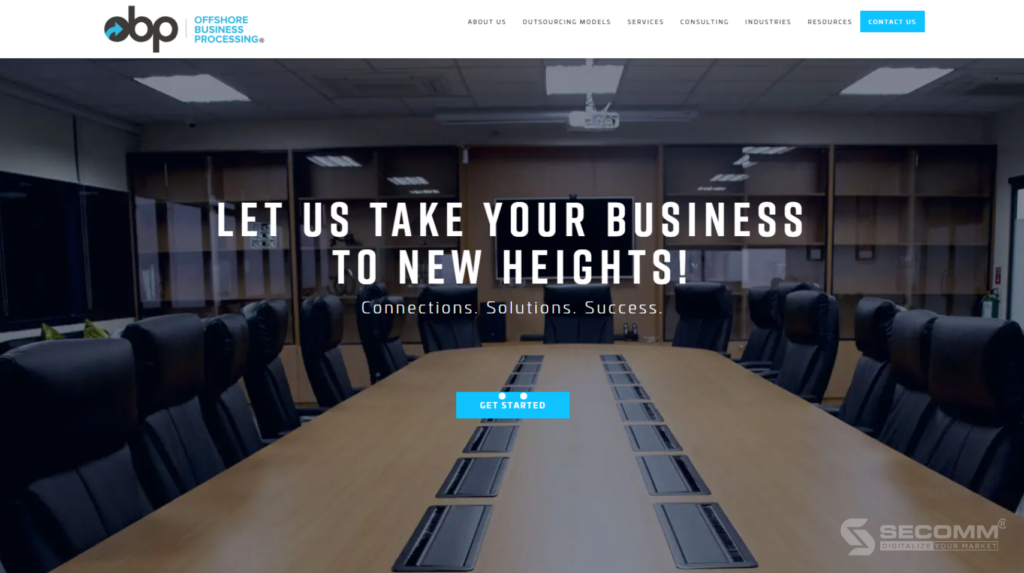
KMS Solutions
KMS Solutions is a well-known name in the Australian IT outsourcing industry. This company offers various information technology services, from software development to IT infrastructure management.
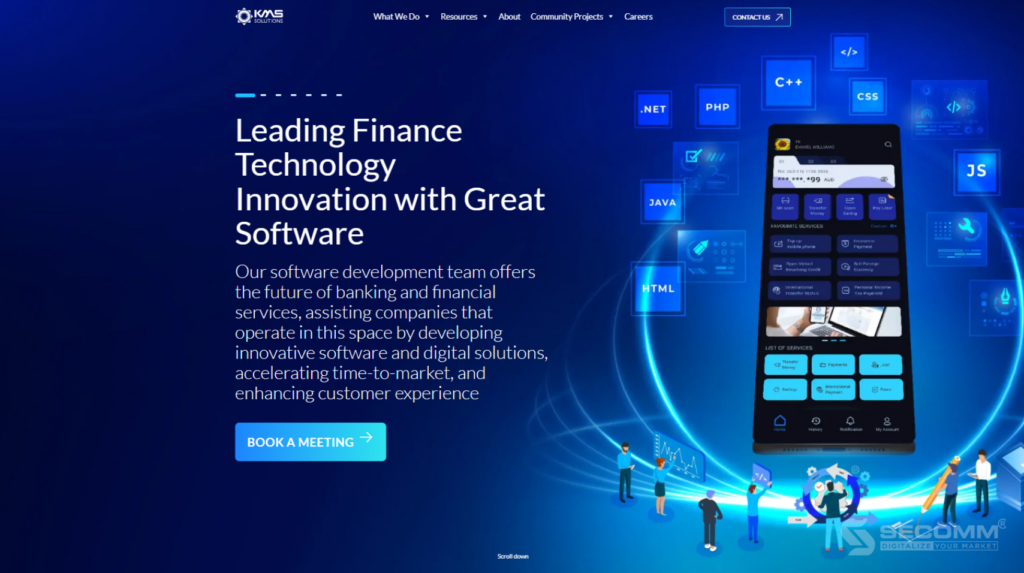
Ontik Technology
Ontik Technology is a pioneering company providing information technology solutions and custom software for Australian businesses. As IT outsourcing is becoming increasingly popular in Australia and Asian countries, Ontik Technology expands its services with a high-quality team of professionals.
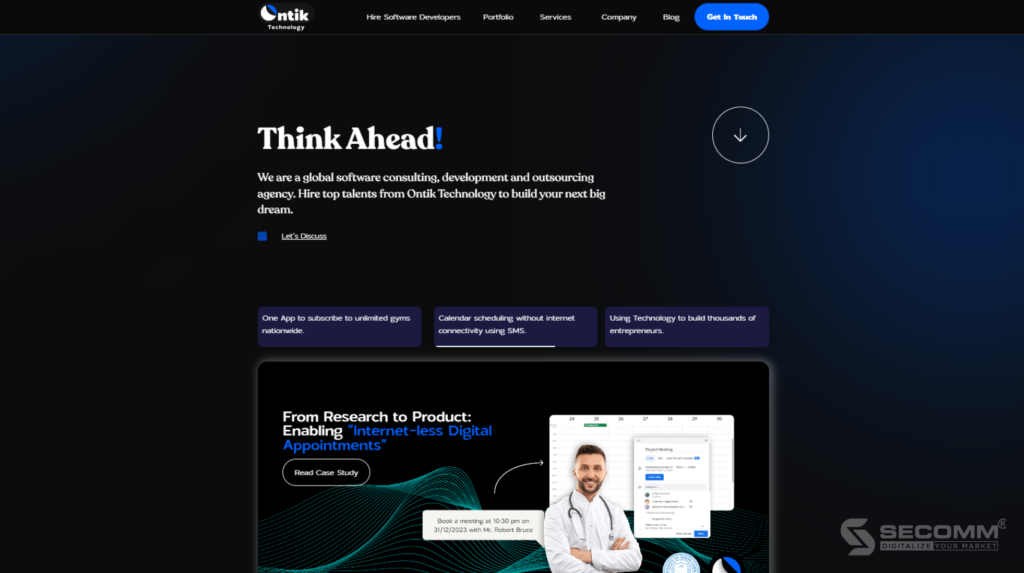
AIS Technolabs
In addition to providing professional IT outsourcing teams, AIS Technolabs also offers Australian businesses custom software solutions, mobile applications, and web development services.
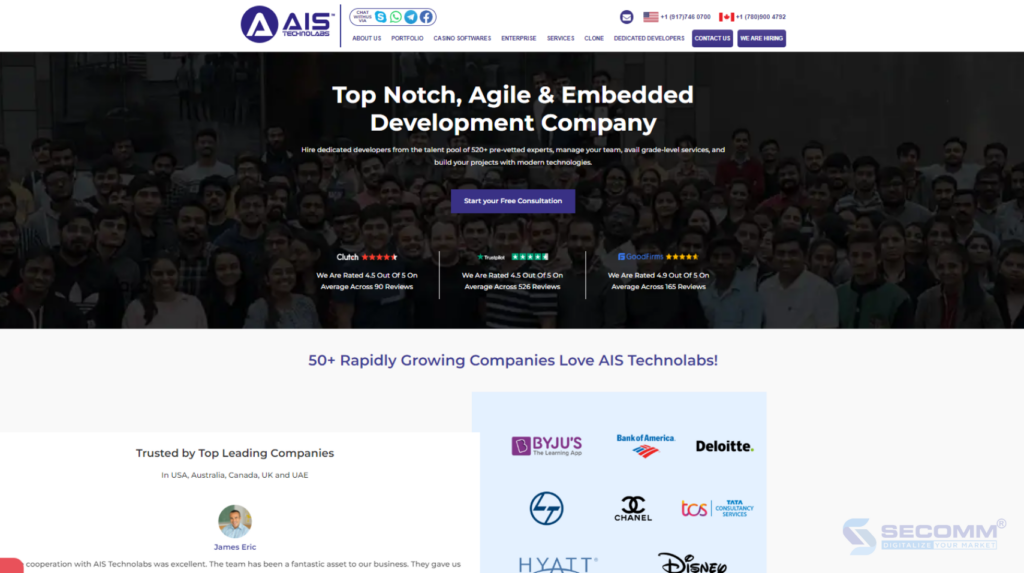
pwrteams
pwrteams possesses a highly skilled IT team in various aspects such as app development, software, website building, SaaS application deployment, QA, and Testing. With reasonable pricing, pwrteams has assisted Australian businesses with over 200 professional IT teams for many years.
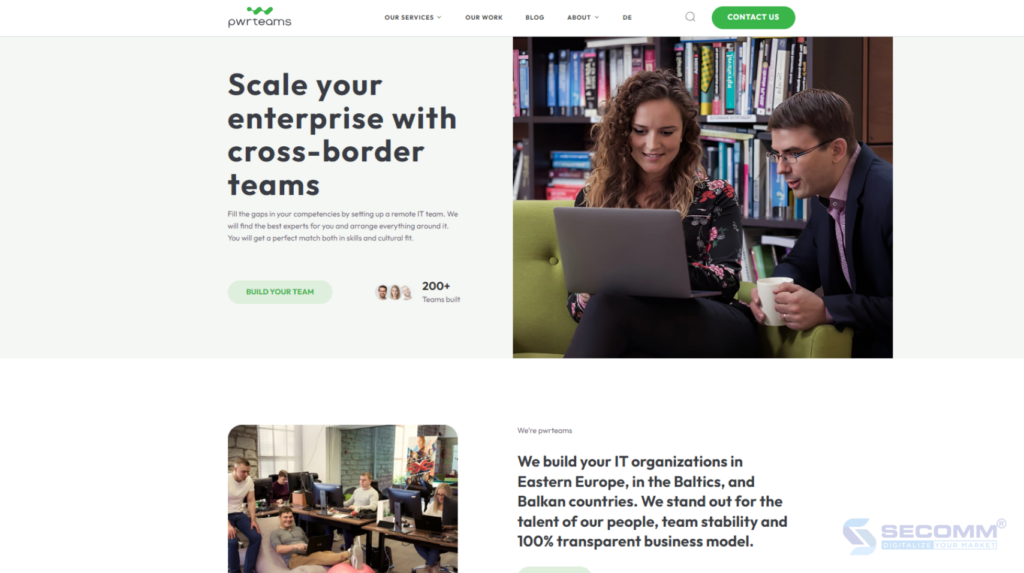
Intogreat Solutions
Intogreat Solutions is a renowned provider of IT consulting services and software outsourcing in Australia. Additionally, you can seek professional IT outsourcing solutions at Intogreat Solutions.
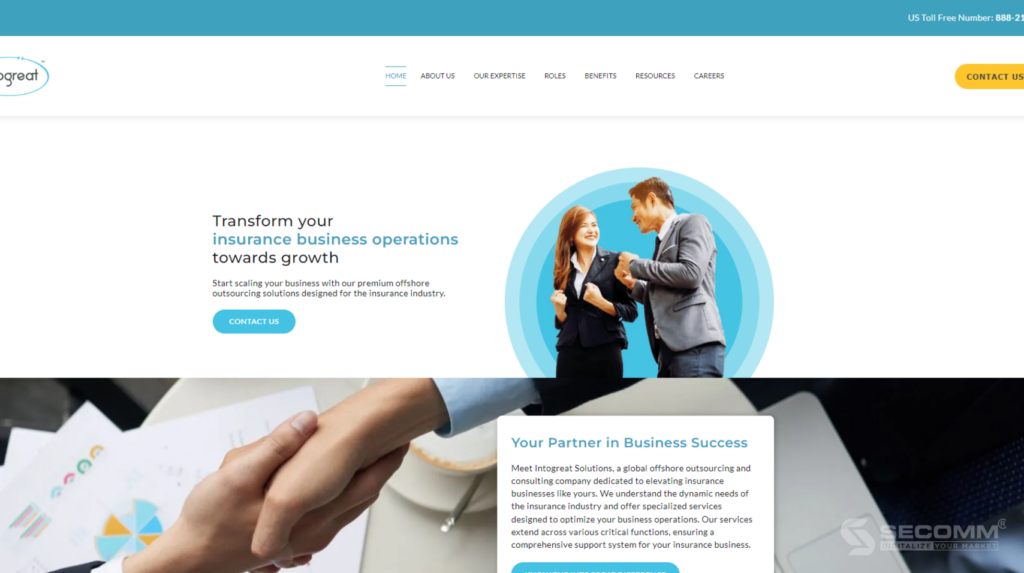
All IT Services
Similar to its brand name, this company provides outsourcing services for all IT-related services. All IT Services has offered reasonable and customized pricing based on the project scale and specific needs of businesses.
The Final Words
In an increasingly competitive and evolving information technology market like Australia, choosing the right IT outsourcing partner is key to achieving success and sustainable development for businesses. The above list has provided a diverse set of reputable and reliable partners, from software development companies to security services and IT infrastructure management providers.
Need advice or help building a professional IT team? Contact SECOM or call (+84)28 7108 9908 now!
 3
3

 621
621

 0
0

 3
3
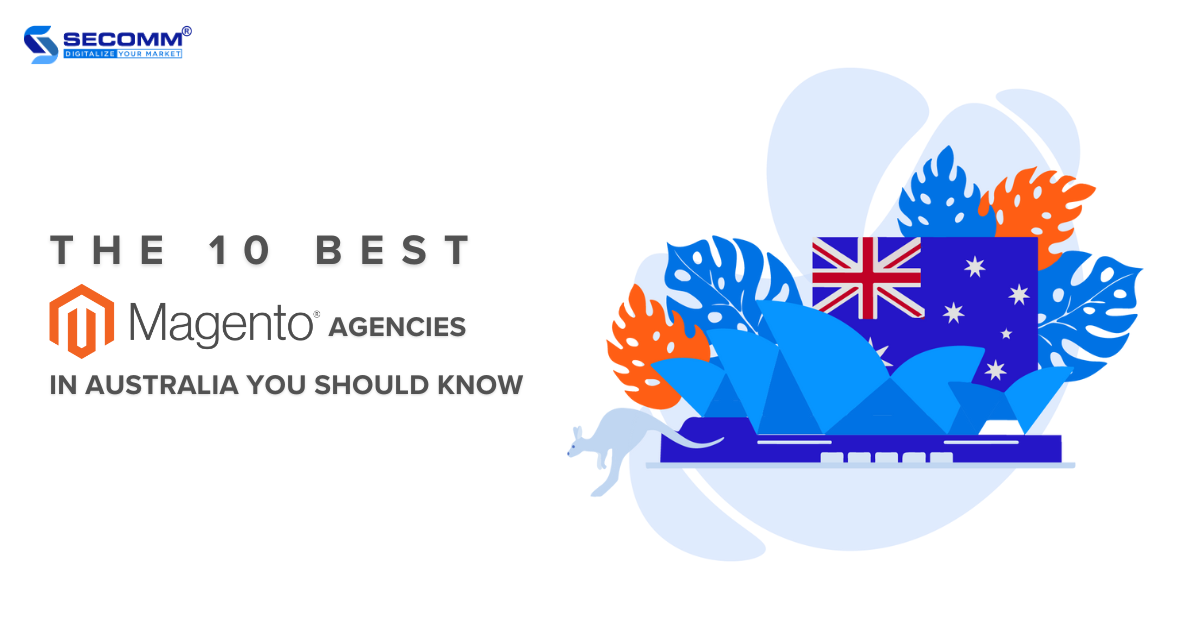
THE 10 BEST MAGENTO AGENCIES IN AUSTRALIA YOU SHOULD KNOW
In recent years, the emergence of many Magento agencies has helped the Australian eCommerce market grow. These developers are experienced and trustworthy, not only Magento experts but also reliable companions, ensuring their clients succeed online.
In this article, let’s explore the top 10 Magento agencies in Australia, helping you find the right partner for your project.
Read more: Top 10 Magento eCommerce websites in Australia
What is Magento?
Magento (now owned by Adobe Commerce) is an open-source system for building customized eCommerce websites. It is highly flexible and offers a range of powerful features to make website building and management more efficient.
From creating attractive and user-friendly interfaces to managing products, orders, and customers, Magento provides a comprehensive infrastructure to optimize the online shopping experience.
Why partner with Magento agencies?
Partnering with Magento agencies can be beneficial in implementing your eCommerce project. Here are four essential reasons to consider working with a partner specialized in the Magento platform.
Professional Expertise
Magento agencies typically have teams of experts who deeply understand this platform. Most of these companies will participate in the Adobe Commerce Partners program, where the platform supports them regarding technical support, learning resources, commission earnings, and branding.
Furthermore, these agencies must demonstrate that they meet the standards to become official Magento partners. Therefore, partnering with them will help you launch your eCommerce websites quickly and optimize business performance by leveraging features and integrations.
Optimized performance
Optimizing the performance of Magento websites is crucial to ensuring customers’ best shopping experience and increasing conversion rates. Professional Magento agencies can optimize the source code, improve page loading speed, and optimize checkout pages, helping businesses effectively attract and retain customers.
Optimized time and costs
Partnering with a Magento development company can help save time and costs compared to building and managing an eCommerce website independently. This is especially true if you have limited time and must go live with your eCommerce website as soon as possible.
Working with such developers becomes even more worth considering. These agencies already have the tools, processes, and experience to deploy projects efficiently and quickly.
Integration and scalability
Magento’s open-source nature allows developers to help you integrate third-party applications and extend website functionality based on specific needs. Additionally, they can provide custom solutions and development extensions, ensuring your eCommerce operations continually evolve and meet market demands.
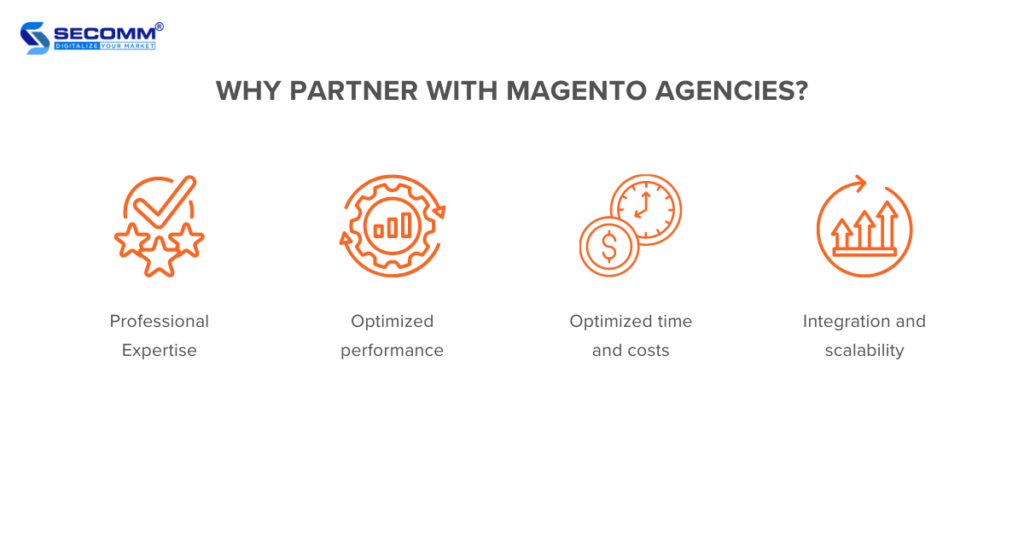
5 Criteria for choosing the right Magento agency
When collaborating with a Magento agency, choosing the right partner is crucial to ensure the success of the eCommerce project. Below are five core criteria to help you choose the right partner.
Magento Expertise
Any Magento agency must deploy eCommerce projects based on Magento, an open-source platform with superior customization and scalability. You must ensure the chosen developer has the knowledge and skills to deploy the Magento platform. They must also have a team of capable experts to build, customize, and optimize eCommerce websites based on specific requirements.
Insight into the Australian eCommerce market
It isn’t easy to effectively leverage Magento’s customization and scalability to build an eCommerce website with shopping experiences tailored to Australians’ needs.
This requires technical skills, expertise in the Magento platform, and a deep understanding of the Australian eCommerce market. Therefore, the agency needs to understand the target audience, shopping behaviours, legal regulations, and other factors related to the unique business culture in this country.
Magento project portfolio
Evaluating the projects previously implemented by Magento agencies is an effective way to measure their capabilities and experience. By examining past projects, you can assess their ability to solve specific challenges and whether the solutions proposed for each case are flexible and up-to-date with market development trends.
Client testimonials and feedback
Evaluating and considering feedback from previous clients will benefit you in the decision-making process. You can search and verify reviews from various sources and clients to ensure objectivity and transparency. This is necessary to ensure that Magento agencies have the skills and experience required to complete the eCommerce project as requested.
Post-Deployment Support and Maintenance
After completing and launching the Magento website, technical issues must be addressed and supported. You must choose Magento agencies committed to providing quick support and continuous maintenance after the project. This ensures that the website remains stable, any technical errors are promptly addressed, and the latest platform version is kept secure and up-to-date.
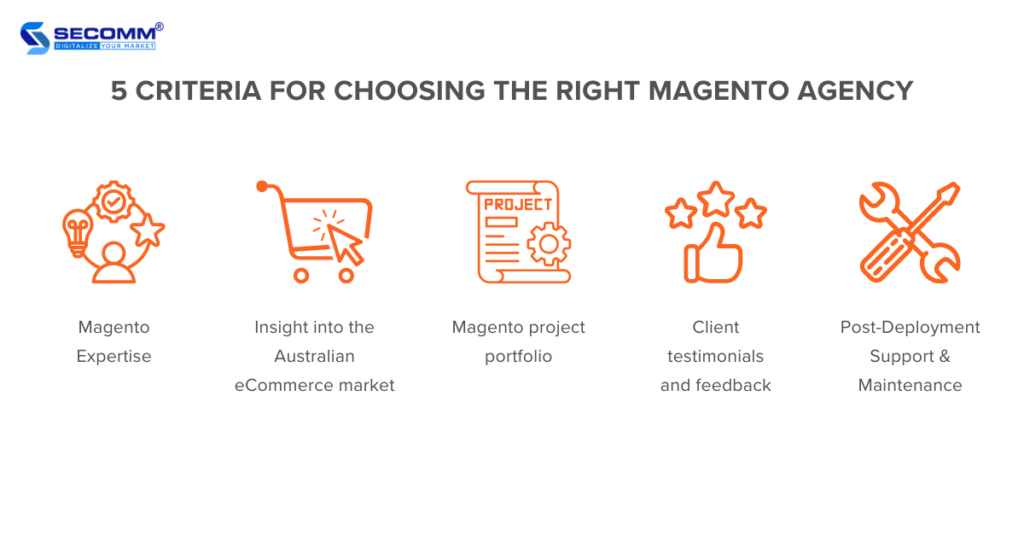
Top 10 Magento agencies in Australia
Below is a list of the top 10 Magento agencies in Australia, recognized for their experience and expertise in developing eCommerce websites on the Magento platform.
SECOMM
SECOMM is one of the leading Magento development partners in Australia. With over 10 years of experience, SECOMM boasts a highly experienced team with a deep understanding of the Australian eCommerce market.
The SECOMM team has successfully collaborated on and implemented a series of Magento projects with significant clients in Kangaroo, such as Laybyland, Trentham Estate, The Rod Shop, and Seconds Deals.
Leveraging Magento’s strengths, SECOMM helps its clients customize and expand various functionalities according to their specific needs and integrate with third-party tools and applications to optimize operations and deliver a unique customer experience.
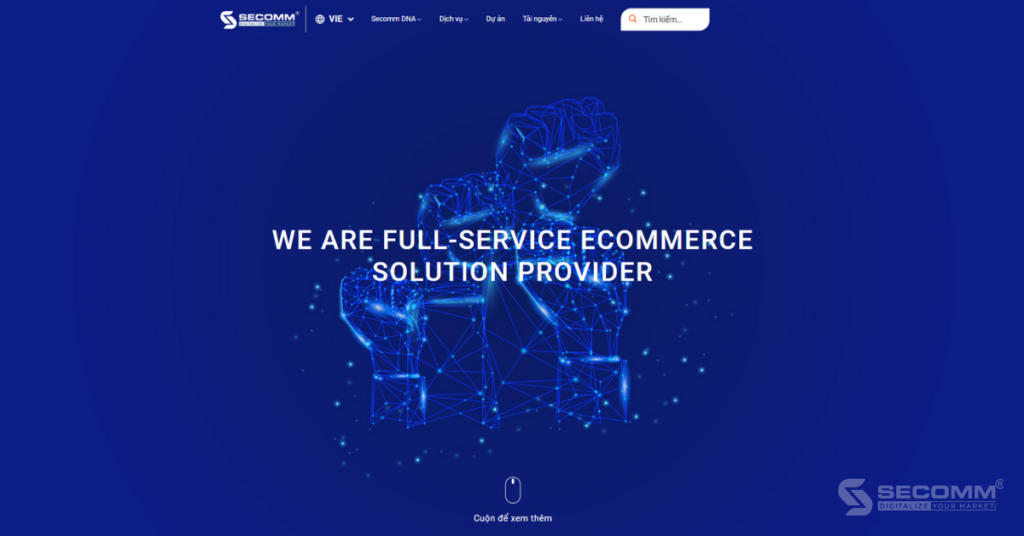
WEBDESK SOLUTION
This company is renowned for its diverse eCommerce services, including solutions for building online stores on the Magento platform. WEBDESK SOLUTION is committed to providing professional technical support services during and after deployment.
Wiser Brand
Wiser Brand specializes in building and developing eCommerce websites targeting enterprises in Australia and New Zealand. The company holds prestigious certifications related to Magento and boasts a large team of experts with extensive experience.
Aron Web Solutions
Aron Web Solutions develops and expands rapidly into significant markets such as the UK, US, and India. Aron offers a variety of eCommerce solutions related to Magento, including Magento website design and development for mobile shopping applications.
Webential
Over the years, Webential has officially become one of the leading Magento agencies in Australia. In addition to Magento, Webential offers various flexible solutions, ensuring that all projects are implemented efficiently and professionally.
Magneto IT Solutions
Magneto IT Solutions is a Magento agency with diverse experience across industries. They provide custom and professional solutions to meet the specific requirements.
Acidgreen
In Australia, Acid Green is a leading eCommerce website developer in Magento and Shopify Plus. The team’s experience and expertise in open-source and SaaS platforms are sufficient to help the company maintain its position in the market.
Intuji
Intuji provides eCommerce solutions for retail and B2B brands in Australia. Intuji’s strength lies in Magento and in leveraging various platforms and technologies to build custom eCommerce websites tailored to each business model.
Enterprise Monkey
This company provides services for eCommerce businesses in Australia, ranging from building online stores to mobile shopping applications. With its extensive experience, Enterprise Monkey can help develop customized shopping experiences using AR/VR and AI technologies.
Aussie Website
Aussie Website has established its position as a reputable Magento agency in Melbourne and Australia in general. They are committed to providing flexible and innovative solutions to help you optimize your eCommerce operations.
The Final Words
The emergence of numerous Magento developers in Australia has opened up opportunities for businesses to build and develop eCommerce brand websites. By selecting partners based on certain evaluation criteria, you can ensure that projects are implemented more smoothly, professionally, and effectively.
Need more advice to make a decision? Contact SECOMM or call (+84)28 7108 9908 for a free consultation!
 5
5

 728
728

 0
0

 2
2
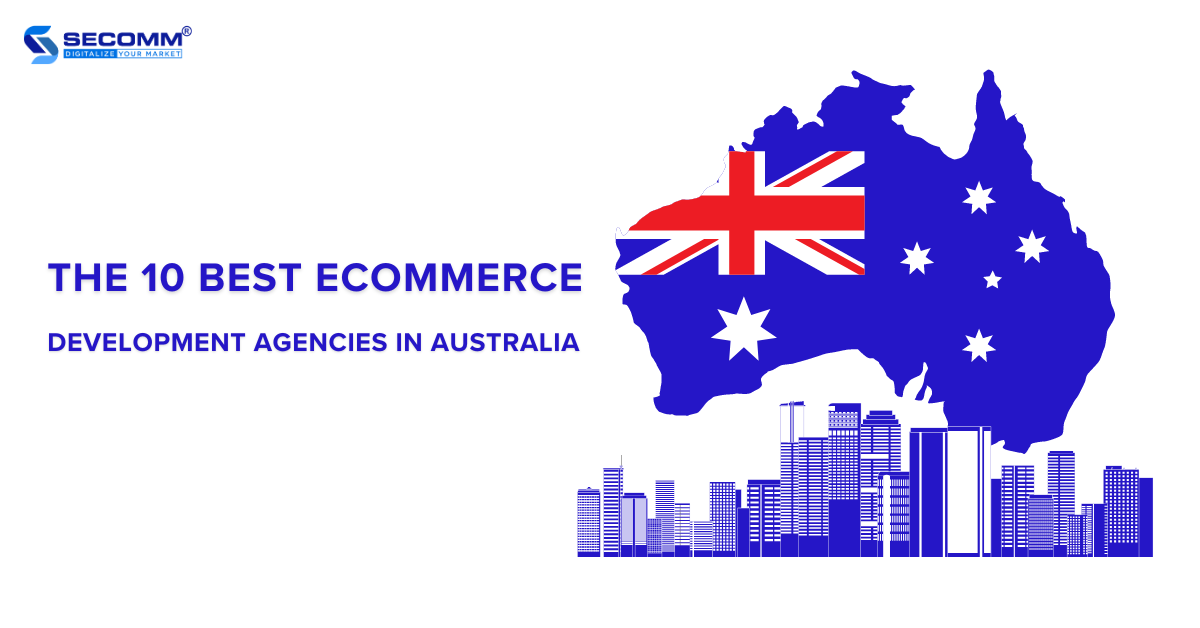
THE 10 BEST ECOMMERCE DEVELOPMENT AGENCIES IN AUSTRALIA
The Australian eCommerce market is vibrant and promising, and partnering with reliable eCommerce development agencies is the key to enhancing online presence. With many developers striving to impress with their superior solutions, choosing the right partner has become more challenging than ever.
In this article, let’s explore Australia’s top 10 leading eCommerce developers and the factors to evaluate a potential development partner.
Read more: Top 10 leading eCommerce websites in Australia
4 Criteria to choose the right eCommerce development agency
Here are the 4 key factors to consider when choosing a reliable eCommerce development partner that aligns with your needs. From deep market understanding to the ability to adopt new technologies, these criteria will help you make strategic decisions and achieve success in today’s eCommerce landscape.
Insight into the Australian eCommerce market
One of the most important factors to consider when choosing an eCommerce development agency is its understanding of the Australian eCommerce market. Leading developers will have a deep knowledge of trends, competitors, target customers, and shopping behavior.
This understanding helps design and build effective eCommerce websites, from optimizing the shopping experience to implementing customized solutions that support decision-making processes for future marketing strategies.
Platforms and Technologies in use
You need to consider the agency’s platform and technological expertise to ensure they are suitable and capable of meeting the goals of the upcoming eCommerce project. Many developers focus solely on a particular type of technology and platform, while others have experience with various eCommerce technologies and platforms.
With the current eCommerce trends in Australia, most developers offer their services based on platforms such as Magento, Shopify, BigCommerce, WooCommerce, and OroCommerce.
Read more:
Top 10 Magento Agencies in Australia
Top 10 Shopify Plus Agencies in Australia
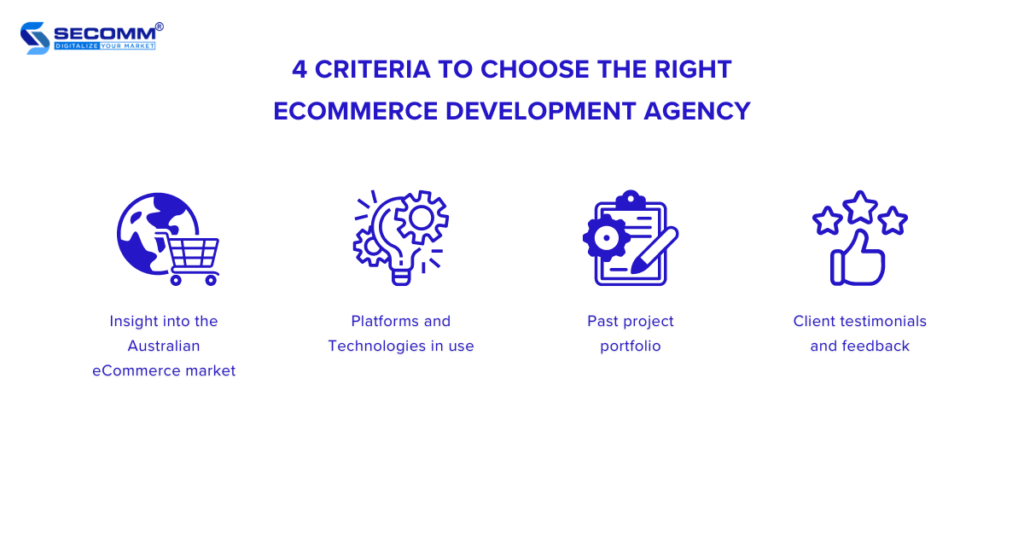
eCommerce portfolio
Evaluating past projects executed by eCommerce development agencies is an effective way to measure their capabilities and experience. By examining previous projects, you can assess their ability to solve specific challenges and whether the solutions proposed for each case are flexible and up-to-date with market development trends.
Client testimonials and feedback
Previous customers are a valuable source of information for assessing an eCommerce developer’s quality and reliability. Their feedback provides genuine insight into the developer’s work experience, product and service quality, and post-deployment support capabilities. This helps you make informed and effective decisions when selecting an eCommerce development agency.
Top 10 eCommerce development agencies in Australia
Below is a list of Australia’s top 10 leading companies in eCommerce development, ranging from pioneering innovators to reputable developers with years of experience. These developers have built and deployed hundreds of successful eCommerce projects, delivering real value to their businesses and customers.
SECOMM
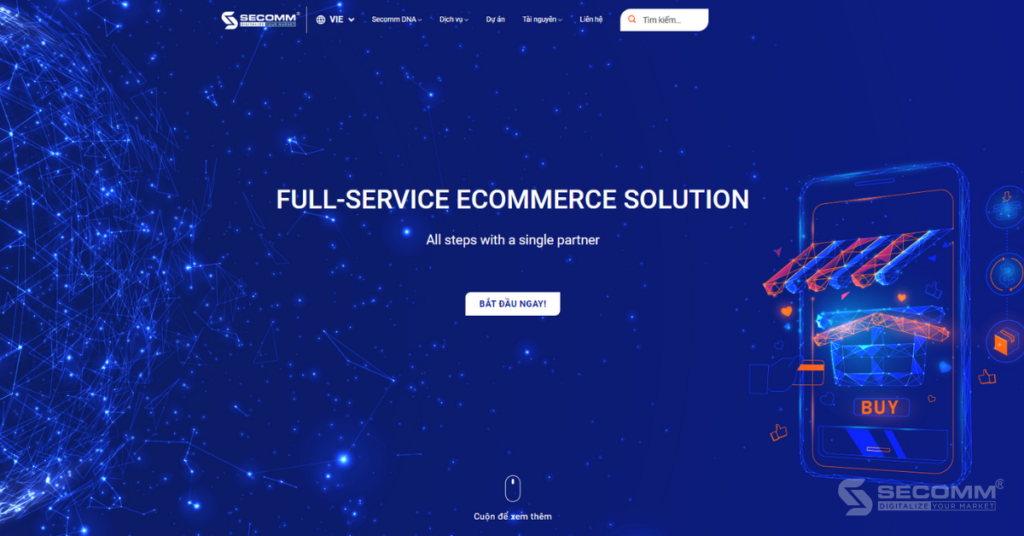
Over ten years, SECOMM has become a reliable eCommerce development agency for many Australian businesses such as Laybyland, The Rod Shop, Seconds Deals, and Trentham Estate. By providing innovative and customized solutions, SECOMM not only meets basic requirements but also goes further, creating unique and engaging online shopping experiences.
SECOMM’s strengths lie in Magento, Shopify Plus, and Headless Commerce. This team’s deep understanding of the market and strong technical expertise have enabled it to quickly grasp each project’s goals and outline detailed plans for completion with guaranteed quality and timelines.
WEBDESK SOLUTION
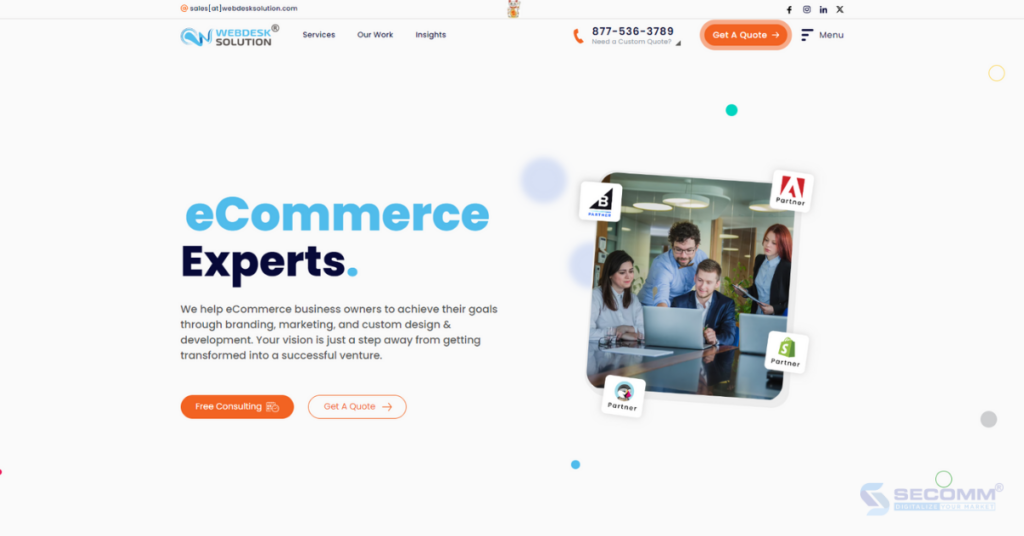
WEBDESK SOLUTION is known as a leading full-stack eCommerce developer in Australia. They utilize platforms such as Magento, Shopify, PretaShop, and Shift4Shop to deliver customized solutions to meet eCommerce deployment needs.
Emote Digital
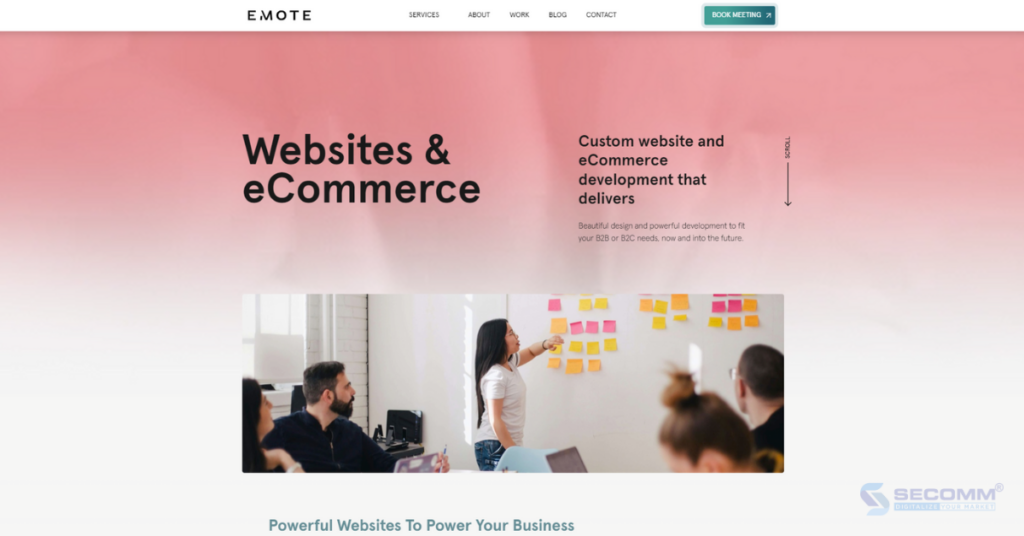
This company has built a reputation in the Australian market as a designer and developer of eCommerce websites. They use platforms like Drupal, Sitecore, WordPress, BigCommerce, Shopify, and Magento to create unique shopping experiences and genuine customer interactions.
Aron Web Solutions
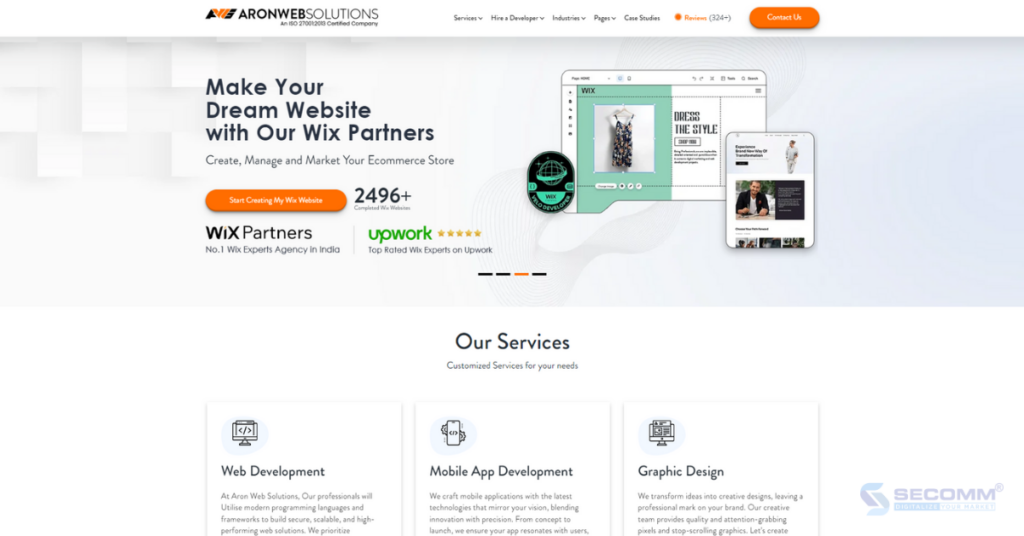
Aron Web Solutions is renowned for providing customized and professional eCommerce solutions, helping businesses optimize online performance. Aron has expanded its business operations to the UK, US, and Indian markets.
Inserito
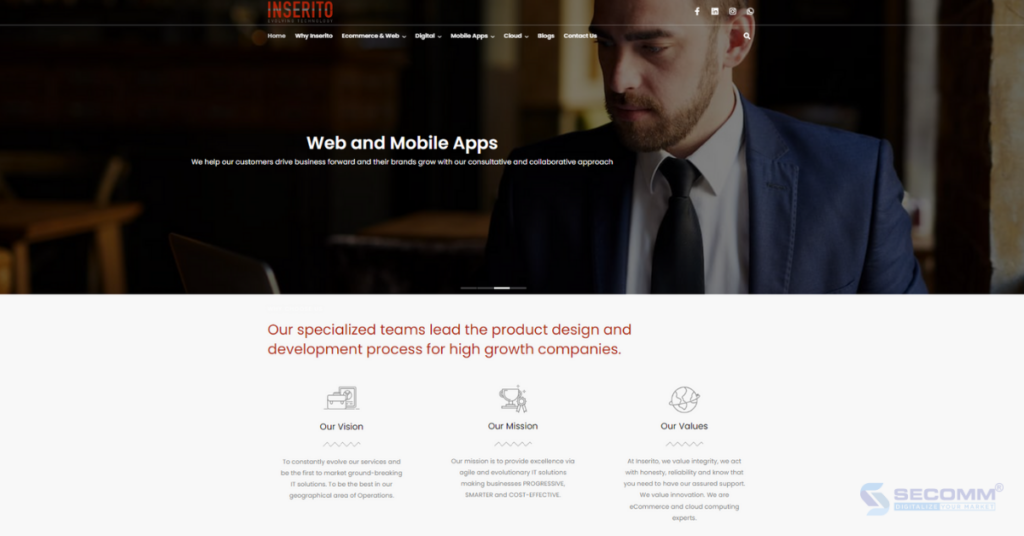
Inserito aims to develop eCommerce solutions for large enterprises based on platforms such as Magento, Shopify, NetSuite, and BigCommerce. They are committed to providing effective and sustainable solutions for businesses.
Magneto IT Solutions
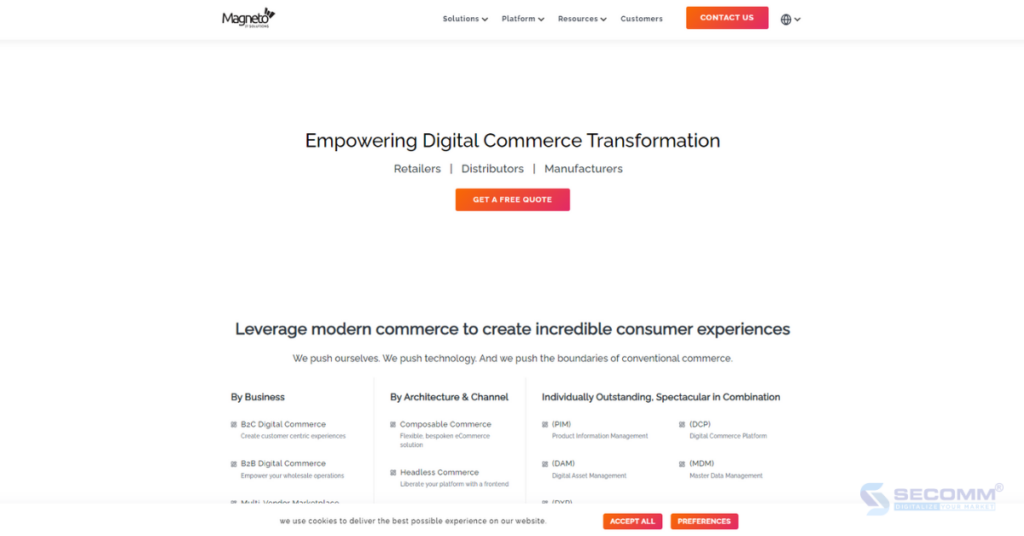
Magneto IT Solutions is an eCommerce development agency with diverse experience across industries. They provide customized and professional solutions to meet the specific requirements.
Webential
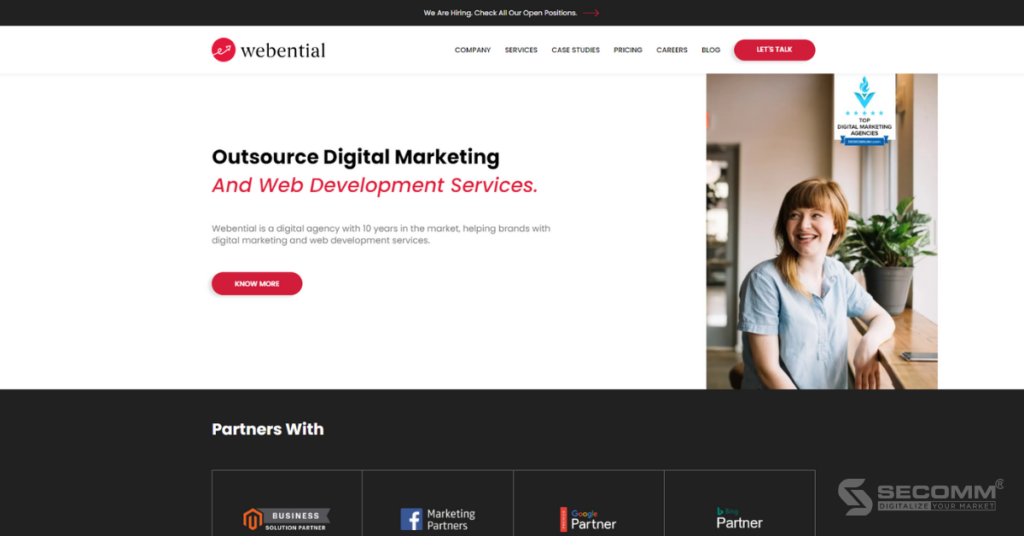
In Australia, Webential is a specialized unit that designs and builds eCommerce websites while providing related services in digital marketing. The company has a highly skilled team that proposes suitable solutions to optimize customer experience and implement effective marketing campaigns.
Enterprise Monkey
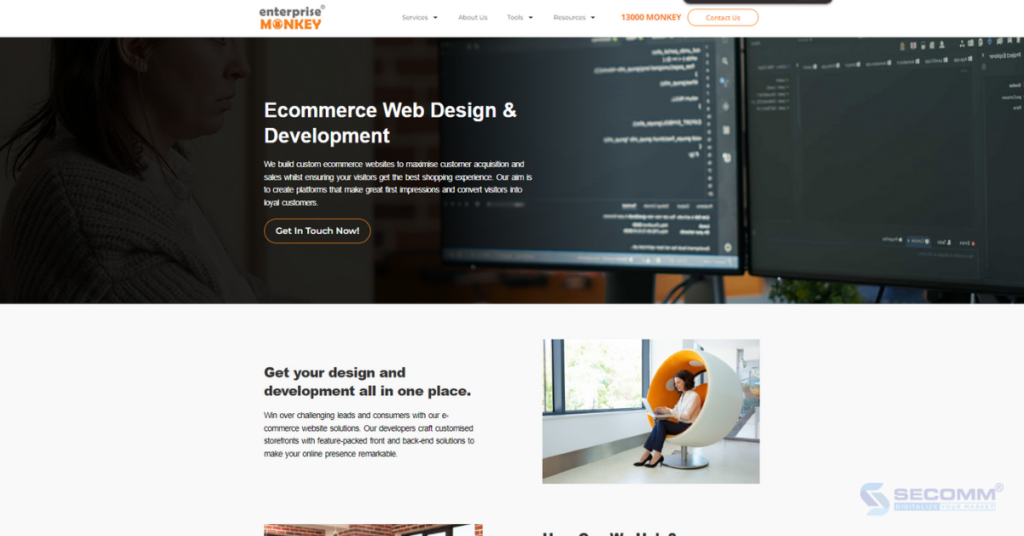
This company provides services for eCommerce businesses in Australia, from building online stores to mobile shopping applications. With its extensive experience, Enterprise Monkey can help develop customized shopping experiences using AR/VR and AI technologies.
Aussie Website
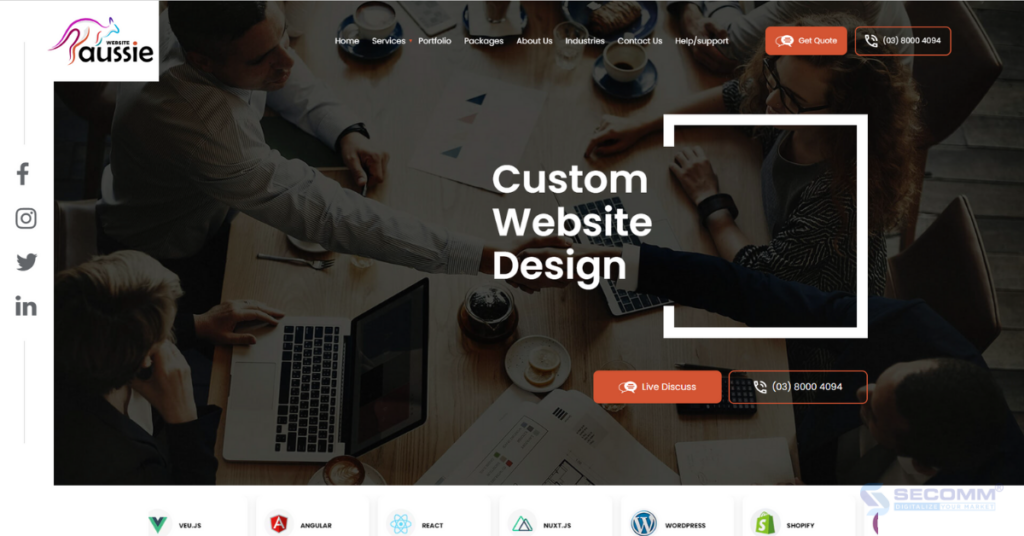
Aussie Website has established itself as a leading reputable eCommerce development agency in Melbourne city and Australia. They are committed to providing flexible and innovative solutions to help businesses optimize their eCommerce operations.
Spring Web Solutions
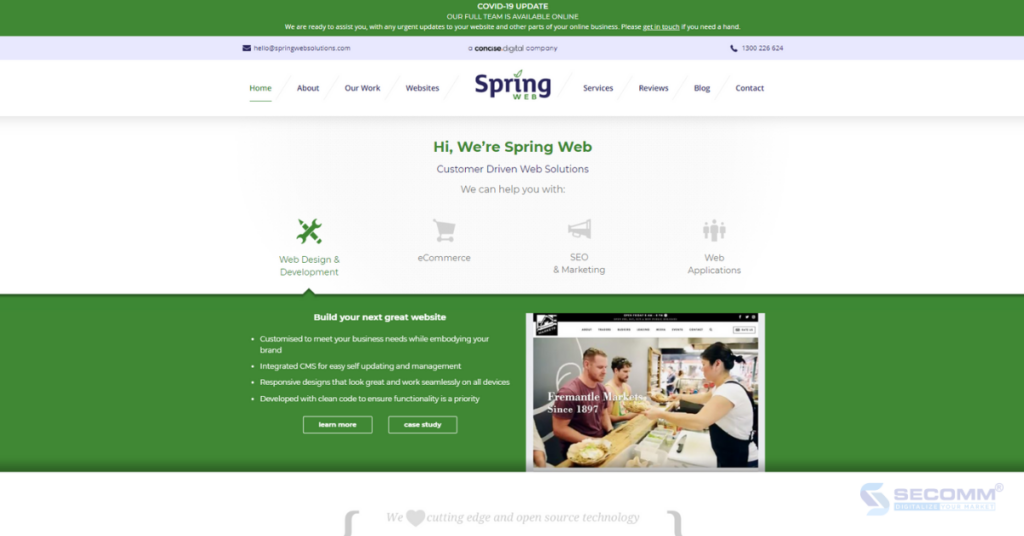
Spring Web Solutions is renowned for providing flexible and effective eCommerce solutions, helping businesses thrive online. Its technologies include Drupal, PretaShop, WordPress, Shopify, and Magento.
The Final Words
Above are 10 reputable and reliable eCommerce development agencies in Australia, along with essential criteria for choosing a suitable development partner. Each company offers unique characteristics and benefits to its clients, from deep market understanding to creativity and technical prowess.
Need more advice? Contact SECOMM or call (+84)28 7108 9908 for a free consultation!
 2
2

 640
640

 0
0

 1
1
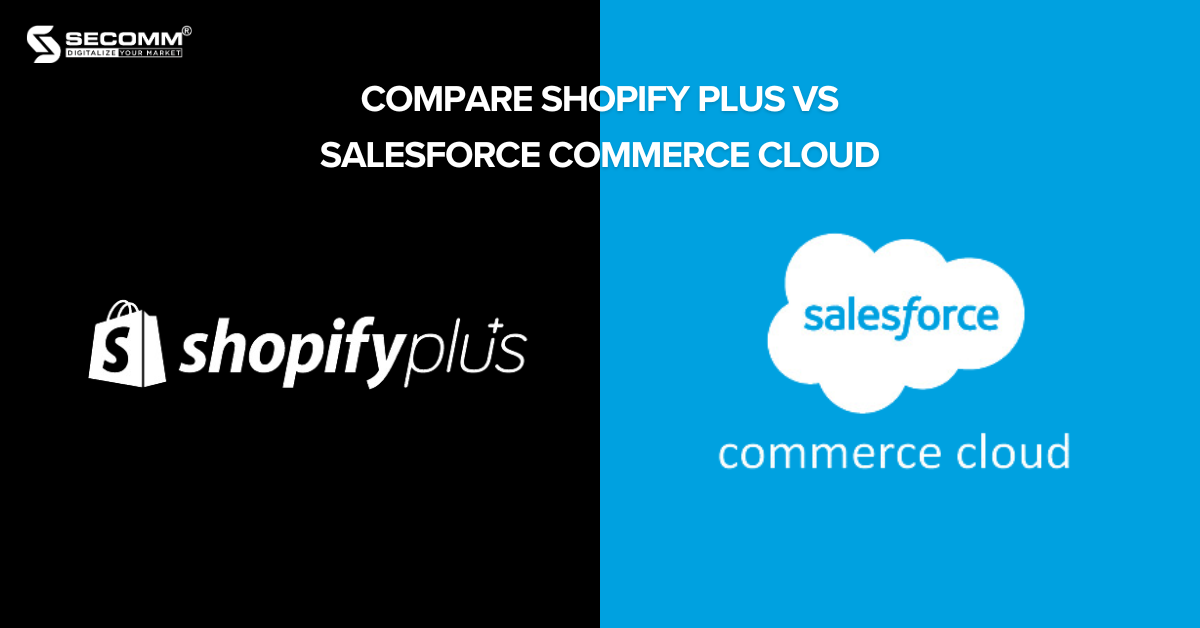
COMPARE SHOPIFY PLUS VS SALESFORCE COMMERCE CLOUD
Shopify Plus vs Salesforce Commerce Cloud are two leading platforms chosen by large enterprises worldwide to build eCommerce websites. Each platform has its advantages, from the flexibility and user-friendliness of Shopify Plus to the comprehensive solutions offered by SFCC.
Understanding each system’s differences and strengths is crucial before deciding between these two platforms. Let’s explore and compare the capabilities of Shopify Plus and SFCC in detail to make the most suitable decision.
Read more: Shopify Plus vs Advanced: Which one is right for you?
What is Shopify Plus?
Shopify Plus is a premium scalable platform version tailor-made for large enterprises. Launched in 2014, It rapidly emerged as the preferred option for those seeking efficient and adaptable expansion of their online operations. Unlike a fixed pricing model, Shopify Plus is customized according to specific deployment needs.
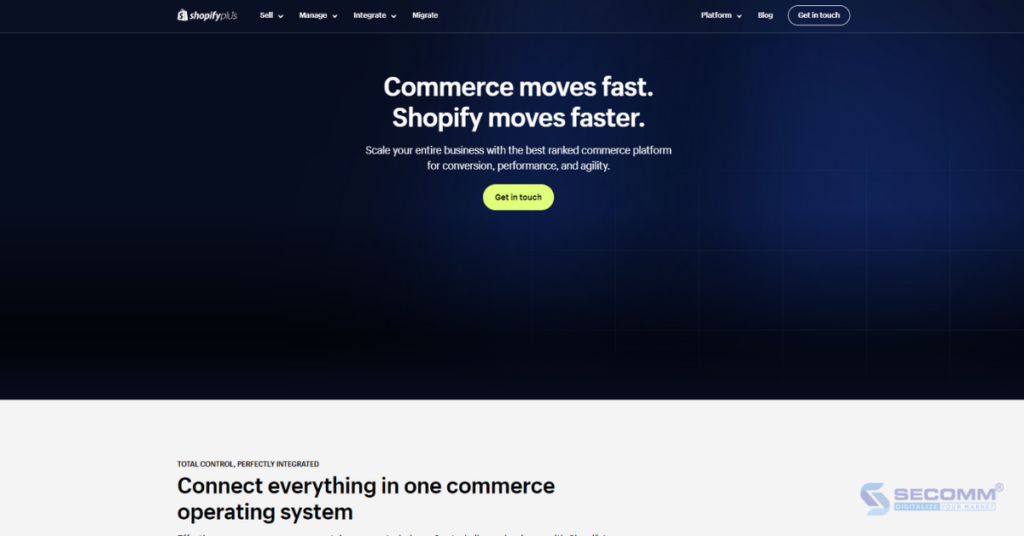
Pros of Shopify Plus
- User-friendly interface: The user-friendly interface of Shopify Plus allows you to quickly set up online stores with just a few simple steps
- High customization and scalability: You can customize many aspects of the eCommerce website, integrate apps, and expand bandwidth to handle large transaction volumes. However, effective customization requires high technical skills.
- Support for Headless Commerce deployment: Plus provides many tools and features that enable businesses to deploy Headless Commerce effectively. Businesses can build custom Headless eCommerce websites through the Hydrogen solution to deliver a unique customer experience.
- Shopify B2B: With exclusive solutions, businesses can quickly build B2B eCommerce systems with a simple customer experience similar to B2C systems.
- Shopify POS: The integrated Shopify POS Pro tool allows Plus merchants to create seamless online and offline shopping experiences.
- Bán hàng quốc tế: The integrated Shopify Market Pro tool allows Plus merchants to expand operations to global markets and explore new opportunities.
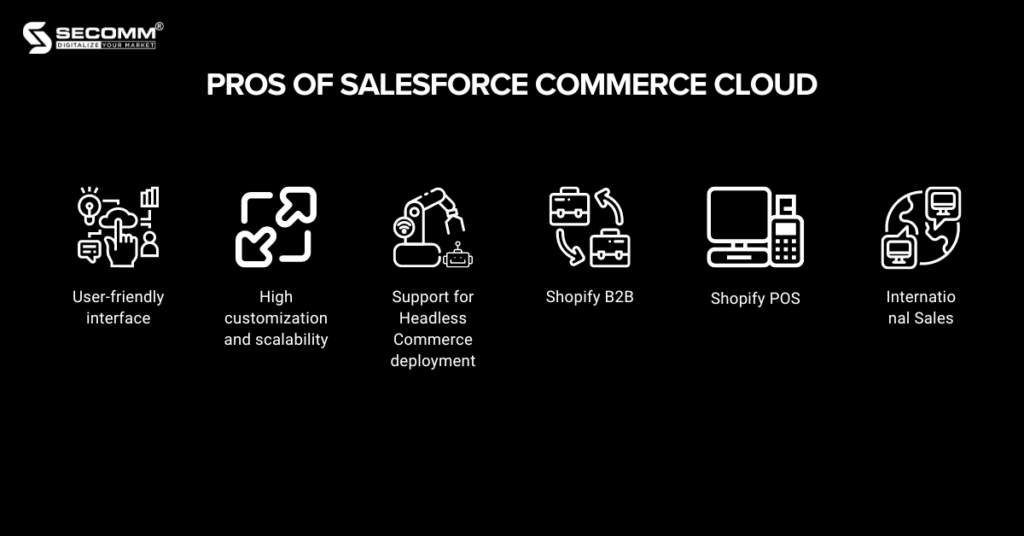
What is Salesforce Commerce Cloud?
Salesforce Commerce Cloud (formerly known as Demandware) is a robust cloud-based eCommerce platform built on Salesforce’s infrastructure, one of the world’s largest CRM software companies.
SFCC provides a comprehensive system for operating online stores, from building and deploying shopping websites to managing orders, marketing, and customer service. With robust integration capabilities and intelligent analytics tools, SFCC helps businesses create unique online shopping experiences and enhance customer interaction.
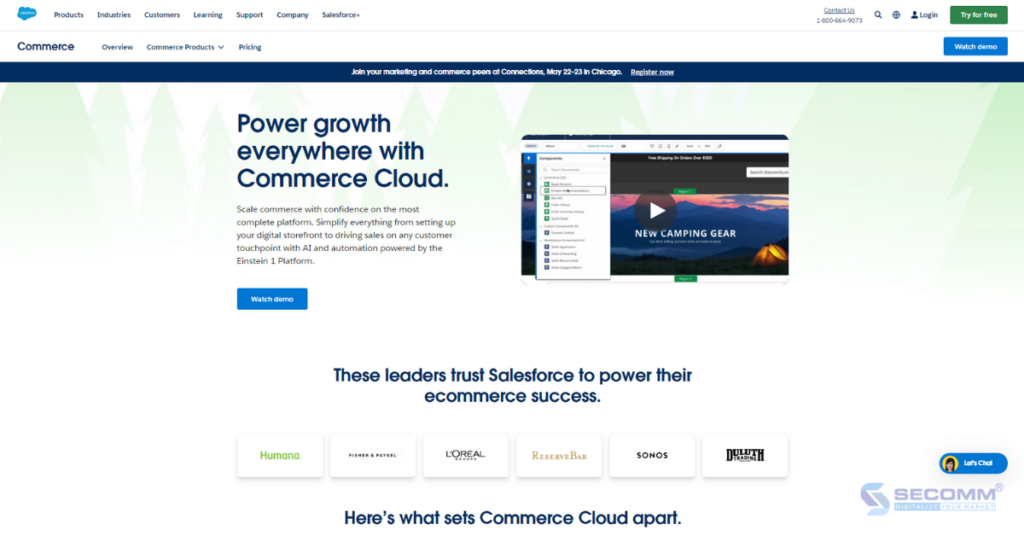
Pros of Salesforce Commerce Cloud
- Support for Headless Commerce Deployment: SFCC allows you to seamlessly integrate with your favorite tech stack to develop custom website interfaces to optimize the customer shopping experience.
- Building personalized experiences with AI: SFCC’s Marketing GPT and Commerce GPT enable you to eliminate repetitive tasks, save time in workflows, and provide personalized campaigns and shopping experiences on a large scale.
- Support for Omnichannel Commerce Deployment: SFCC makes it easy for you to develop and maintain multiple effective and consistent sales channels.
- High Scalability: SFCC operates on a cloud platform, allowing you to quickly scale their eCommerce operations without worrying about investing in hardware and software.
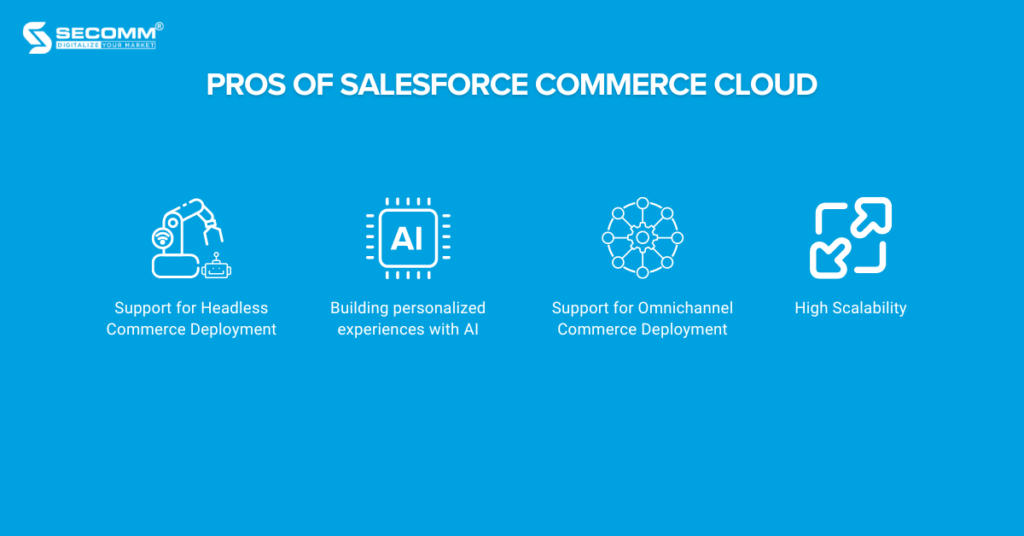
Shopify Plus vs Salesforce Commerce Cloud: Detailed
License fee
- Shopify Plus
The Plus version costs from $2300/month but is not fixed and will be customized based on specific needs. For merchants reaching a revenue threshold of $800,000/month, the Plus usage fee will gradually increase based on GMV (0.25% GMV for months with revenue exceeding $800,000). Merchants often must spend an additional $1K – $5K/month to integrate third-party applications.
- Salesforce Commerce Cloud
There are no exact figures for SFCC, as the cost is determined based on each merchant’s requirements. However, SFCC merchants with revenues around $20 million may have to pay about $200,000 – $600,000/year. Larger-scale enterprises with higher revenues may have platform fees totalling millions annually.
Target audience
- Shopify Plus: It targets large-scale merchants with complex needs, but it’s best for those just starting out and those rapidly expanding their business..
- Salesforce Commerce Cloud: It targets large enterprises with complex needs, especially those already using other Salesforce products and services and seeking to integrate e-commerce functionality into their existing systems.
Customization
- Shopify Plus:
+ Customizes unique storefront with Hydrogen.
+ Seamless third-party integrations
+ Ultilize cutting-edge technologies like AI, VR/AR for enhanced customer experience
- Salesforce Commerce Cloud:
+ Offers flexibility for complex customizations
+ Requires expertise in SFCC and specific technical skills
Scalability
- Shopify Plus:
+ Easily scales without slowing down website performance.
+ Provides a clear roadmap with over 100 product updates released twice a year
+ Continuously improves to keep your business ahead in eCommerce
- Salesforce Commerce Cloud:
+ Integrates seamlessly with other Salesforce systems but struggles with third-party apps
+ Updates regularly but at a slower pace compared to Shopify
Features and Functionality
Both platforms have rich features, differing mainly in focus and approach
- Shopify Plus
Plus focuses on flexibility and ease of use, providing merchants with a more intuitive interface than SFCC. This platform is renowned for its seamless integration with various payment options, marketing tools, and sales channels. This flexibility has made Plus attractive and accessible to most merchants.
Additionally, Shopify Plus offers their merchants exclusive and custom solutions to effectively handle various aspects of eCommerce, such as Shopify POS, Shopify Market, Shopify Hydrogen, Shopify Checkouts, B2B on Shopify, and more.
- Salesforce Commerce Cloud
SFCC, on the other hand, emphasises enterprise-level features such as integrated sales management tools, advanced search, order management, and promotion creation. Additionally, this platform excels in supporting international sales, advanced customer segmentation and personalization, as well as real-time dashboards and reports.
All of these features help businesses optimize eCommerce operations and drive growth.
When choosing Shopify Plus?
Shopify Plus will be the ideal choice in the following cases:
- Large-scale and fast-growing
Plus is designed specifically for large retailers with high demands for scale. With a range of exclusive solutions developed and continuously updated, this flexible eCommerce platform can effectively meet growth needs, allowing for easy scalability and customization.
- Budget and time limits
With lower license fees compared to SFCC and the ability for quick deployment, Shopify Plus is a suitable option for businesses with moderate budgets or those needing to implement projects in a short time frame.
- Priority on flexibility and ease of use
Plus is known for its user-friendly interface and high flexibility. Its drag-and-drop builder ensures that users of all technical levels can easily and efficiently set up an online store.
- Need for rapid integration with third parties:
Shopify Plus’s infrastructure provides a seamless integration system with third-party applications and tools. This is a significant advantage if you need to integrate quickly with CRM applications, marketing tools, or other online sales channels.
- Focus on customer experience
If customer experience is a top priority, Shopify Plus offers many tools and features to easily and effectively optimize shopping experiences and customer interactions.
When choosing Salesforce Commerce Cloud?
SFCC is a suite of solutions your eCommerce system needs to grow rapidly. If the following criteria apply, SFCC may be the more suitable choice:
- Already using SFCC products and services
If you have already used other Salesforce products and services such as Salesforce CRM, Marketing Cloud, or Service Cloud, choosing SFCC will optimize workflows and integrate customer data across your entire system.
- Requires deep integration and complex customization
SFCC is often the top choice for large enterprises with high deployment demands requiring flexibility in managing online stores. The platform provides powerful tools and features for customizing interfaces, managing complex product catalogs, and integrating with distinct business processes.
- Prioritizes security and reliability
Built on the infrastructure of Salesforce, one of the world’s largest cloud technology service providers, SFCC offers high levels of security and reliability, best for those with important customer data and information.
- Wants to leverage intelligent analytics features
SFCC provides tools to help you better understand customer shopping behavior and optimize business strategies. This enhances the shopping experience and increases sales revenue.
The Final Words
In today’s highly competitive eCommerce landscape, selecting the appropriate platform is crucial for your business success. This article has provided an overview of the top two choices, Shopify Plus and SFCC.
When it comes to making a decision, careful consideration of the specific needs is essential, from scale and goals to budget and technical requirements, to make the most appropriate choice.
Need help making the right decision? Contact SECOMM or call (028) 7108 9908 immediately!
 4
4

 777
777

 0
0

 2
2
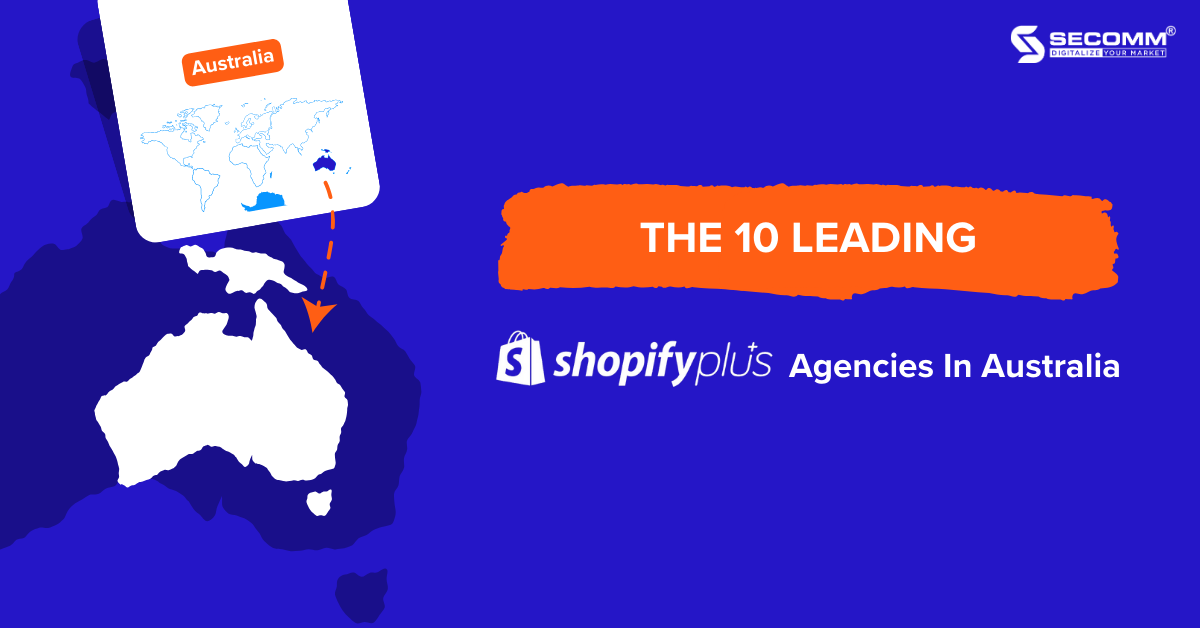
THE 10 LEADING SHOPIFY PLUS AGENCIES IN AUSTRALIA
The Shopify Plus agencies in Australia are more than just experts in this eCommerce platform; they’re also dependable allies in your online business growth. The Australian eCommerce market has experienced significant expansion in recent years, so choosing the right Shopify Plus development partner is a pivotal strategic move.
In this article, we’ll outline Australia’s top 10 premier Shopify Plus developers and the criteria for selecting the ideal partner for your eCommerce development project.
Read more: Top 10 Shopify Plus eCommerce websites in Australia
What is Shopify Plus?
Shopify Plus is an advanced eCommerce platform tailored for large enterprises that aim to expand their business operations and elevate their customers’ online shopping experience. It offers a robust infrastructure for building custom eCommerce websites and flexible scalability for seamless integration with third-party applications.
Moreover, the platform continuously evolves and enhances its exclusive solutions, empowering businesses to operate more efficiently and deliver an exceptional customer experience.
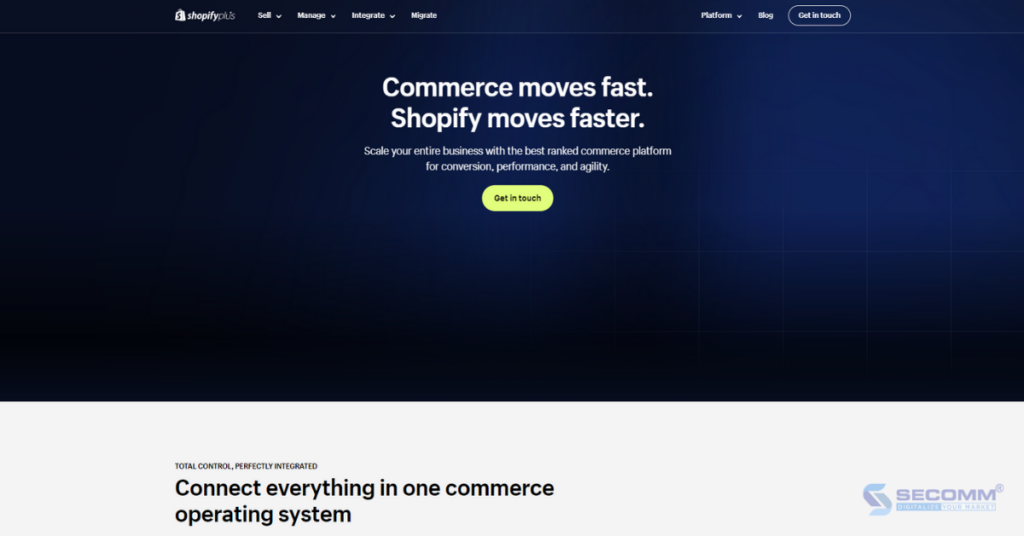
Read more: 15 reasons to migrate to Shopify Plus
Why partner with Shopify Plus agencies?
This is an important question that many businesses often ask when starting their eCommerce projects. Below are some reasons why collaborating with a Shopify Plus development company:
Professional Expertise
Shopify Plus developers typically have teams of experts highly skilled in this platform. Most companies will participate in the Shopify Plus Partners program, receiving technical support, educational resources, commissions, and branding.
Moreover, these developers must demonstrate that they meet the standards to become official Shopify Plus partners. Therefore, collaborating with them will help businesses launch their eCommerce websites quickly while utilizing features and integrations to optimize business performance.
Cost and Time Optimization
Partnering with Shopify Plus agencies can save time and costs compared to independently building and managing an eCommerce website.
Collaboration becomes even more valuable when tight deadlines and rapid online store deployment are required. These developers already have the tools, processes, and experience to efficiently and swiftly deploy projects.
Ongoing Support
It is crucial to ensure smooth and stable website operation after launch. Shopify Plus developers often provide continuous support services after the project is completed.
This involves the ongoing maintenance and management of the website, along with technical assistance, to ensure seamless operation and constant alignment with Shopify Plus’s latest features.
Read more: Shopify Plus and Advanced: Which one is right for you?
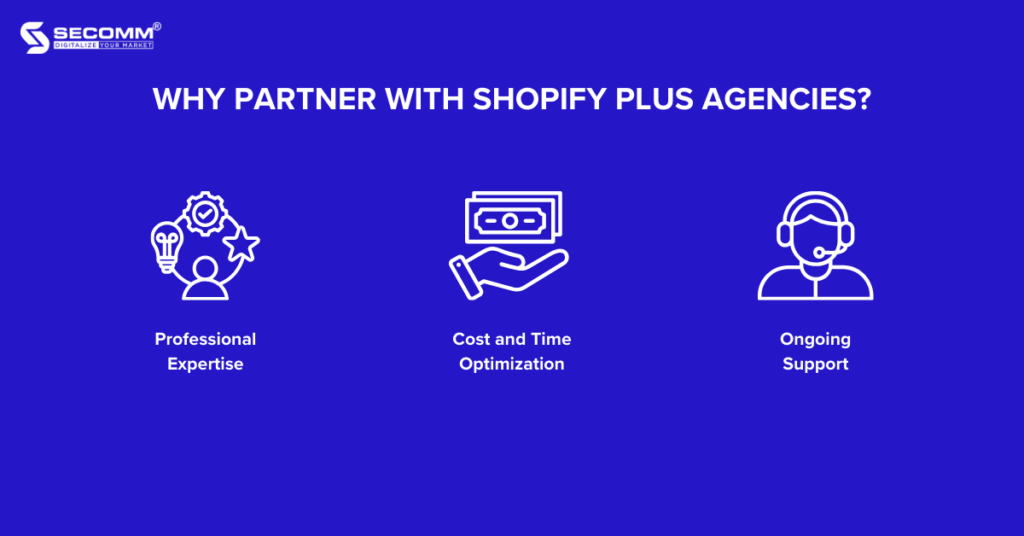
Four criteria for choosing the right Shopify Plus agency in Australia
Partnering with any development company in Australia can greatly influence the success or failure of a Shopify Plus implementation project. Here are four key criteria to consider when seeking a suitable developer:
Shopify Plus Expertise
A thorough understanding and experience with this platform are essential when developing an eCommerce project with Shopify Plus. Therefore, this is the primary point to evaluate any potential development agency.
You must ensure that the chosen developer has the knowledge and skills to implement the Shopify Plus platform. They need a team of capable experts to build, customize, and optimize eCommerce websites based on specific.
Insight into the Australian eCommerce Scene
Designing and building a website with a customized shopping experience tailored to the needs of Australian consumers isn’t an easy task. This requires technical skills and expertise in the Shopify Plus platform and a deep understanding of how the Australian eCommerce market operates.
Therefore, developers need to understand the target audience, their shopping behaviours, legal regulations, and other factors related to the distinctive business culture in this country.
Client Testimonials
Evaluating feedback from previous clients can be valuable in the decision-making process. You can check reviews from various sources and clients to ensure objectivity and transparency. The Shopify Plus developer must have the necessary skills and experience to complete the eCommerce project as required.
Post-Deployment Support and Maintenance
When your Shopify Plus website is done and launched, you must pay attention to technical support and maintenance. That’s why should opt for a development agency dedicated to providing prompt support and ongoing maintenance after completing the project.
This ensures the website’s stability, swift resolution of technical glitches, and consistent security updates to keep the site current with the latest platform versions.
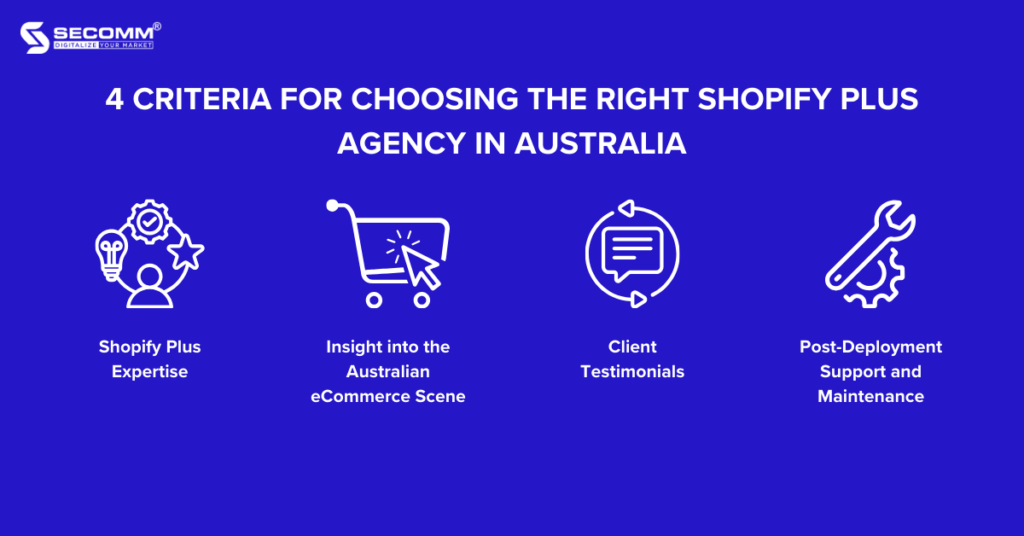
Top 10 Shopify Plus Agencies in Australia
The continuous growth of the Australian eCommerce market has led to an increasing demand for collaboration with top-notch developers, especially those specializing in the Shopify Plus platform. Below are the top 10 Shopify Plus development companies in Australia:
SECOMM
With over 10 years of experience in the eCommerce industry, SECOMM is one of the trustworthy Shopify Plus developers in Australia. SECOMM can design and build Shopify Plus eCommerce websites, implement Headless Shopify Hydrogen, migrate platforms to Shopify Plus, and provide related services.
Moreover, the company offers various custom solutions based on different technology platforms such as Magento, WordPress, WooCommerce, and commercetools. With a team of talented and professional experts, SECOMM ensures the success of eCommerce projects collaborating with Australian clients. Notable among these are Laybyland, Trentham Estate, The Rod Shop, and Seconds Deals.
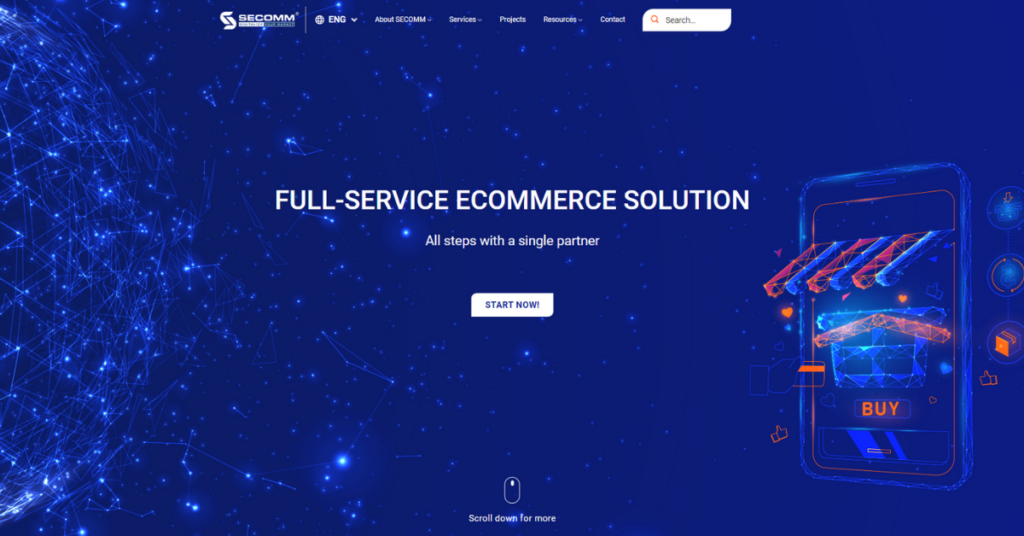
Drive Digital
Dive Digital provides eCommerce consulting services, UI/UX design, and Shopify website development. Its solutions optimise customers’ online shopping experiences and enhance business performance.
10SQ
10SQ aims to become the leading Shopify Plus development company in Australia, making it easy for businesses to access specialized services for this platform. Here, businesses can find customized solutions to expand and enhance their eCommerce systems efficiently.
Aron Web Solutions
Aron gathers highly skilled eCommerce developers proficient in various platforms and technologies, including Shopify Plus. The company has expanded its operations to many countries beyond Australia, such as the United States, the United Kingdom, and India.
Clean Commit
Clean Commit is a reliable partner with high expertise in developing and optimizing websites on the Shopify Plus platform. They are committed to providing effective and sustainable solutions for businesses.
Magneto IT Solutions
Magneto IT Solutions is a Shopify Plus developer with diverse industry experience. They offer customized and professional solutions to meet the specific requirements of businesses.
Acidgreen
In Australia, Acidgreen is renowned as a leading developer of eCommerce websites, excelling in Magento and Shopify Plus. The team’s experience and expertise in open-source and SaaS platforms are sufficient to maintain the company’s position in the market
30 Acres
This company develops solutions for businesses in Australia and New Zealand looking to implement eCommerce with Shopify Plus. Additionally, they provide continuous support even after the project is completed.
Pipelabs
Pipelabs’ solutions aim to deploy Omnichannel eCommerce on the Shopify Plus platform. Numerous projects’ success and positive reviews from previous clients attest to Pipelabs’ capabilities.
Moustache Republic
Moustache Republic is among the clients looking to implement Shopify Plus and BigCommerce. They provide solutions for eCommerce deployment based on these two platforms and offer seamless and efficient platform migration solutions.
The Final Words
The partners mentioned above are just a few of Australia’s skilled and trustworthy Shopify Plus developers. Choosing the most suitable partner to ensure your eCommerce objectives’ success and sustainable growth depends on your project’s specific requirements.
Start with Shopify Plus today with specialised solutions from SECOMM. Contact us or call (+84)28 7108 9908 for a free consultation!
 2
2

 668
668

 0
0

 1
1
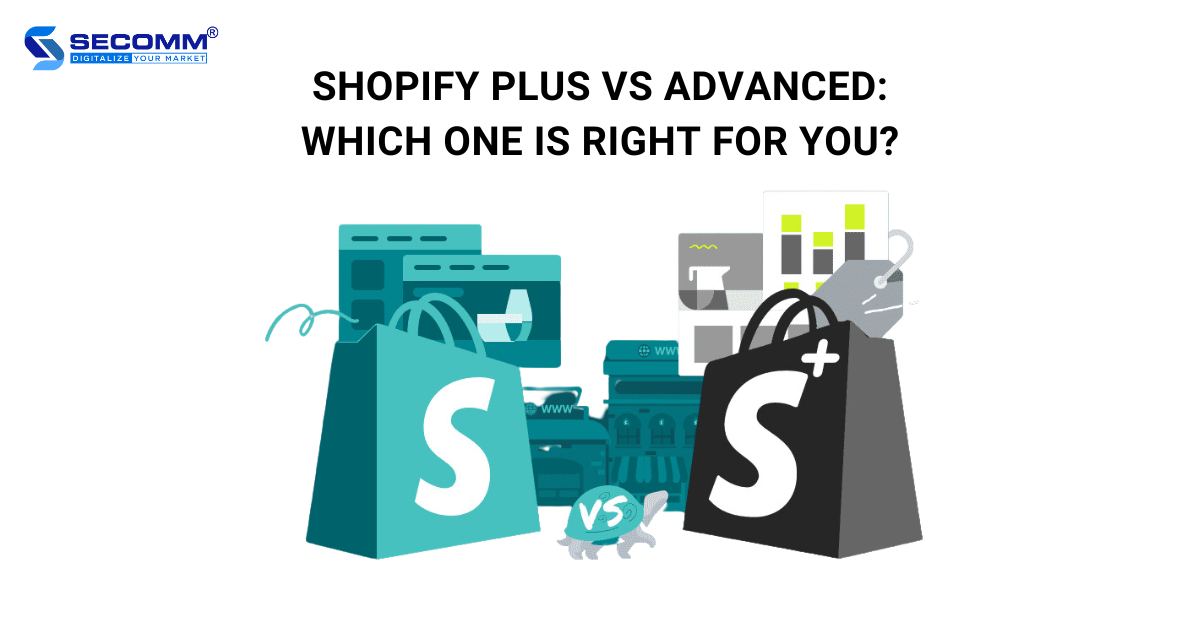
SHOPIFY PLUS VS ADVANCED: WHICH ONE IS RIGHT FOR YOU?
Shopify Plus vs Advanced are the two most essential versions of Shopify. They provide your business with many solutions and features to build and optimise eCommerce websites quickly.
Each version has advantages, from Advanced’s advanced features and cost-effectiveness to Plus’s flexible customization. Therefore, the question ‘Which is the right choice?’ becomes challenging for many eCommerce businesses.
In this article, let’s find a reasonable answer so each business can make the most appropriate decision.
Read more: What is Shopify? Pros and Cons of Shopify
What is Shopify Advanced?
Shopify Advanced is a pricing plan offered by Shopify, designed to support medium-sized businesses in developing their eCommerce operations. The Advanced includes all the features of the Basic and Shopify plans while also providing optimized transaction fees and additional advanced features.
These features include custom reporting and analytics, enhanced live chat, optimized checkout, 3rd-party calculated shipping rates, and more.
Pros of Shopify Advanced
Scaling businesses will need many advanced features to optimize their eCommerce operations. Therefore, the Advanced plan offers many outstanding advantages that enhance the ability to manage and grow your business flexibly and efficiently.
- Custom reports and analytics
This version excels in terms of reporting and analytics compared to standard plans. This feature lets you track and evaluate your business performance based on specific criteria, facilitating informed decisions.
- Attractive transaction fee
The Advanced ensures lower transaction fees than the two standard plans, helping you save costs and enhance profitability. These lower transaction fees optimize profit opportunities and make the transaction process more appealing and sustainable.
- International Sales
The Advanced also emphasizes its ability to support international sales through Shopify Markets, a tightly integrated platform. This helps you expand your business scope into the global market efficiently and flexibly, leveraging growth potential from diversifying sales revenue.
- 3rd -party calculated shipping rates
The Advanced plan allows you to integrate and manage shipping fees by third-party carriers, providing customers with more options. This integration capability helps optimize the shipping process and reduces any complexity associated with shipping costs, thereby creating the best online shopping experience for customers.
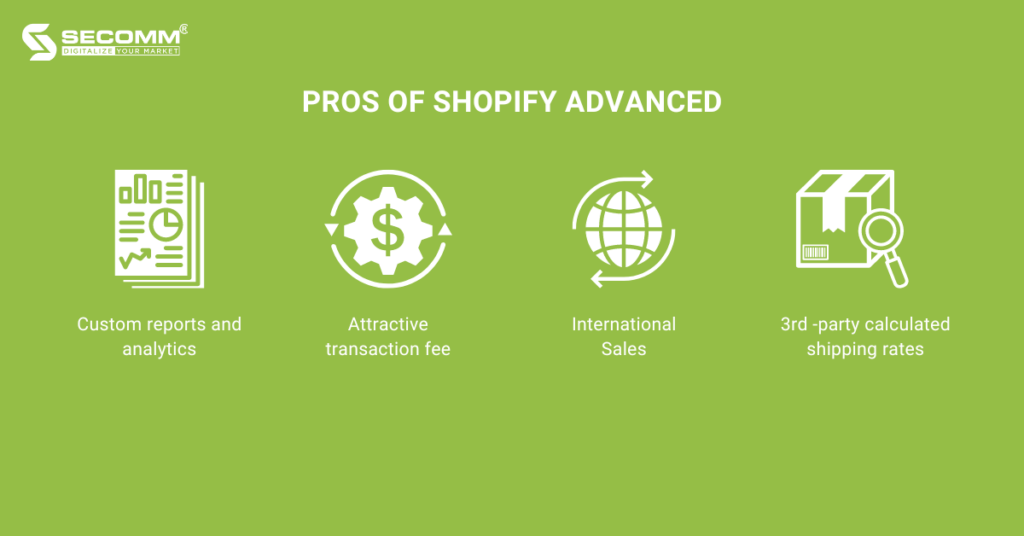
What is Shopify Plus?
This premium version is tailored for large-scale, multinational, and fast-growing businesses. The Plus offers advanced features, superior customization, and scalability. Unlike the regular version, Plus does not have a fixed price; instead, costs are customized based on the business’s specific needs.
Businesses with high sales revenue, large product catalogues, and complex customization needs would be suitable targets for Shopify Plus.
Pros of Shopify Plus
The Plus version brings superior capabilities to help businesses create an optimized eCommerce experience for customers and achieve the expected revenue.
- Customization and Scalability
Shopify Plus offers high customization and flexibility in developing eCommerce websites. You can customize many aspects of the website, integrate applications, and expand functionality. This helps create an optimal online shopping experience and enhances customer interaction.
- B2B on Shopify
The B2B solution set with exclusive features is only available to Shopify Plus merchants. These features are regularly enhanced to optimize the B2B process, from ordering to customer management, providing a unique and efficient experience.
- Headless Commerce
With its flexibility, Shopify Plus can fully support the implementation needs of Headless Commerce. Furthermore, through the exclusive solution Hydrogen, Shopify allows businesses to build custom Headless eCommerce websites to provide the most unique customer experience.
- Omnichannel Commerce
With Shopify POS Pro integrated, Shopify Plus supports omnichannel commerce deployment, helping you create a seamless shopping experience across multiple channels, from eCommerce websites to brick-and-mortar stores.
Through the Winter ’24 Editions update, Shopify recently added two new features: POS Terminal and Ship From Store. These features optimize customers’ payment processes and simplify merchant experiences
- International Sales
The Plus version supports large-scale expansion and international outreach. The integrated Shopify Market Pro solution allows you to efficiently optimize your eCommerce operations and seize opportunities in the global market.
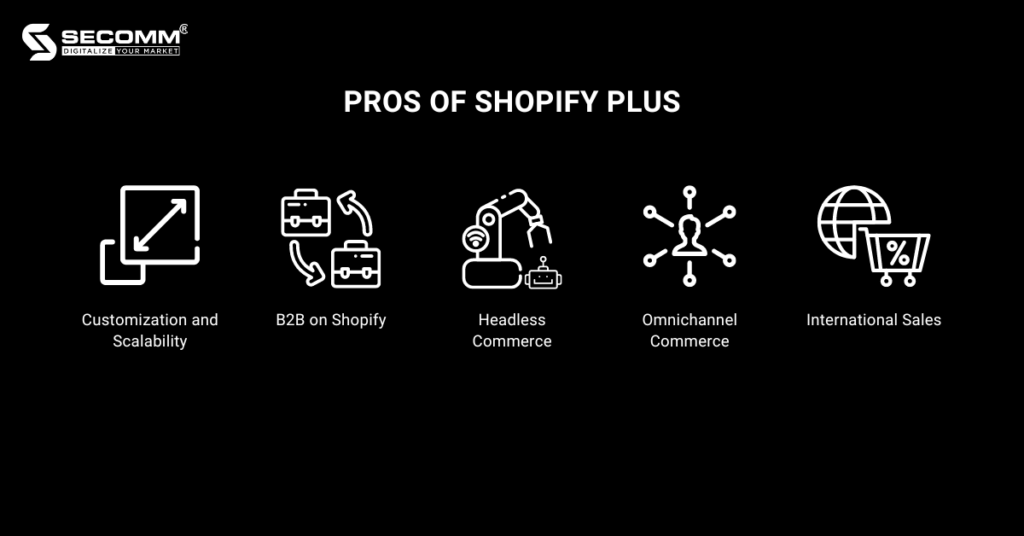
Shopify Plus vs Advanced: Detailed Comparison
Pricing
- Shopify Advanced
The platform usage fee for the Advanced service package is $299 per month. This pricing is reasonable for medium-scale businesses seeking advanced features to develop their eCommerce websites. Additionally, the transaction fee for the Advanced package is 0.6% per transaction, lower than the Basic and Shopify packages.
- Shopify Plus
The usage fee for the Plus package typically starts at $2,300 per month and is not fixed but customized based on deployment needs. At this price point, you’ll gain access to numerous advanced features and exclusive solutions that are regularly fine-tuned and improved to meet the increasing demands of eCommerce development.
Online transaction fees will vary by geographic region. Businesses using Shopify Payments will have this fee waived.
Target Audience
- Shopify Advanced: Targets medium and large businesses seeking to enhance flexibility and customization without requiring colossal investment.
- Shopify Plus: Targets large businesses with extensive product catalogues, high sales volumes, and special needs for features, solutions, and support.
Customization & Scalability
- Shopify Advanced: It provides high customization and scalability capabilities but with limitations compared to the Plus version.
- Shopify Plus: Designed to meet premium customization and scalability needs, with seamless integration and flexibility with other systems.
Resources
- Shopify Advanced: Resources and learning materials are provided to help you operate and manage eCommerce websites more effectively. These include blogs, free online courses, developer documentation, and the “Helps” portal.
- Shopify Plus: Plus merchants can find numerous exclusive resources valuable for eCommerce operations such as the Plus blog, Plus Academy, API documentation, Shopify experts, and Plus partners.
Customer Support
- Shopify Advanced:
With the Advanced plan, you can seek 24/7 support from the Shopify team through in-depth live chat. Additionally, many Shopify merchants’ community groups are on Facebook and Slack.
- Shopify Plus:
Shopify Plus merchants can expect deep customer care services 24/7 through email, hotline, and live chat. They will receive technical support and valuable business advice from Shopify’s top experts. Additionally, businesses can join the Plus merchant community on Facebook to share and learn from each other’s experiences.
Security
- Shopify Advanced
Advanced offers robust security features, including protection for personal information and payment data. However, its security level is lower than that of the Plus plan.
- Shopify Plus
Plus provides a range of security measures and features to protect business data, customer information, and payment transactions as much as possible. This includes:
- Compliance with six types of PCI (Payment Card Industry) standards
- Providing the highest level of data encryption
- Providing specific tools to detect potentially fraudulent transactions
- Automatically matching and adjusting payment information to ensure actual transactions match payment profiles
- Automatic data backups
- Protecting against Bot and DDoS attacks.
When choosing Shopify Advanced?
This is an important question that many businesses are seeking answers to. If your business is on a growth trajectory and has high demands for flexibility and customization, Shopify Advanced is a worthy consideration.
First and foremost, if you desire more autonomy over the store interface and user experience, Shopify Advanced provides customizable reporting and analytics tools, enabling you to track business performance in the way you want to make informed decisions.
Furthermore, Shopify Advanced could be an ideal companion if you’re looking for a cost-effective solution and don’t want to be constrained by fundamental limitations. With lower usage fees than higher-tier packages, Advanced offers financial benefits while keeping the eCommerce website running smoothly.
When choosing Shopify Plus?
Plus will be the perfect choice for large-scale businesses with high flexibility, performance, and support demands. If the following characteristics apply, Plus is very likely to be the more suitable choice:
- High sales volume and extensive product catalogue: Shopify Plus infrastructure is robust enough to easily customize and scale according to a business’s needs and handle large transaction volumes daily.
- Go Headless: Shopify Plus’s Hydrogen solution offers a significant advantage for businesses that want to deploy a headless commerce model that separates the front and back end.
- Requirement for deep support services: Plus’s flexibility requires specific technical expertise to leverage the platform’s sophisticated infrastructure effectively. Therefore, Plus provides 24/7 technical support to address issues and optimize the user experience promptly.
The Final Words
The decision between Shopify Plus and Advanced is not just about choosing a platform but also about building an eCommerce system that reflects your business’s true values and long-term goals.
Shopify Advanced is a flexible solution for medium to large businesses seeking flexibility and low costs. On the other hand, Shopify Plus is an excellent choice for larger enterprises, where premium features and support are key to strong and efficient growth.
With the development and fluctuations of the market, the choice between Shopify Plus and Shopify Advanced is not only a current decision but also a long-term strategy to shape the future of your business.
Need help to make decisions? Contact SECOMM or call (028) 7108 9908 now!
 13
13

 619
619

 0
0

 1
1
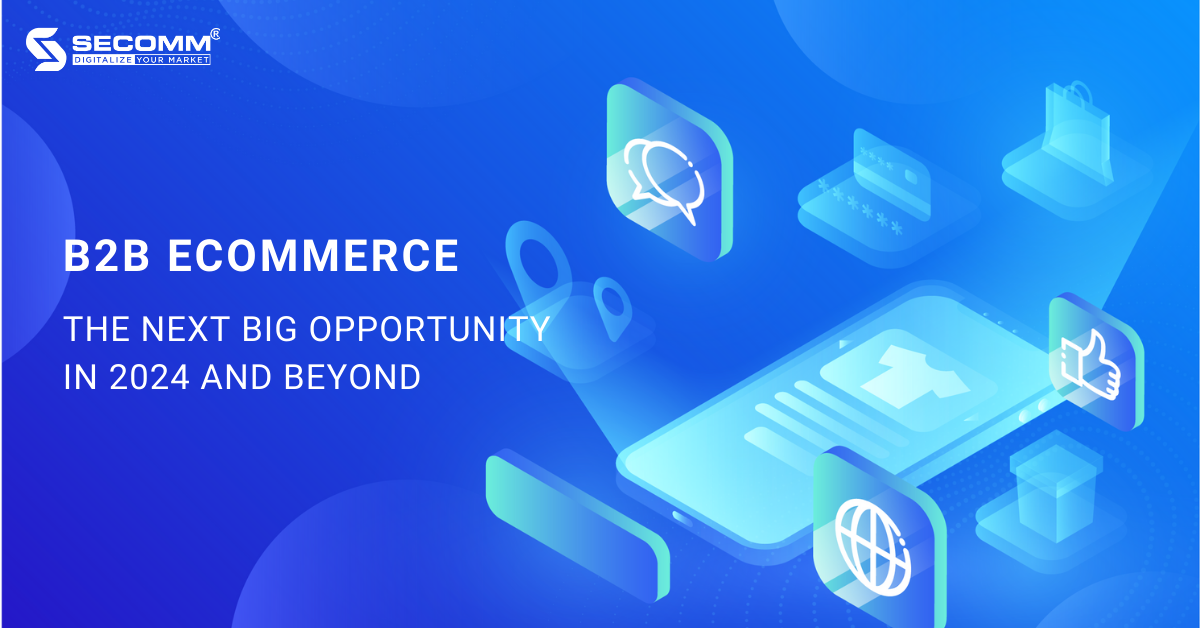
B2B ECOMMERCE: THE NEXT BIG OPPORTUNITY IN 2024 AND BEYOND
Business-to-business (B2B) eCommerce is becoming increasingly important in the modern business world. In this arena, businesses interact and conduct transactions with each other through eCommerce platforms.
When it comes to this field’s growth potential, Bobby Morrison, Shopify’s Chief Revenue Officer, confidently asserts that B2B eCommerce will be the next significant opportunity for businesses of all scales in 2024 and the years that follow.
Read more: What’s new Shopify Editions Winter ’24?
What is B2B eCommerce?
Business-to-business (B2B) eCommerce is a form of commercial transactions between businesses through eCommerce platforms. In this model, businesses don’t focus on selling directly to end consumers (as in B2C commerce); instead, they prioritize creating value for fellow business partners.
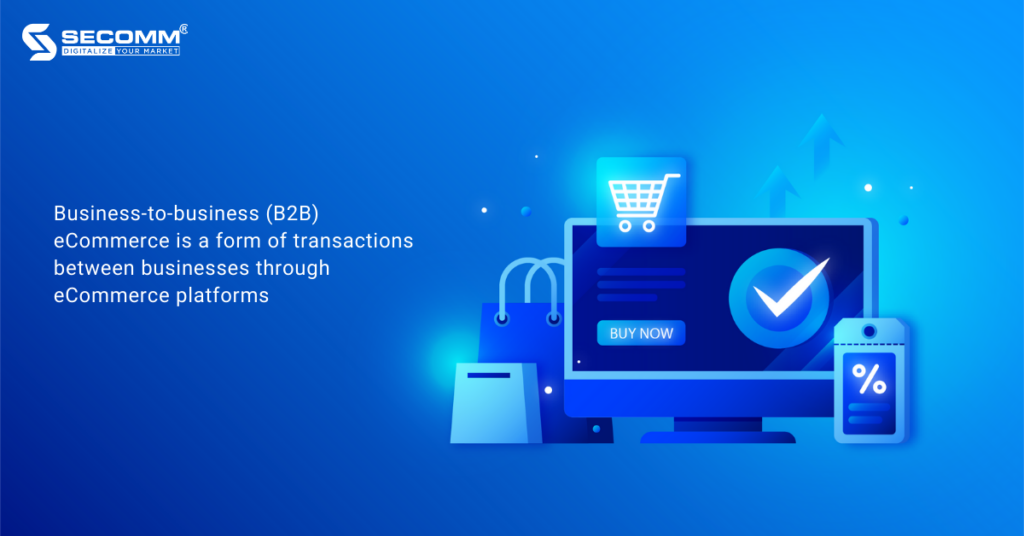
B2B eCommerce transactions may involve the exchange of goods and services, the sharing of information, and collaboration on big projects. Such interactions commonly occur between businesses operating within the same industry or along the same supply chain.
In the realm of B2B eCommerce, these transactions often have prominent scales, and high values, and are typically carried out through reliable online transaction management systems, databases, and platforms.
B2B vs B2C eCommerce: What are the differences?
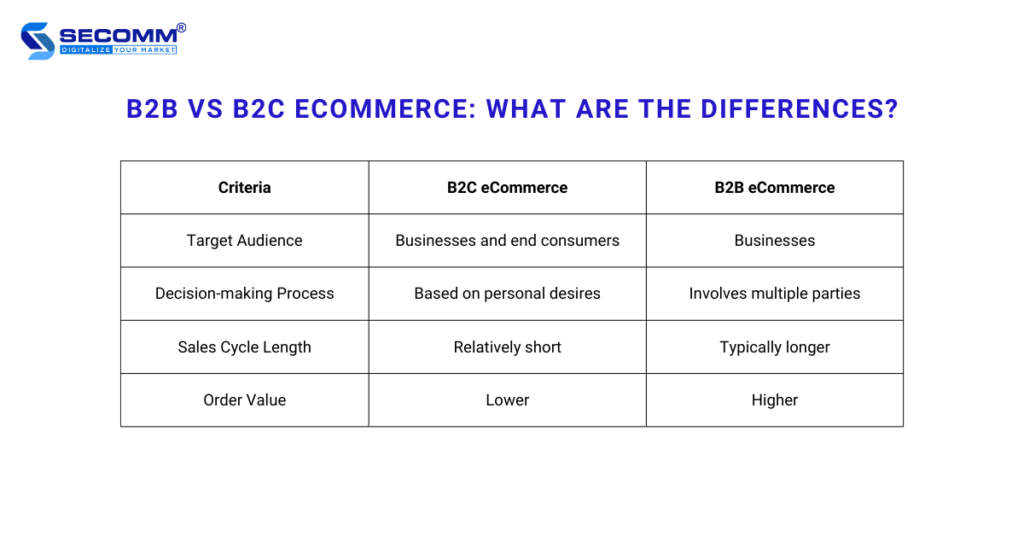
Types of B2B eCommerce
In B2B eCommerce, businesses often use several common models to interact and conduct transactions. Here are four main models:
- B2B2C (Business-to-Business-to-Consumer): This model combines the essence of both B2B and B2C. In B2B2C, two businesses collaborate to provide products and services specifically to end customers (2C).
- Distributor: They will distribute the manufacturer’s products to the market. They act as intermediaries in the manufacturer’s supply chain, spanning from the production stage to the selling stage.
- Wholesale: Wholesalers represent individuals or companies that purchase products in large quantities from manufacturers and sell them in bulk to retailers.
- Manufacturer: They specialize in producing products. They may sell directly to end customers or through wholesale agents and distributors.
B2B eCommerce Platforms
B2B eCommerce is rapidly developing, and various online platforms are emerging to help brands implement this business model efficiently. Here are three popular platforms that B2B brands commonly use to build eCommerce websites. Each brand will choose the most suitable depending on the scale, objectives, and budget.
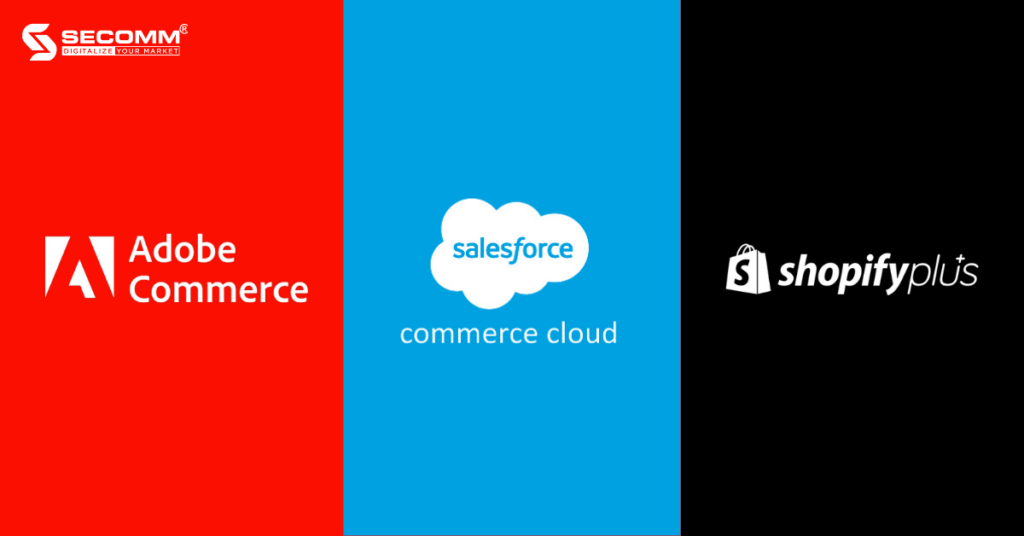
Adobe Commerce (Magento)
Pros:
- Offer great customization for complex needs
- High scalability
- No limits on sales volume
- A diverse range of extensions
Cons:
- High requirements for knowledge and technical skills
- Lengthy implementation time
- High initial costs
Salesforce B2B Commerce
Pros:
- Salesforce B2B solution with outstanding features and continuous improvements
- High scalability and flexible customization
- Seamless integration with various other Salesforce systems
Cons:
- High requirements for knowledge and technical skills
- Lengthy implementation time
- High initial costs
Shopify Plus
Pros:
- Diverse exclusive solutions for Shopify Plus merchants
- The B2B on Shopify with outstanding features and continuous improvements
- Superior customization and scalability compared to many other SaaS platforms
Cons:
- High requirements for knowledge and technical skills
- Platform lock-in risk
Read more: Top 5 B2B eCommerce platform
B2B eCommerce Brands
Brooklinen
Booklinen is a trusted online marketplace specializing in premium bed linens. Established in 2014 with a focus on end consumers, the brand later diversified into the B2B sector as demand for larger-quantity orders grew.

Leveraging the B2B on Shopify solution, Booklinen created a visually appealing and user-friendly B2B eCommerce website, addressing the intricate needs of B2B sales operations. Furthermore, the brand can offer customers a personalized online shopping experience based on their buying behaviour, aiming to boost interaction and conversion rates.
Kulani Kinis
Launched in 2015, Kulani Kinis aims to offer budget-friendly swimwear without compromising on superior quality and style. With a strong desire to expand wholesale operations like retail, Kulani Kinis has built an intuitive, user-friendly B2B eCommerce website similar to its retail site.

The B2B website enables wholesale customers to easily place orders from its extensive portfolio of over 800 products.
A notable feature is the custom collection page with a slider displaying the quantity available for all swimwear sizes. This allows customers to add multiple sizes and large quantities of products to their cart seamlessly, enabling them to enhance their shopping experience without leaving the collection page.
eJuices
eJuices is a well-known brand in producing and supplying high-quality electronic liquids. The brand focuses on using safe and high-quality ingredients, ensuring that each eJuice bottle delivers excellent flavour and meets the highest safety and health standards in the vaping industry.
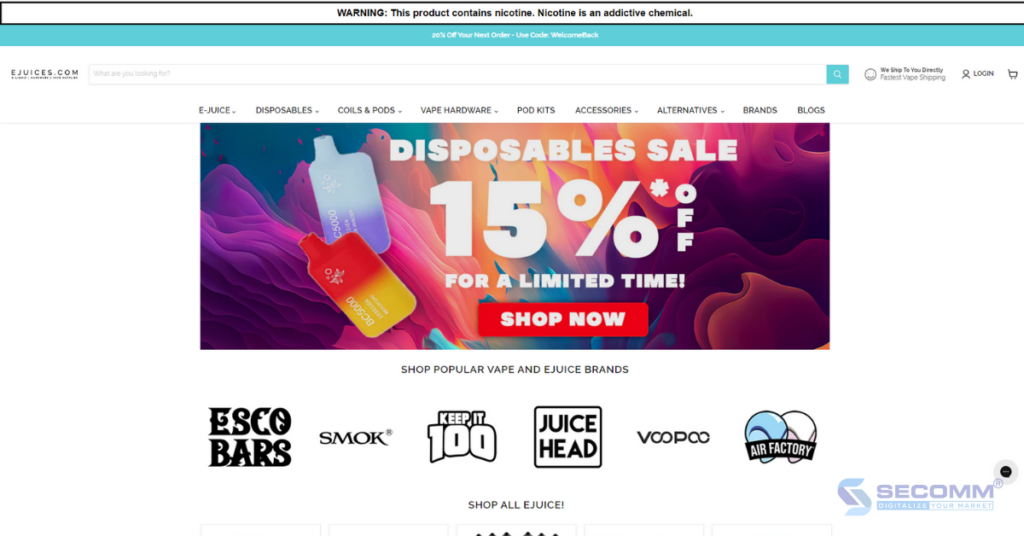
In addition to implementing a B2C model, eJuices is recognized as a genuine B2B eCommerce business. The brand has efficiently addressed inventory challenges, optimising its business operations while providing significant value to retail partners and enhancing collaborative relationships.
Build Your first b2b e-commerce website today!
Comprehending and effectively applying B2B eCommerce in your business strategy will undoubtedly open up promising new opportunities. B2B eCommerce is the key to unlocking continuous possibilities in the rapidly changing world. It isn’t just a passing trend; it presents a significant opportunity for every business’s growth and development.
If your company is considering establishing an eCommerce website and refining strategies to serve B2B customers, contact SECOMM or call the hotline (+84)28 7108 9908 today. Together, we can shape your business’s effective and sustainable future.
 2
2

 553
553

 0
0

 1
1

SHOPIFY EDITIONS WINTER ’24 AT A GLANCE: WHAT’S NEW?
Shopify Editions Winter ’24 is the latest update with a host of new features and notable improvements. Especially, the SaaS platform has dedicated research efforts to bring about some groundbreaking updates that could be highly beneficial for large-scale eCommerce enterprises.
Let’s go through the 5 most important updates that large brands should pay attention to.
B2B On Shopify
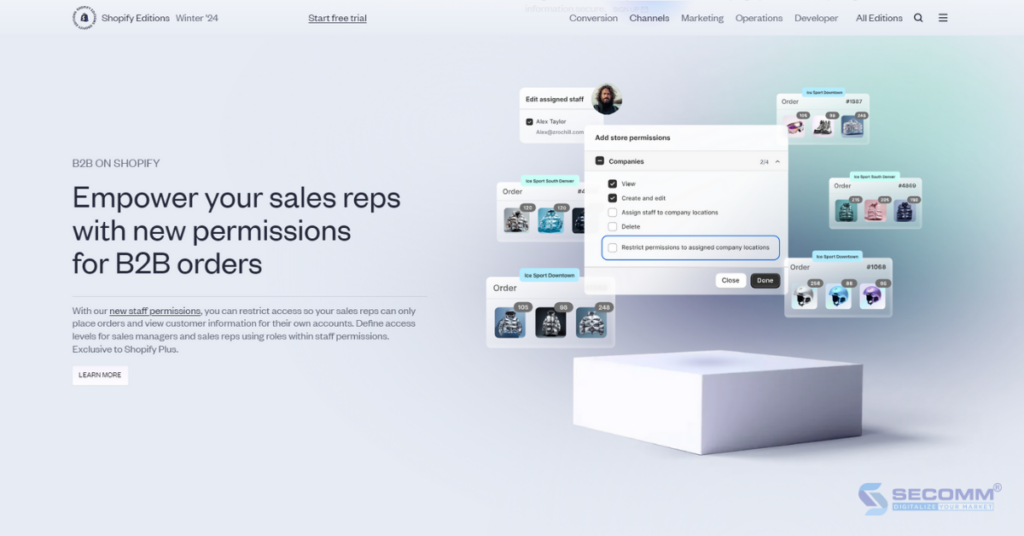
Best for: All the ‘Plus’ plan B2B merchants
Bobby Morrison, Shopify’s Chief Revenue Officer, confidently states that B2B is the next big opportunity for businesses of all sizes in 2024 and beyond.
Since the launch of the B2B solution, the platform has consistently rolled out updates to enhance this solution. In this particular update, Shopify focuses on upgrading the flexible infrastructure to help businesses optimize operations and deliver a unique customer experience.
- Go headless with B2B: Build a unique eCommerce experience by using your favourite tech stack with a Headless B2B storefront.
- Sales Rep permissions: Your sales reps can only place orders and view customer information for their own accounts.
- B2B discount: Create promotional discounts just for your B2B customers using third-party or custom apps powered by Shopify Functions.
- B2B digital products: Beyond physical products, ‘Plus’ merchants now can offer non-physical products, like digital downloads, warranties, and services
Shopify POS
Best for: All retail merchants, including merchants not on Shopify
In Editions Winter ’24, the POS solution has been fine-tuned and improved, addressing some minor issues and simplifying the experience for sellers. Among these enhancements, two new top-notch features are POS Terminal and POS Ship From Store.
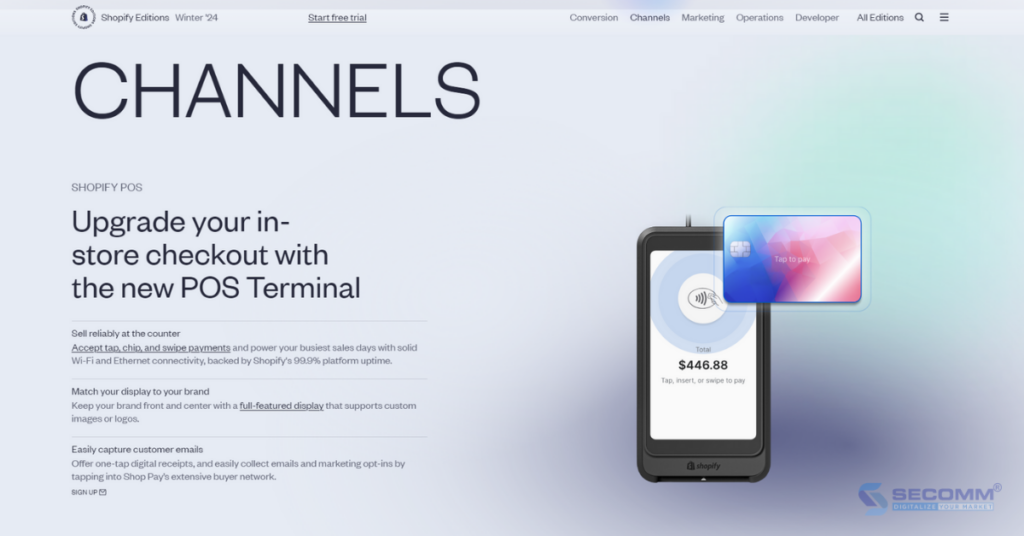
Shopify POS
POS Terminal
Accept tap, chip, and swipe payments and power your busiest sales days with solid Wi-Fi and Ethernet connectivity, backed by the 99.9% platform uptime.
- Match your display to your brand: Display custom images and logos throughout the checkout process to maintain consistency and a seamless brand presence during payment.
- Capture customer emails: Offer one-tap digital receipts and easily collect emails and marketing opt-ins
- Manage UI extensions: Allow retailers to manage and customize UI extensions at various retail locations through the admin.
- Customized receipts: The new Liquid code editor for printed receipts is an easy-to-use editor that customizes the presentation of printed receipts, so they can reflect your brand.
POS Ship From Store
Assigned staff members can easily process orders directly in POS at multiple retail locations. They can view, pick up, pack, and fulfil orders through the new feature, POS Ship From Store.
- Retail inventory transfers: Optimize inventory management, allowing easy tracking and control of shipments between retail locations directly within Shopify POS.
- Attribute online sales: The Send Cart feature can incentivize staff to close more online sales and boost credit points, as those online sales will be credited to each staff member’s retail location.
- Return process: Simplify the return process with pre-defined return reasons in POS, ensuring efficiency in handling returns and improving product replenishment through return reason reports.
- Manage taxes, cancel orders, and void payments: Shopify Tax is now supported in POS, so your retail sales can be accurately taxed at the same rate as your online store. You can also cancel and void orders within 15 minutes of completing a transaction to correct errors or return payments without incurring transaction fees.
- Enhanced security: Implement a 4-, 5-, or 6-digit PIN code to manage employee access at retail locations and enhance security.
Checkout Extensibility
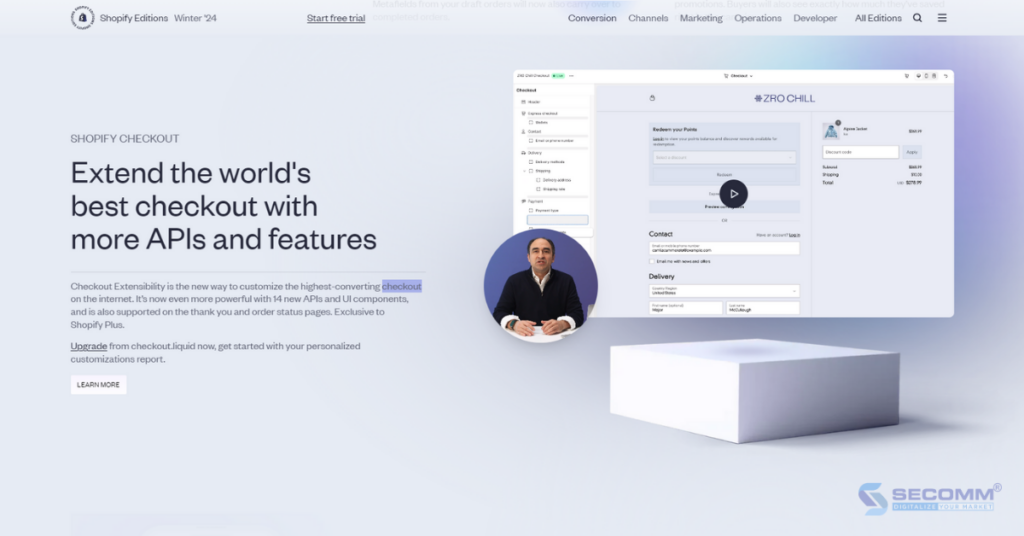
Checkout ExtensibilityBest for: all Shopify merchants
The checkout page also significantly shapes the customer experience. Therefore, in this Shopify Editions Winter ’24 update, numerous changes and improvements will be introduced to help businesses optimize the payment process and enhance conversion rates.
- Customer account extensibility: Build extensions directly into new customer accounts with the same UI components as Shopify Checkout, alongside new components, extension APIs, and external network calls. Bring apps closer to customers and add powerful functionality to new customer accounts
- Checkout extensibility: The platform adds 14 new APIs and 90+ new apps for the customized payment experience unlocking powerful features such as Upsells, Cross-sells, Loyalty Programs, Post-pushase surveys, and more.
- Checkout Sheet Kit: This kit enables seamless checkout from the web to the native mobile app, improving conversion rates. It is compatible with both iOS and Android operating systems.
AI
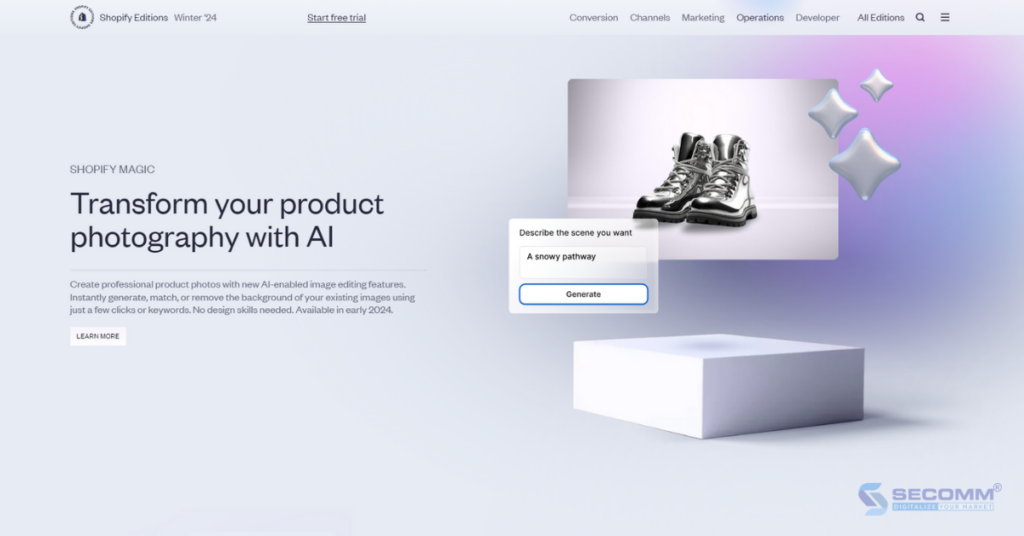
AIBest for: All Shopify merchants
AI technology is currently significantly boosting the performance and operational efficiency of individuals and businesses in the eCommerce sector. The Shopify Magic solution integrates free AI-supported features across the entire platform.
- Produce images: Create professional product photos with new AI-enabled image editing features. Instantly generate, match, or remove the background of your existing images using just a few clicks or keywords. No design skills needed
- Semantic Search: One of our new AI-powered storefront search features goes beyond keyword matching to better understand the intent behind a customer’s search. Customers can use more natural words and phrases and get richer, more relevant results.
- Sidekick: This is an AI assistant who is always available whenever you need it. Sidekick will act as your very own advisor, guiding you with tailored, skilled advice to strengthen your business.
Product variant Limits Increase
Best for: All Shopify merchants with a high number of product variants, especially enterprises and B2B brands.
Shopify has released new product APIs that allow increasing the limit to 2000 variants per product. Compared to the previous Shopify Editions Summer ’23, the product variant limit was only up to 100. This change in the product variant limit is a groundbreaking improvement, making it an ideal choice for businesses intending to switch from platforms like Magento or Salesforce Commerce Cloud.
Similarly, this enhancement also brings many benefits for B2B merchants.
Final Thoughts
The features and improvements in the Editions Winter ’24 demonstrate that Shopify has invested significantly in research to create solutions tailored to the needs of large businesses. These are just a few of the many enticing updates from Shopify in this release.
To delve deeper into Editions Winter ’24 and discuss your eCommerce website deployment plans on the Shopify platform, contact SECOMM or call the hotline at (+84)28 7108 9908 today for detailed advice!
 2
2

 666
666

 0
0

 1
1

THE 8 BEST CONSUMER ELECTRONICS WEBSITES IN AUSTRALIA
In recent years, the online consumer electronics industry in Australia has seen unprecedented growth. According to IBISWorld, the revenue for this sector reached $5.3 billion in 2023, with a compound annual growth rate (CAGR) of 15.7% over the past 5 years.
Let’s explore the websites of 8 consumer electronics brands that have significantly contributed to the industry’s development through optimized online shopping experiences tailored to the satisfaction of Australian customers.
Samsung
When mentioning Samsung, people immediately think of cutting-edge smartphones and tablets. However, this tech giant doesn’t stop there. Other products like smart TVs and home appliances are also particularly favoured by global consumers.
In Australia, Samsung’s eCommerce website is the ideal online shopping destination for consumer electronics. With a modern, user-friendly interface and smooth navigation, the website provides customers with a seamless experience in every aspect of browsing, product exploration, and payment.
Additionally, the website features a dedicated section called #Explore, offering numerous shares and helpful tips to sync with modern life.
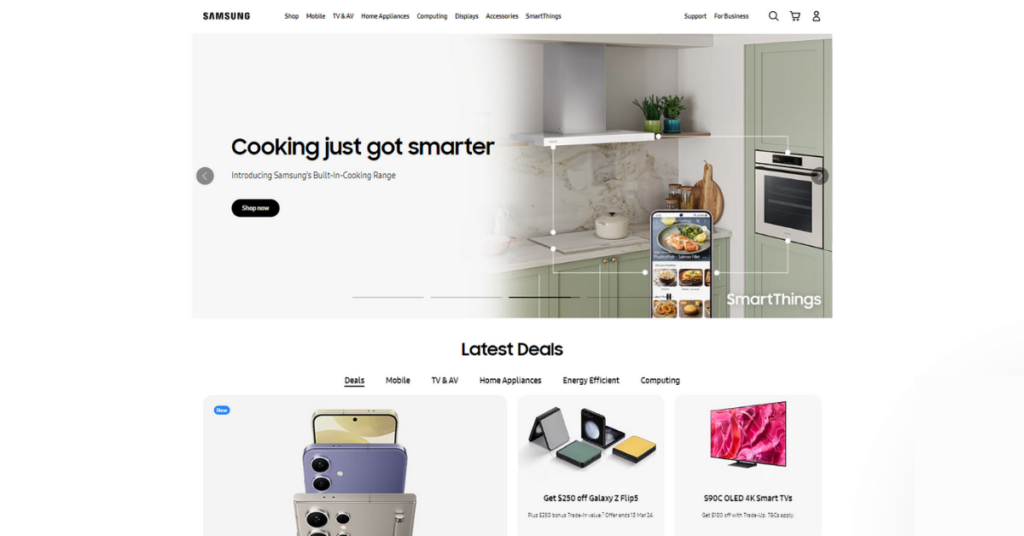
- Website: https://www.samsung.com/au/
- Programming language: Java
- Traffic: 3.6 B/month
- Ranking: #100 (Australia) & #34 (Global)
Apple
Apple’s website is also the preferred shopping destination for Australian consumers, alongside its nationwide chain of offline stores. With the perfect blend of elegant design and cutting-edge technology, this website is not just a place to explore and purchase high-quality Apple products but also an immersive experience in modernity and luxury.
Additionally, exclusive policies and top-notch customer service contribute to Apple maintaining a large base of loyal customers in Australia and worldwide.
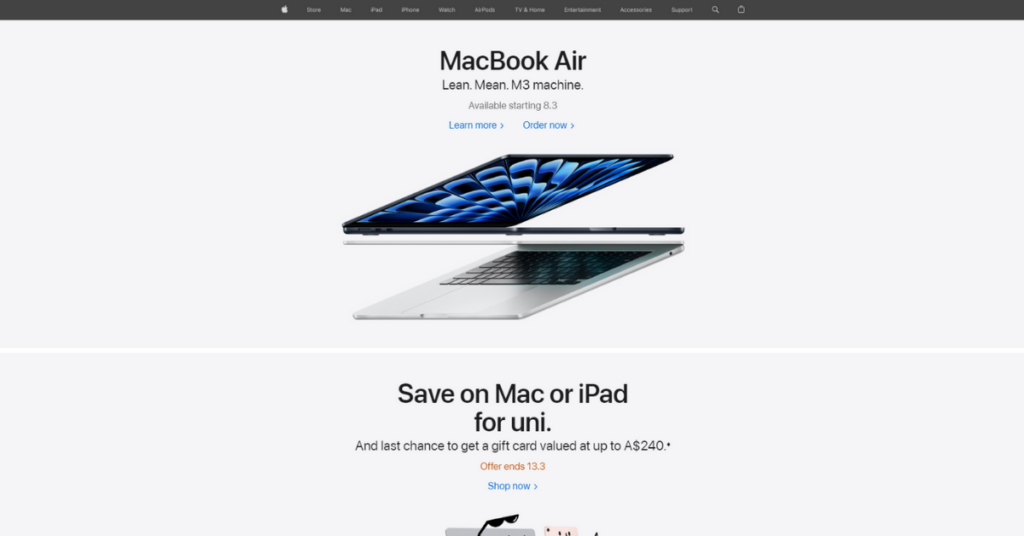
- Website: https://www.apple.com/au/
- Framework: Next.js
- Traffic: 1.4 B/month
- Ranking: #77 (Australia) & #85 (Global)
JB Hi-Fi
JB Hi-Fi is a consumer electronics brand in Australia that has gained worldwide recognition after more than 50 years of operation. In addition to investing in marketing and sales operations in its chain of offline stores across Australia, JB Hi-Fi’s eCommerce website is also given significant attention.
With a user-friendly and easy-to-navigate interface, JB Hi-Fi’s website enables consumers to easily search for and choose from thousands of products. Competitive pricing policies and excellent customer service are the factors that JB Hi-Fi consistently commits to, aiming to provide the best online shopping experience for Australian customers.
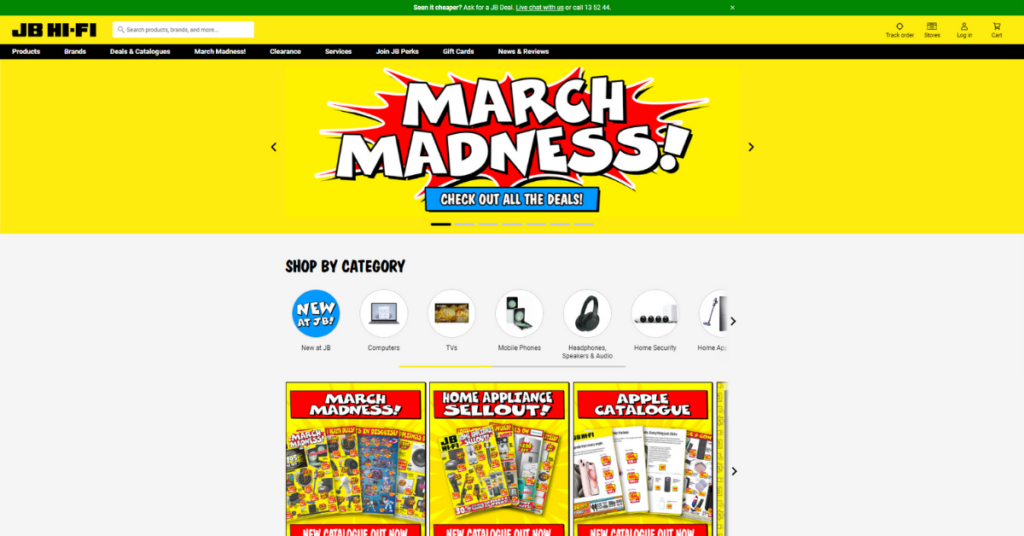
- Website: https://www.jbhifi.com.au/
- Platform: Shopify Plus
- Traffic: 63.75 M/month
- Ranking: #57 (Australia) & #3,113 (Global)
The Good Guys
The Good Guys is a prominent and reputable name in the Australian consumer electronics market. Over the years, they have built up a vast product portfolio, including TVs, refrigerators, laptops, audio devices, and washing machines from leading global brands.
Attentive customer care services have also been a positive aspect that has earned The Good Guys favour among Australian consumers for many decades.
The Good Guys’ consumer electronics website allows customers to conveniently shop with a diverse range of choices. Additionally, attractive promotions and deals are regularly applied to attract customers. Furthermore, this retailer has implemented a Loyalty Program to satisfy their loyal customers.
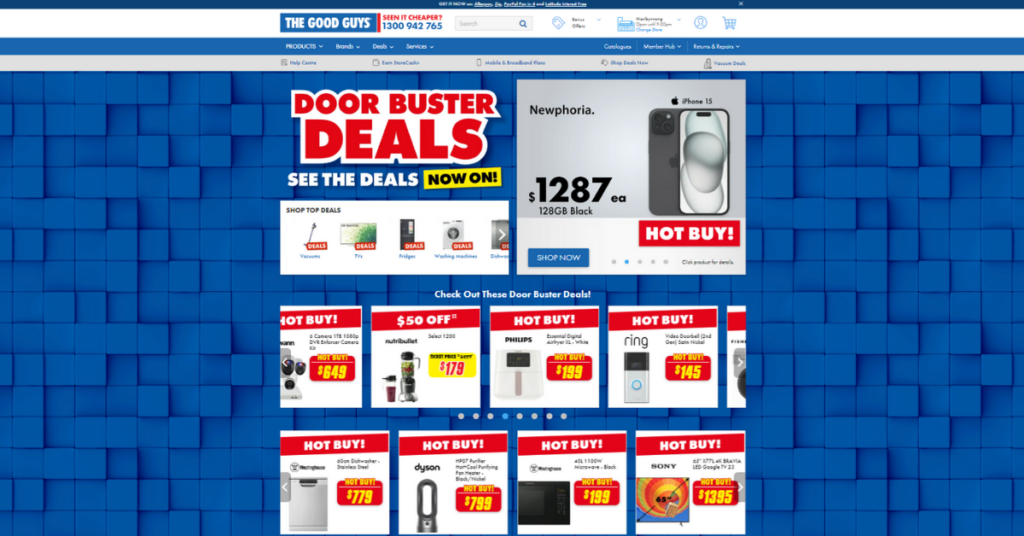
- Website: https://www.thegoodguys.com.au/
- Platform: HCL Commerce
- Traffic: 21.98 M/month
- Ranking: #146 (Australia) & #10,171 (Global)
Appliances Online
The Appliances Online consumer electronics website is considered a paradise where customers can find the most suitable items for their needs and budget. The intuitive website interface makes it easy for customers to search for and compare products, providing detailed information and user reviews to help them make informed purchasing decisions.
Appliances Online also offers various attractive customer services such as free shipping, product trade-ins and recycling, and 24/7 support via a hotline. The flexible payment methods are also an advantage of this retail site, allowing customers to choose between credit cards, electronic wallets, or instalment payments with a Buy Now Pay Later option.
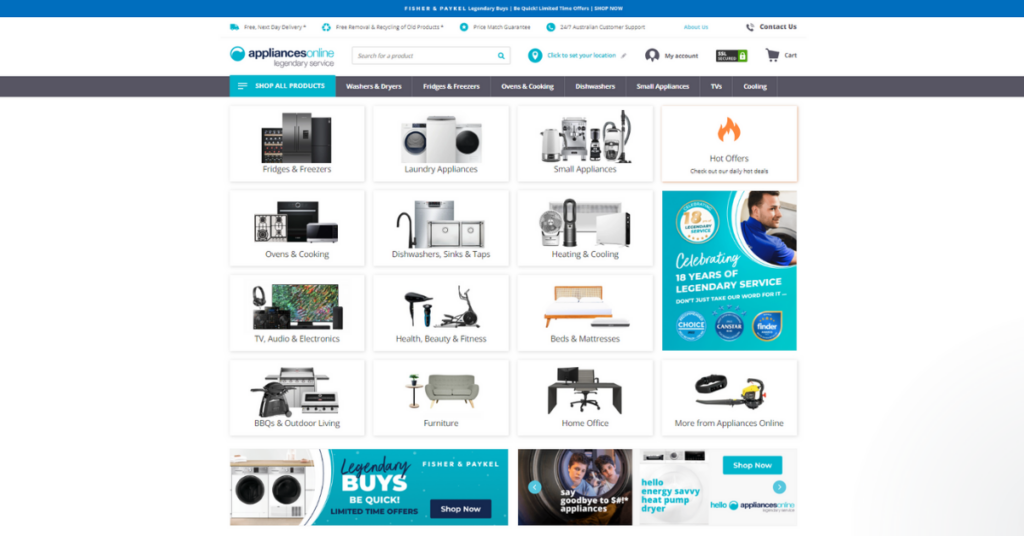
- Website: https://www.appliancesonline.com.au/
- Programming language: TypeScript
- Traffic: 7.6 M/month
- Ranking: #341 (Australia) & #23,769 (Global)
Dick Smith
Since its launch in 1968, Dick Smith has firmly established its position in the Australian consumer electronics market. In its early years, Dick Smith focused on providing electronic products and components. It quickly expanded its product portfolio from electronics and home appliances to computers, mobile phones, cameras, tech toys, and other technology and entertainment-related items.
Dick Smith has invested in building an eCommerce website with advanced features on the Magento platform. The intuitive and user-friendly interface of the Dick Smith website makes it easy for Australian consumers to search for and compare products, as well as enjoy special offers and attractive discounts.
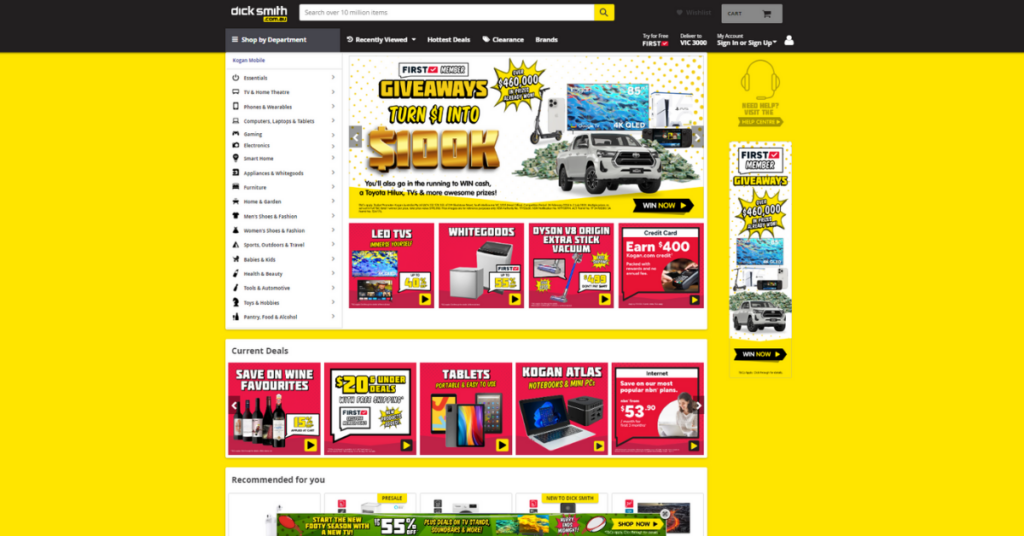
- Website: https://www.dicksmith.com.au/da/
- Platform: Magento Open Source
- Traffic: 4.2 M/month
- Ranking: #788 (Australia) & #46,940 (Global)
Jaycar Electronics
With a simple yet effective mission to provide a convenient and quality shopping experience, Jaycar Electronics has quickly become a reliable companion for Australian consumers. Jaycar Electronics offers a diverse range of products, including printers, USB ports, audio speakers, solar energy batteries, security cameras, and smart home products.
Jaycar Electronics’s eCommerce website is designed for easy navigation, allowing customers to quickly find and view products by category. The checkout process is also streamlined to shorten the payment process and reduce cart abandonment rates.
Additionally, customers have various shopping options, such as online purchases, in-store pickup, online purchases with free delivery, and buy now pay later. Jaycar Electronics has also introduced a Loyalty program to encourage customers to shop with exclusive benefits.
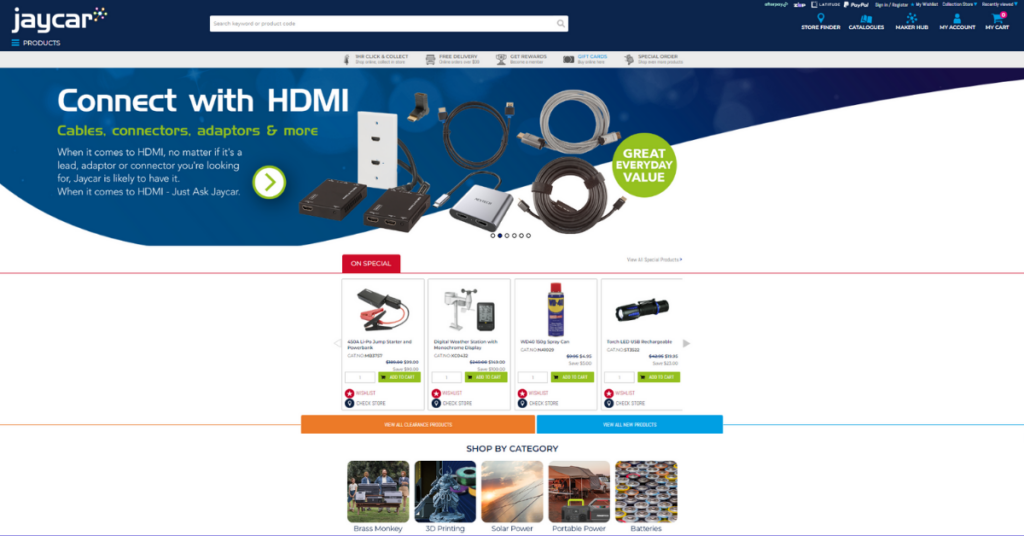
- Website: https://www.jaycar.com.au/
- Platform: SAP Commerce Cloud
- Traffic: 3.9 M/month
- Ranking: #639 (Australia) & #44,172 (Global)
Centre Com
After many years of operation, Centre Com is recognized as one of the leading destinations where consumers can experience diversity and quality across a range of products. Centre Com’s consumer electronics website offers products such as PCs, laptops, CPUs, keyboards, cables, and audio speakers.
The website has been developed and customized with many advanced features to make searching, browsing, ordering, and payment easier.
When it comes to payment, the brand applies Buy Now Pay Later options with Afterpay and Zip, in addition to traditional payment methods, providing customers with more choices and flexibility without hesitation when making purchases.
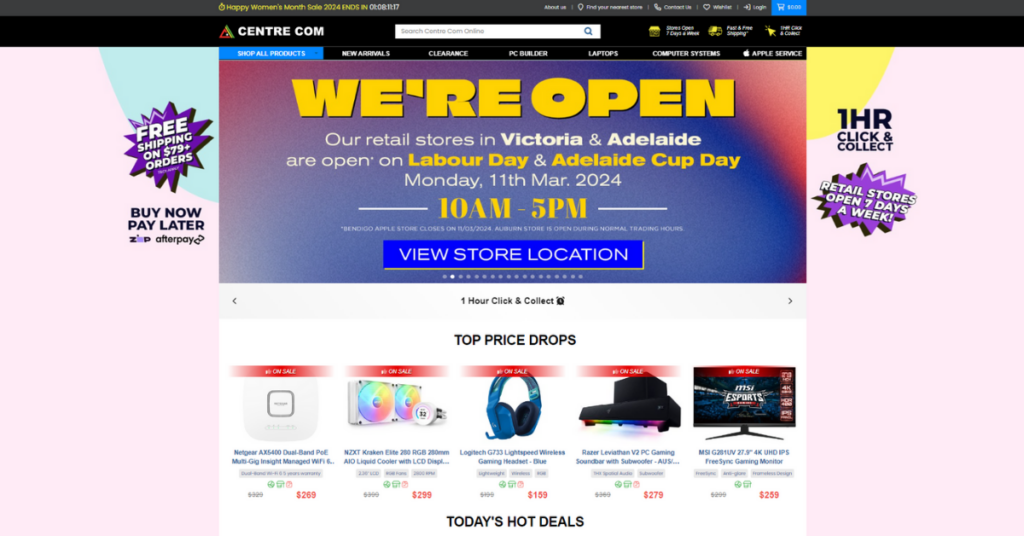
- Website: https://www.centrecom.com.au/
- Framework: Vue.js
- Traffic: 3.7 M/month
- Ranking: #680 (Australia) & #45,715 (Global)
Build your first consumer electronics website today!
Here are the top 10 consumer electronics websites in Australia. By deploying superior platforms such as Magento, Shopify Plus, and SAP, these brands have provided an optimal online shopping experience and successfully captivated both local and international consumers.
Throughout years of development, SECOMM and many Australian clients have collaborated to create proud eCommerce websites. Projects with Laybyland, Jasnor, Rod Shop, and others stand out.
Contact SECOMM or call directly at hotline 028 7108 9908 to start today!
 2
2

 834
834

 0
0

 1
1

THE 8 BEST COSMETICS ECOMMERCE WEBSITES IN AUSTRALIA
Cosmetics eCommerce in Australia has experienced significant growth and reached a total revenue milestone of 2.9 billion USD in 2023. The COVID-19 pandemic has accelerated the shift towards online shopping for beauty products in Australia.
Consumers are increasingly comfortable purchasing cosmetics online, with over 2,425 online businesses providing beauty products from various brands.
Let’s explore 8 of Australia’s most renowned cosmetic retail brands and how they solidify their positions through custom-developed eCommerce websites designed to enhance the overall customer experience.
Priceline
Priceline is not only a leading destination for cosmetics shopping but also a reliable address for those seeking professional skincare advice. This brand has secured a significant position in the Australian cosmetics market, known for organizing informative events and courses to provide customers with beauty knowledge and help them choose the right products for their skin.
Priceline’s eCommerce website, with its user-friendly interface, easy navigation, and smart search features, enables customers to find and purchase products effortlessly. Additionally, the loyalty programs and promotions are chosen by Priceline to satisfy current customers and attract more potential customers.
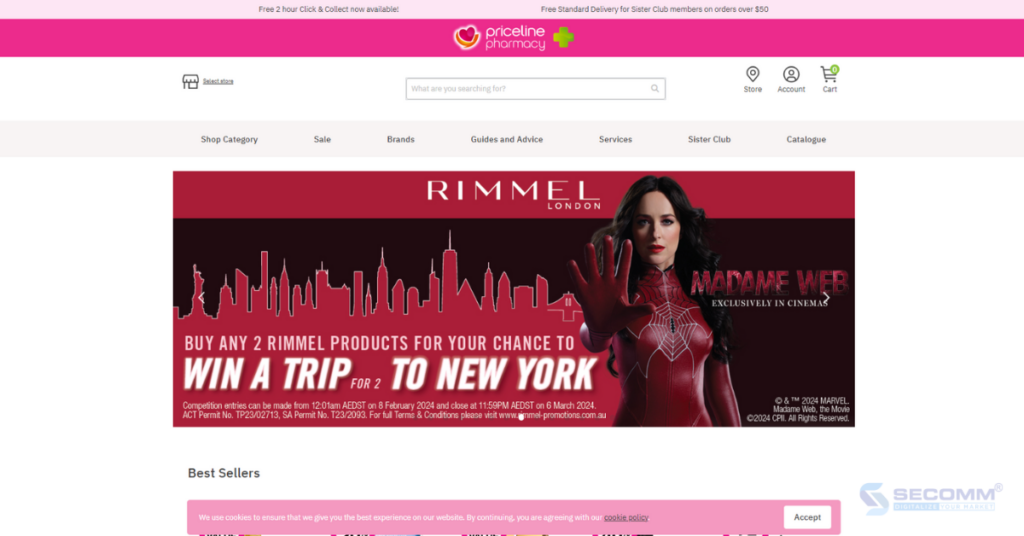
- Website: priceline.com.au
- Platform: SAP Commerce Cloud
- Traffic: 10.6 M/month
- Ranking: #208 (Australia) & #14,642 (Global)
Adore Beauty
Popular across Australia, Adore Beauty offers a diverse range of quality products from many leading cosmetic brands, providing customers with a comprehensive and unique online shopping experience. Adore Beauty invests in the customer experience on both its eCommerce website and customized mobile app to cater to various operating systems and screen sizes.
Adore Beauty also stands out by providing special features like “Adore Beauty IQ,” an intelligent personal advisory tool based on user skin information and personal preferences. This helps customers choose products that meet their skincare and beauty needs.
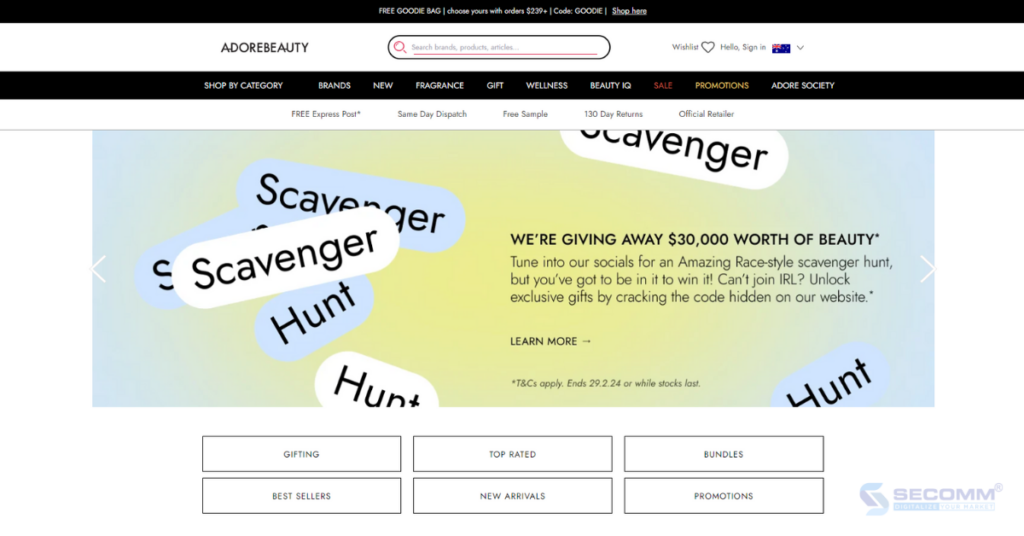
- Website: https://www.adorebeauty.com.au/
- Platform: BigCommerce
- Traffic: 7.5 M/month
- Ranking: #514 (Australia) & #30,211 (Global)
Sephora
The world’s leading cosmetics retailer, Sephora, has established a strong presence in the Australian market. With a diversity of brands and personal care products, Sephora is not just a cosmetics shopping destination but also a place to experience the latest beauty trends.
A unique feature on Sephora’s website is the “Virtual Artist,” a virtual reality technology that allows users to try cosmetics online on their faces through a webcam or personal photo. This helps customers better understand how the products will look on their skin before making a purchase.
Sephora’s loyalty program, called Sephora Beauty Pass, offers many attractive benefits for its members. Members have the opportunity to get new products before the launch date, earn points with each purchase, and gain access to exclusive events. The point system also allows users to accumulate points and exchange them for special discounts and free products.
Thanks to this loyalty program, Sephora has built a strong community of beauty enthusiasts and encourages customer loyalty.

- Website: https://www.sephora.com.au/
- Platform: PHP programming language
- Traffic: 6.7 M/month
- Ranking: #330 (Australia) & #23,662 (Global)
Lila Beauty
Lila Beauty has gained the trust of consumers and maintained its position in the Australian beauty industry through a diverse product portfolio that includes cosmetics, skincare, hair care, and beauty tools from prominent brands in South Korea and Japan.
In addition to unique features integrated into the eCommerce website, Lila Beauty offers attractive deals and promotions, notably the E-gift card. Lila Beauty’s E-gift cards are not just an excellent way to gift loved ones and friends but also provide a flexible shopping experience for the recipients.
Customers can easily choose the gift card value and send it via email, creating a convenient way to share the joy of beauty.
Another distinctive aspect of the brand is the Lila Beauty Wholesales (B2B) program, offering excellent collaboration opportunities for businesses and beauty professionals. This program provides high-quality wholesale solutions with discounted prices targeting retailers, spas, and other business partners.
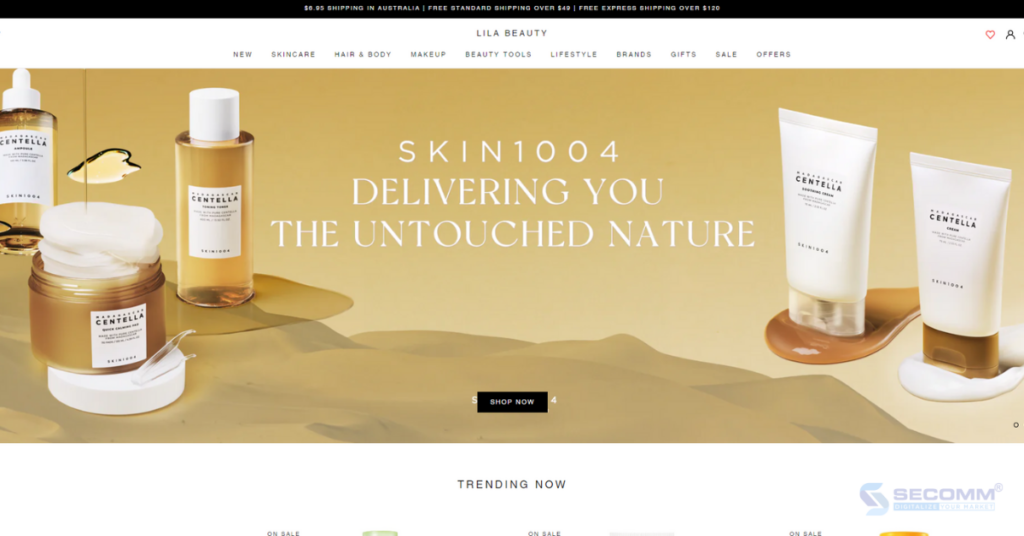
- Website: https://lilabeauty.com.au/
- Platform: Shopify
- Traffic: 2 M/month
- Ranking: #750 (Australia) & #48,383 (Global)
W Cosmetics
The W Cosmetics chain of beauty stores is a prominent name in the Australian market and has rapidly expanded to a total of 21 stores. This brand appeals to various customer segments by offering a diverse range of beauty and personal care products from major Japanese and Korean brands.
W Cosmetics’ eCommerce website for cosmetics is a frequently visited destination for Australian consumers, thanks to its optimized shopping experience and excellent customer service. The Store Locator feature is a unique point that helps customers easily identify and locate the nearest stores or retail outlets.
Additionally, customers can seek remote assistance or advice through email, live chat, and the We Chat messaging app.
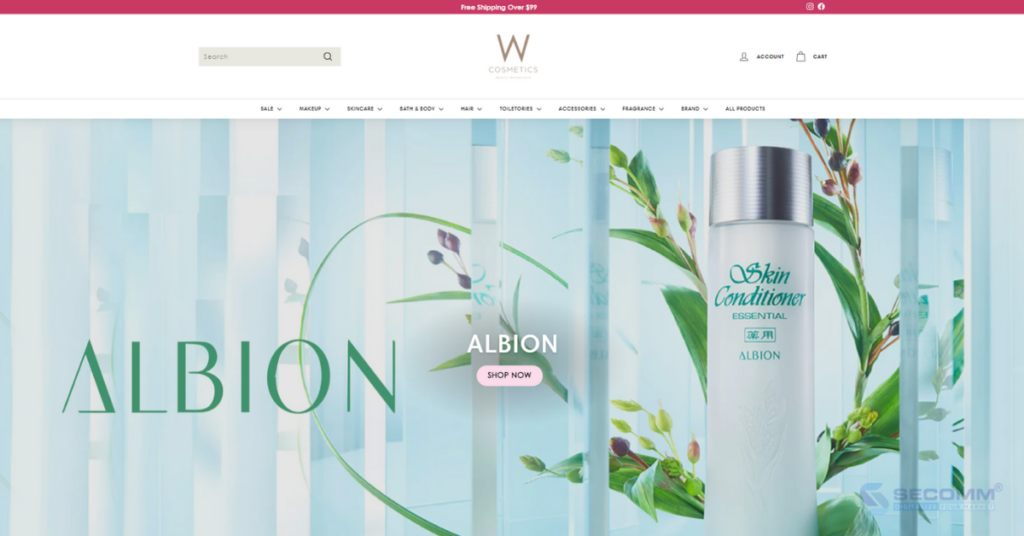
- Website: https://www.wcosmetics.com.au/
- Platform: Shopify Plus
- Traffic: 1.8 M/month
- Ranking: #1,472 (Australia) & #98,043 (Global)
Oz Hair and Beauty
After more than 12 years in the market, Oz Hair and Beauty has become a go-to destination for beauty enthusiasts across Australia. Oz Hair and Beauty focuses on providing hair care and beauty products for both men and women.
The eCommerce website is not only a place to shop for beauty products online but also a hub for staying updated on the latest beauty knowledge and trends. Additionally, this retail brand has implemented a loyalty program in the form of a tiered system called Oz World, allowing customers to accumulate points and receive exclusive benefits when participating.
The Virtual Beauty Consultation service from Oz Hair and Beauty is a crucial part of delivering a personalized shopping experience for customers. Customers can seek professional advice on hair care and beauty through online consultations, helping them choose products tailored to their specific needs.
This reflects Oz Hair and Beauty’s commitment to meeting and exceeding customer expectations in the beauty and hair care industry.
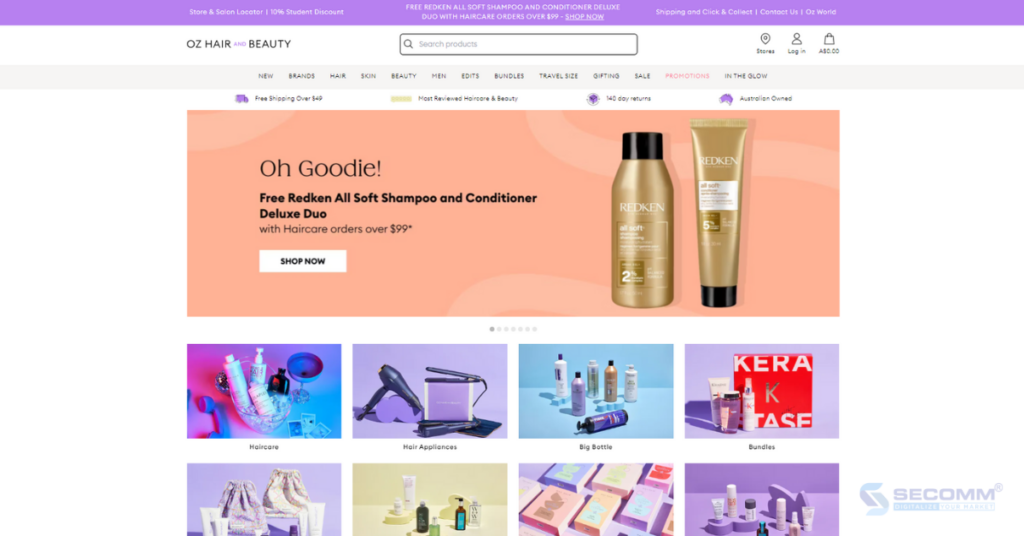
- Website: https://www.ozhairandbeauty.com/
- Platform: Shopify Plus
- Traffic: 1.4 M/month
- Ranking: #1,837 (Australia) & #104,733 (Global)
Nudie Glow
The retailer Nudie Glow specializes in providing beauty products from local Australian, Japanese, and Korean brands. Gaining consumer trust through excellent service and quality products, Nudie Glow has gradually established a strong position in the Australian beauty and cosmetics market.
Nudie Glow’s eCommerce website is intelligently designed and user-friendly. The website not only provides a convenient online shopping experience but also serves as a reliable source of information on new trends, beauty tips, and success stories from the beauty community.
Nudie Glow’s wholesale program is an excellent opportunity for business partners, to offer high-quality wholesale solutions at discounted prices, facilitate brand expansion, and create long-term collaboration opportunities.
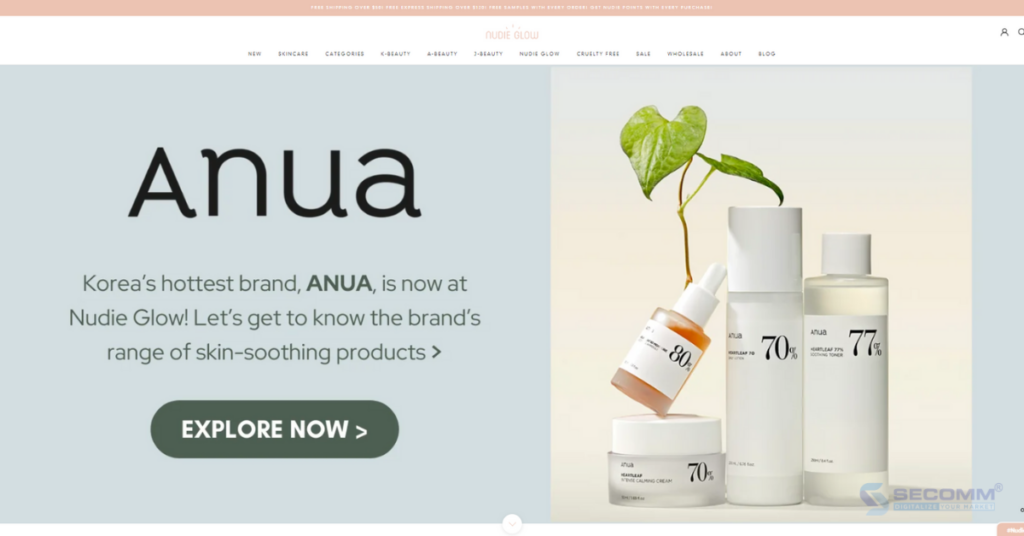
- Website: https://nudieglow.com/
- Platform: Shopify Plus
- Traffic: 907 K/month
- Ranking: #2,764 (Australia) & #169,458 (Global)
Mecca
Mecca’s cosmetic, hair care, and personal care products are not only designed for female customers but are also the top choice for gentlemen. The brand has created an exclusive product line named MECCA COSMETICA and MECCA MAX.
Additionally, for professional medical-standard skincare advice and treatment, customers can avail themselves of the MECCA Aesthetica service with transparent and clear pricing.
MECCA also implements a customer membership program, allowing members to earn points with their purchases for gift redemptions and exclusive discounts on special occasions.

- Website: https://www.mecca.com/en-au/
- Platform: PHP programming language
- Traffic: 466 M/month
- Ranking: #20,437 (Australia) & #853,487 (Global)
Xây dựng website thương mại điện tử mỹ phẩm ngay hôm nay!
Trên đây là 8 website thương mại điện tử mỹ phẩm được yêu thích hàng đầu tại Úc, mỗi trang web đều mang đến những trải nghiệm mua sắm độc đáo và đa dạng.
Trong nhiều năm qua, SECOMM nổi bật với bề dày kinh nghiệm hợp tác nhiều doanh nghiệp Úc để cùng xây dựng nên những website thương mại điện tử tuỳ chỉnh, đáp ứng tốt đặc thù của mỗi ngành công nghiệp.
Nếu doanh nghiệp đang tìm kiếm một đối tác đáng tin cậy để phát triển và tối ưu hóa website thương mại điện tử của mình, hãy liên hệ ngay với SECOMM hoặc gọi (+84)28 7108 9908 ngay hôm nay!
Build your first cosmetics eCommerce website today!
Above are the top 8 favorite cosmetics eCommerce websites in Australia, each providing unique and diverse shopping experiences.
For many years, SECOMM has stood out with its extensive experience collaborating with numerous Australian businesses to create custom eCommerce websites that cater well to the specific needs of each industry.
If you’re looking for a reliable partner to develop and optimize its eCommerce website, contact SECOMM today at (+84)28 7108 9908!
 3
3

 995
995

 0
0

 1
1

THE 8 BEST WINE ECOMMERCE WEBSITES IN AUSTRALIA
The wine eCommerce industry in Australia is rapidly growing and has the potential for further expansion in the future. According to IBISWorld, the revenue for this sector is projected to surpass $374 billion by 2023, with an annual growth rate of 10.51%.
Let’s explore the websites of the 8 most beloved liquor brands in Australia that have contributed to driving the growth of wine eCommerce in this market.
Dan Murphy’s
Dan Murphy’s is a retail brand specializing in the sale of top-quality wines and alcoholic beverages in Australia. With a history of over 60 years in operation, Dan Murphy’s has built a strong reputation within the Australian consumer community.
Through its chain of traditional stores and eCommerce website, Dan Murphy’s enables customers to shop with a wide range of options and convenience.
The eCommerce website of Dan Murphy’s is where customers can experience easy and flexible online shopping. With a user-friendly interface, the website provides detailed product information, consumer reviews, and attractive promotional programs.
Customers can enjoy a comfortable and secure shopping experience with assurance regarding the quality and origin of products from this reputable brand.
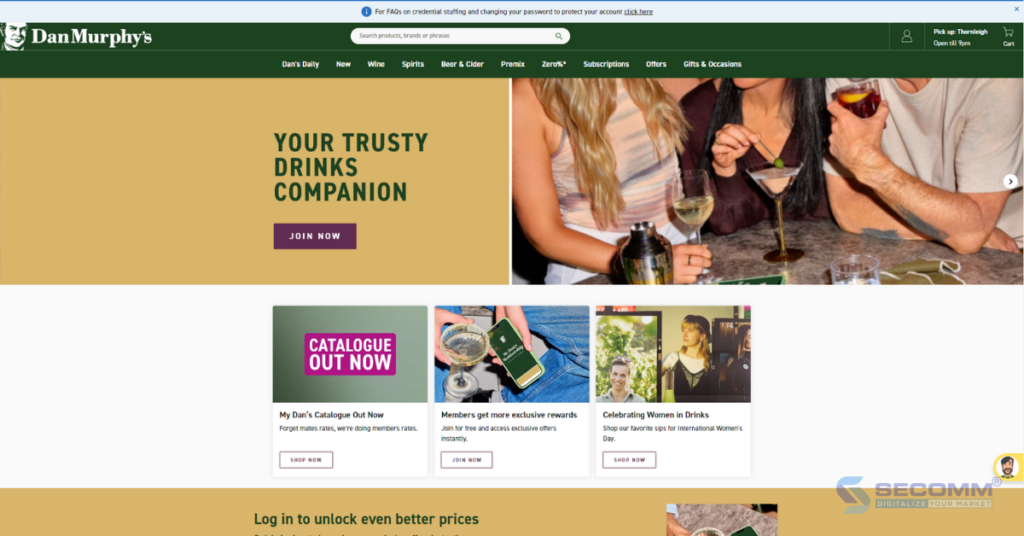
- Website: danmurphys.com.au
- Platform: PHP programming language
- Traffic: 4.1 M/month
- Ranking: #216 (Australia) & #15,233 (Global)
BWS
BWS is known as a leading alcohol retail brand in Australia. The brand is renowned for its diverse product portfolio, including wines, domestic and international beers, as well as various spirits from around the world.
BWS’s wine eCommerce website provides a convenient and flexible online shopping experience. In addition to offering detailed product information and prices, the website incorporates various special features. These include exclusive promotional programs, consumer reviews, advanced search options, and one-page checkout.
In addition to the eCommerce website, BWS has developed a mobile app, allowing customers to shop conveniently anytime, anywhere.
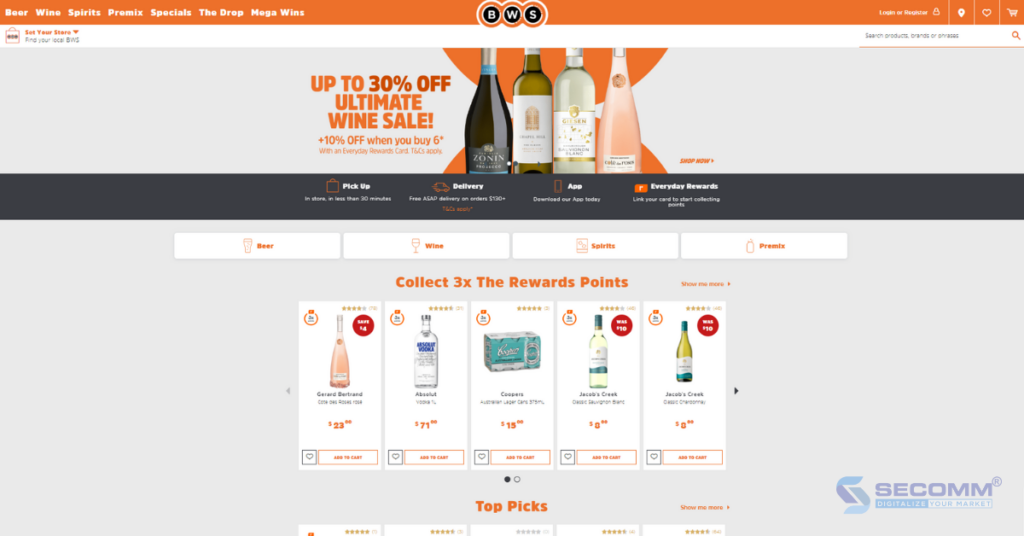
- Website: https://bws.com.au/
- Platform: PHP programming language
- Traffic: 1.8 M/month
- Ranking: #517 (Australia) & #35,725 (Global)
Liquorland
Liquorland is one of the prominent names in the alcohol retail market in Australia. With over 700 stores spread across the country, Liquorland has established a strong presence in the market and has become a favorite destination for those who appreciate fine wines and exceptional beverages.
Liquorland not only focuses on providing quality products but also emphasizes a comfortable and friendly shopping experience through its eCommerce website. The website is built with various unique features such as product filtering and search, displaying products by category, showcasing customer reviews, options for delivery and in-store pickup, and one-page checkout.
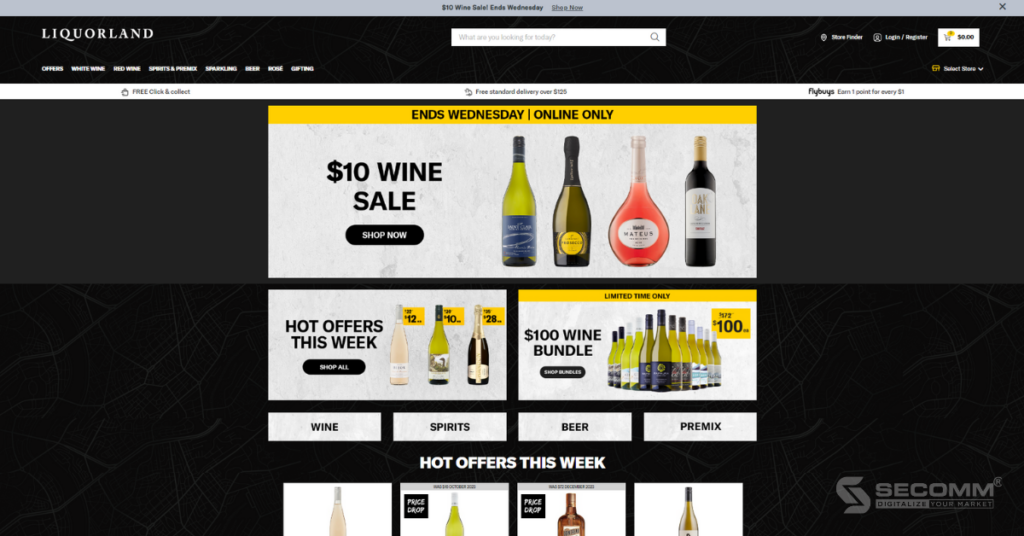
- Website: https://www.liquorland.com.au/
- Platform: PHP programming language
- Traffic: 1.1 M/month
- Ranking: #970 (Australia) & #61,597 (Global)
First Choice Liquor
The liquor and alcohol retail chain First Choice Liquor owns over 100 stores throughout Australia and is the choice of many consumers in the country. This retail brand offers a diverse range of products such as wines, spirits, beers, and various alcoholic beverages worldwide.
On the First Choice Liquor eCommerce website, customers can easily search, browse, and purchase products through a user-friendly and navigable interface. Several unique features are also integrated into the website to optimize the customer experience.
These include store locator functionality, choosing the nearest store, product filtering, and search, displaying detailed product information, one-page checkout, delivery and pickup options, and more.
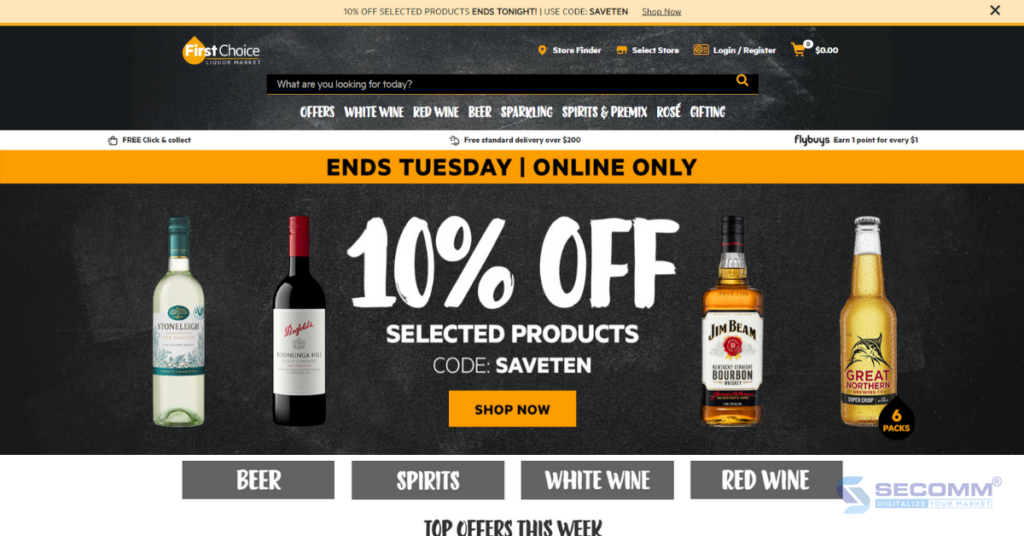
- Website: https://www.firstchoiceliquor.com.au/
- Platform: PHP programming language
- Traffic: 855.8 K/month
- Ranking: #1,065 (Australia) & #71,293 (Global)
Vinomofo
Vinomofo is a renowned wine brand from Australia with a simple yet powerful slogan, “Make wine fun.” This brand has created a passionate community around wine, where people can share and enjoy the collective enthusiasm for wine culture.
Vinomofo’s eCommerce website is built with advanced features such as product filtering and search, product previews, displaying detailed product information, showing related products, and one-page checkout. In addition, Vinomofo provides customers with a shopping policy that includes various payment methods and flexible return and exchange policies.
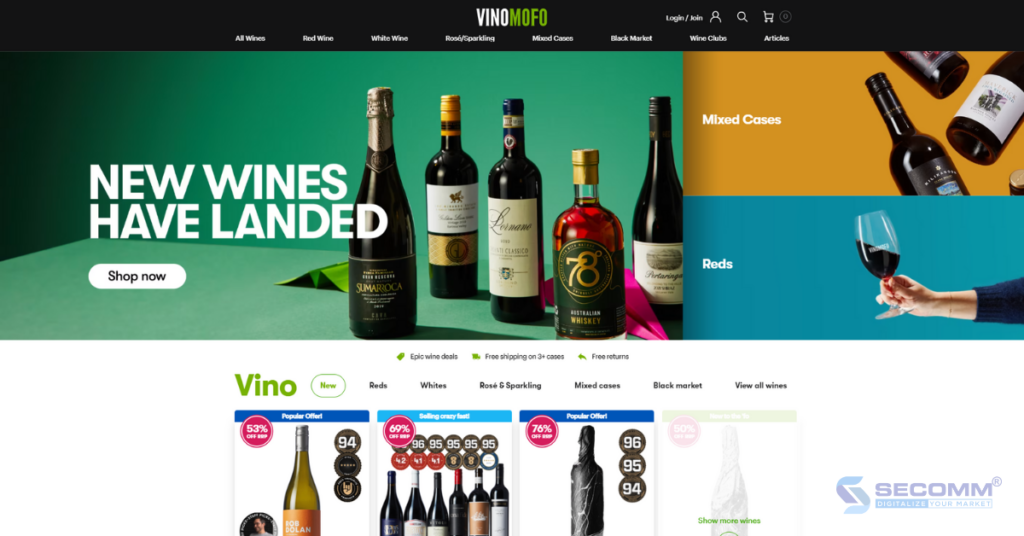
- Website: https://www.vinomofo.com/
- Platform: PHP programming language
- Traffic: 658.2 K/month
- Ranking: #3,615 (Australia) & #211,091 (Global)
Wine Direct
Wine Direct is known for its diverse product portfolio, ranging from classic wine bottles to the most modern and popular options in the market. The brand also stands out for its excellent customer service, providing detailed product information and post-purchase care to ensure maximum customer satisfaction.
Wine Direct’s website is designed to be modern and user-friendly, offering an easy and comfortable online shopping experience. The website not only provides comprehensive information about each wine bottle but also integrates features such as consumer reviews and special promotional programs.
With a strong presence in the Australian market, Wine Direct continues to be a trusted destination for those who love and appreciate the art of wine tasting.
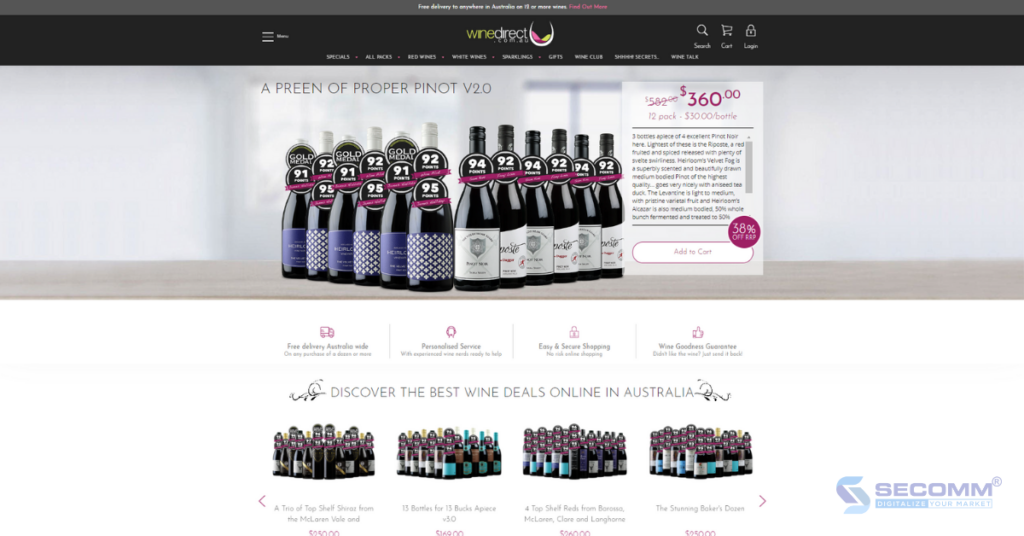
- Website: https://www.winedirect.com.au/
- Platform: Magento
- Traffic: 61.3 K/month
- Ranking: #22,045 (Australia) & #933,066 (Global)
Just Wines
With over a decade of experience, Just Wines has built a strong reputation for providing diversity and high quality to Australian consumers. What sets Just Wines apart is its focus on establishing direct connections with wine producers and top vineyards, ensuring a reliable supply of quality wines and diversity in the product catalog.
The brand takes pride in offering customers a wide selection, ranging from traditional wines to new and unique discoveries in the market.
Just Wines’ eCommerce website is designed to be simple and user-friendly, enabling consumers to easily search, compare, and conveniently purchase wines. Additionally, Just Wines implements a customer loyalty program with various exclusive deals and attractive promotions, creating favorable conditions for customers to enjoy wines at the best value.
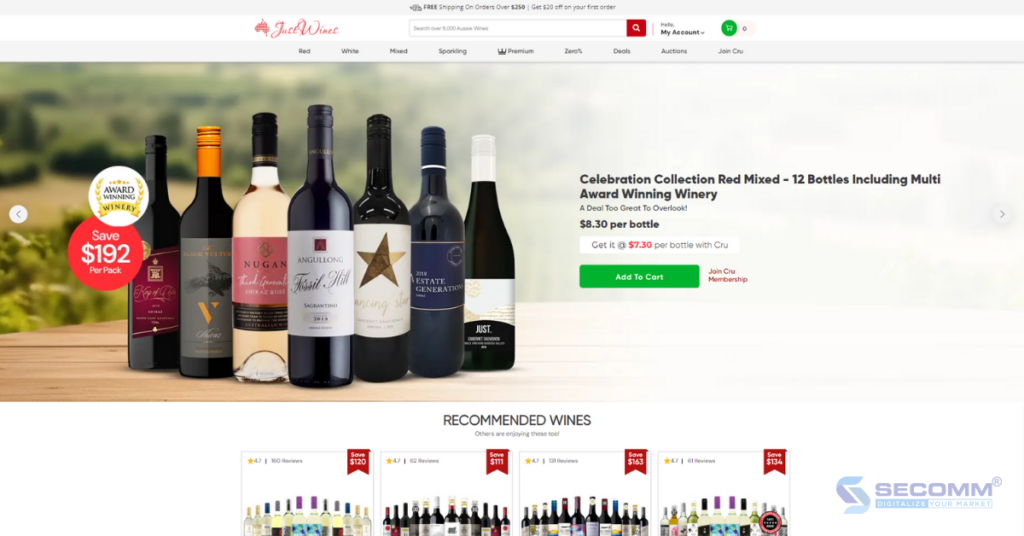
- Website: https://justwines.com.au/
- Platform: Magento
- Traffic: 39.9 K/month
- Ranking: #29,275 (Australia) & #1,121,766 (Global)
Trentham Estate
Trentham Estate is a renowned wine brand with a strong presence in the Australian market. With over three decades of history, Trentham Estate has played a significant role in the development and shaping of the Australian wine industry.
The brand is well-known for producing high-quality wines from renowned grape varieties cultivated in carefully tended vineyards. Trentham Estate is not just a winemaking facility but also a smart vineyard, overseeing the process from grapevines to wine barrels.
Trentham Estate’s eCommerce website is built with Magento, allowing customization of how product information is displayed, implementation of promotional programs, optimization of the payment process, and integration of various payment methods. This contributes to providing customers with a comprehensive and flexible online shopping experience.
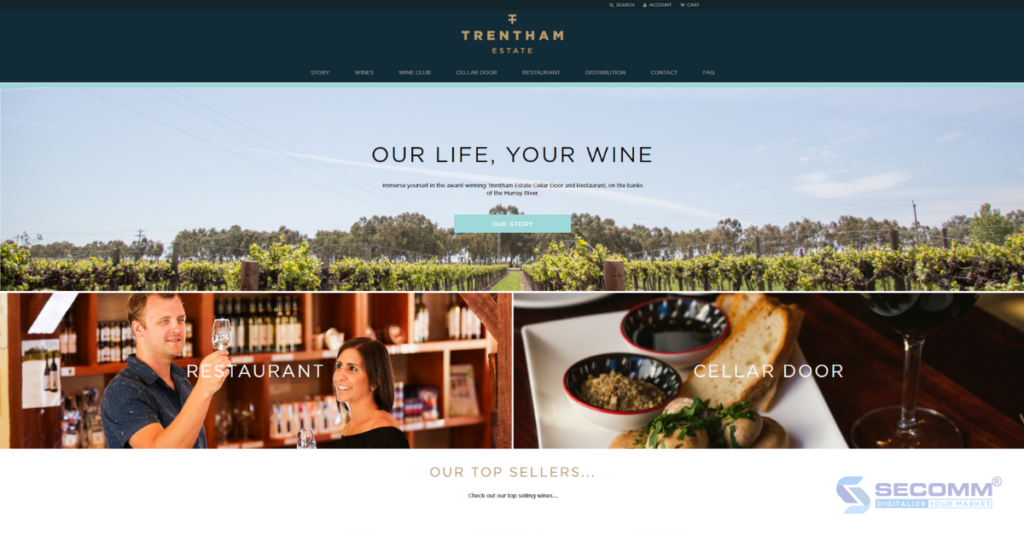
- Website: https://trenthamestate.com.au/
- Platform: Magento
- Traffic: 15.4 K/month
- Ranking: #295,266 (Australia) & #7,979,206 (Global)
Build your first wine eCommerce website today!
Above are 8 famous wine brands in Australia and how they have built and developed their eCommerce websites. This is clear evidence of the importance of having a professional and convenient online platform in the 21st century.
With extensive experience collaborating with various Australian clients, SECOMM has established itself as a trustworthy partner in constructing and evolving eCommerce initiatives. Notably, the SECOMM team has successfully implemented eCommerce systems for numerous wine businesses across different countries, including Trentham Estate, Thewarehouse, Ishopchangi, and more.
We comprehend the distinct requirements of businesses in the alcohol and beverage sector and are dedicated to delivering optimal solutions that enhance the online shopping experience and boost overall business efficiency.
If your business is in search of a professional partner to develop or enhance its eCommerce website, reach out to SECOMM or call (+84)28 7108 9908 today.
 2
2

 882
882

 0
0

 1
1

THE 10 BEST FASHION ECOMMERCE WEBSITES IN AUSTRALIA
Fashion eCommerce has been booming worldwide for many years, and Australia is no exception. According to IBISWorld, the online revenue for women’s fashion alone in the Kangaroo country reached over $1.8 billion in 2023, marking a 1.1% increase compared to the same period in 2022.
Let’s explore the top 10 most prominent fashion eCommerce websites in Australia.
The ICONIC
For a considerable period, The ICONIC eCommerce website has been recognized as a premier shopping hub for fashion enthusiasts in Australia and New Zealand. On this platform, shoppers can conveniently discover various products from well-known global brands like Levi’s, Adidas, Lacoste, Polo Ralph Lauren, and others.
The ICONIC website is designed to make it easy for customers to navigate products, make purchases, and track their orders. Beyond delivering a distinctive online shopping experience, The ICONIC also regularly updates fashion trends and provides valuable information for its customers.

- Website: https://www.theiconic.com.au/
- Platform: PHP programming language
- Traffic: 10.3M/month
- Ranking: 72 (Australia) & 4,157 (Global)
Cotton On
Established in 1991 in Australia, Cotton On offers a diverse range of fashion products for men, women, and children, including footwear, accessories, lingerie, and even home furnishings and interior decor in some stores. Cotton On has a widespread network of physical stores across the globe, including the UK, the US, and Canada.
Therefore, the brand has invested in an eCommerce website system to cater to various customer demographics in different markets. Additionally, Cotton On implements a customer loyalty program and various enticing promotional campaigns to attract and retain customers.

- Website: https://cottonon.com/AU/
- Platform: Salesforce Commerce Cloud
- Traffic: 9.2M/month
- Ranking: 144 (Australia) & 5,182 (Global)
Forever New
Established in 2006 in Australia, Forever New focuses on designing and producing women’s fashion collections, offering customers products with a luxurious and feminine style. Since then, the brand has rapidly grown and expanded into various markets.
The Forever New eCommerce website is built using Magento and customized with many advanced features to optimize the online shopping experience for customers. Similar to many other popular fashion retailers, Forever New implements various promotional programs and enticing offers to delight its customers.

- Website: https://www.forevernew.com.au/
- Platform: Magento Open Source
- Traffic: 5.044M/month
- Ranking: #448 (Australia) & #31,646 (Global)
Bonds
Bonds is a renowned fashion brand in the Australia and New Zealand region, offering a wide range of products for men, women, and children in diverse styles and sizes. The Bonds eCommerce website not only showcases the brand’s sophistication through a visually appealing user interface but also provides intelligent search features, secure payment processes, and detailed product information.
This approach helps Bonds retain its existing customer base while also capturing the interest of newcomers looking to experience the brand’s comfort and distinctive style.
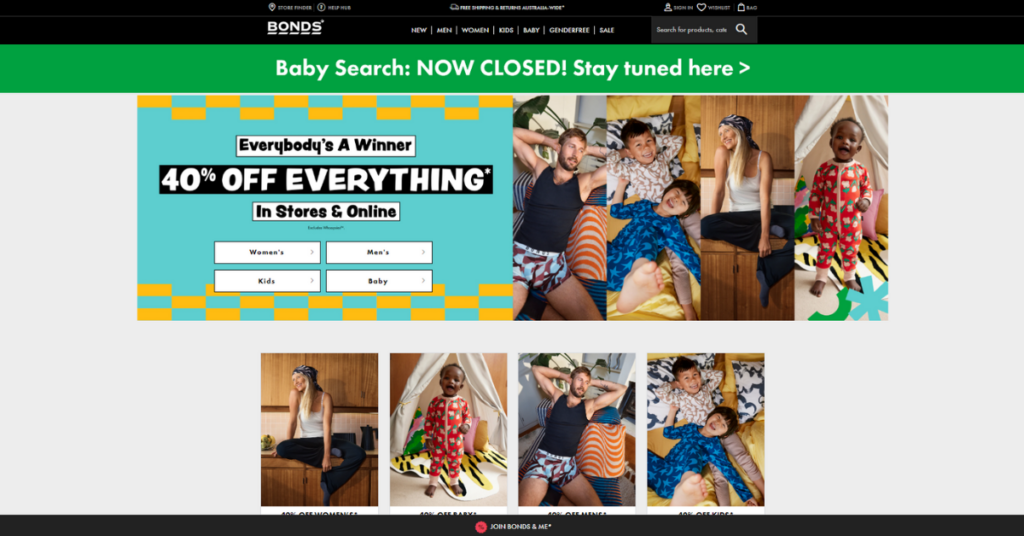
- Website: https://www.bonds.com.au/
- Platform: Magento Open Source
- Traffic: 4.891 M/month
- Ranking: #395 (Australia) & #27,597 (Global)
Sussan
Present in the Australian market for over 80 years, Sussan has won the hearts of consumers through a blend of modern style and comfort. Today, Sussan stands as an icon in the country’s fashion industry with unique outfits that emphasize the creativity and confidence of women.
Sussan’s fashion eCommerce website is customized and optimized on the Magento platform, providing customers with a unique shopping experience. The website simplifies the checkout process and integrates multiple third-party payment methods to increase choices for customers while streamlining the shopping process and reducing cart abandonment rates.

- Website: https://www.sussan.com.au/
- Platform: Magento Open Source
- Traffic: 3.286 M/month
- Ranking: #774 (Australia) & #53,618 (Global)
Kath Mandu
Kathmandu is known as a giant in the field of clothing and equipment for outdoor activities and adventure sports. This brand has played a significant role in making the outdoor life of Australians more exciting and comfortable.
The Kathmandu eCommerce website is developed using Magento, providing customers with a rich and easily customizable experience that can be expanded based on the business’s needs. Some notable features of the Kathmandu website include options for product sizes and colors, product comparisons, finding the nearest store, one-page checkout, and more.
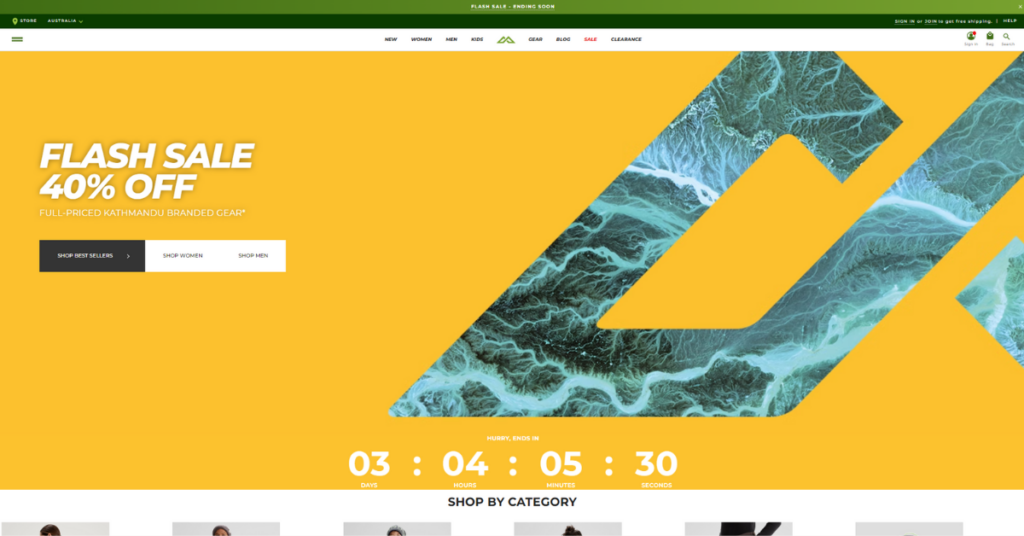
- Website: https://www.kathmandu.com.au/
- Platform: Magento Open Source
- Traffic: 3.108 M/month
- Ranking: #848 (Australia) & #53,547 (Global)
Glue Store
Established in 1990, Glue Store is a longstanding fashion chain in Australia. The brand specializes in offering products from top global brands such as Adidas, Nike, Stanley Tumblers, UGG, and various other streetwear labels.
In addition to its nationwide chain of stores in Australia and New Zealand, Glue Store provides customers with an online shopping experience through an eCommerce website built on Shopify. Glue Store has also developed a loyalty program allowing customers to accumulate points for purchases, redeemable for vouchers or gifts.
Additionally, customers can subscribe to Glue Store’s email newsletter for updates on the latest products and promotions. News and gifts will be tailored separately for male and female customers.

- Website: https://www.gluestore.com.au/
- Platform: Shopify
- Traffic: 2.988 M/month
- Ranking: #919 (Australia) & #59,921 (Global)
Sportsgirl
Sportsgirl is a fashion brand that emphasizes creativity and diversity in its collection of women’s fashion. With 70 years of history, Sportsgirl has become a popular shopping destination, inspiring individual style by combining the latest fashion trends with unique elements.
Sportsgirl has built an eCommerce website with Magento to provide an optimal customer experience, allowing for easy customization of features and system expansion to align with market development and trends. Additionally, Sportsgirl offers customers attractive deals, including discounts, buy one get one free promotion, free shipping, gift card giveaways, and a variety of payment methods.

- Website: https://www.sportsgirl.com.au/
- Platform: Magento Open Source
- Traffic: 2.499 M/month
- Ranking: #1,010 (Australia) & #66,774 (Global)
Style Tread
Styles Tread is a well-known shoe brand from Australia, specializing in providing products that offer comfort and premium style to consumers worldwide. Any pair of shoes in Styles Tread’s collection reflects sophistication in design and a commitment to providing a stylish and comfortable experience for the wearer.
The eCommerce fashion website of Style Tread focuses on minimalistic yet unique design elements to deliver the best customer experience, from browsing products to adding items to the cart and completing the payment process. Everything is streamlined to shorten the shopping time, encourage customers to make decisions quickly, and reduce the cart abandonment rate.

- Website: https://www.styletread.com.au/
- Platform: Magento Open Source
- Traffic: 2.230 M/month
- Ranking: #1,277 (Australia) & #85,676 (Global)
Pretty Little Thing
Pretty Little Thing is known as a famous Australian fashion brand specializing in creating trendy and modern outfits for young women. The combination of the latest fashion trends, product quality, and good value has helped Pretty Little Thing build a large fan base and maintain its position in the international fashion industry.
The eCommerce website of Pretty Little Thing uses a color palette of pink, white, and black with a design focus on minimalism and emphasis on user experience. Therefore, the brand deploys various unique features such as Smart Filtering & Searching, Image Search, Product Size Selection, Related Product Display, and Quick View Cart.

- Website: https://www.prettylittlething.com.au/
- Platform: Magento Open Source
- Traffic: 2.137 M/month
- Ranking: #943 (Australia) & #59,458 (Global)
Build your first clothing eCommerce website today!
Here are the top 10 leading fashion eCommerce websites in Australia that have quickly adapted to the increasing demands in the consumer trend of online shopping.
With extensive experience in developing eCommerce websites for numerous Australian clients, SECOMM possesses a team of highly experienced experts with advanced technical skills and a profound understanding of the Australian eCommerce market.
Contact SECOMM or call the hotline (+84)28 7108 9908 for a detailed consultation!
 2
2

 925
925

 0
0

 1
1

THE 8 BEST FURNITURE ECOMMERCE WEBSITES IN AUSTRALIA
The furniture eCommerce industry in Australia has seen significant growth in recent years, driven by a shift in consumer preferences from traditional offline shopping to online platforms.
According to IBISWorld, the industry generated a revenue of $1.7 billion in Australia in 2023, showcasing a growth rate of 5.9%. IBISWorld also predicts that by 2029, the revenue for Australia’s furniture eCommerce industry is anticipated to reach $2.4 billion.
Let’s delve into how the websites of the following 8 brands have played a role in fostering the growth of the Australian furniture eCommerce sector.
Temple and Webster
Temple and Webster is one of Australia’s leading brands in the furniture and interior decoration industry. This brand offers a diverse range of furniture and decorative items and emphasizes quality at the most favorable prices.
Over the years, Temple and Webster, operating without physical showrooms, has focused on online sales. Therefore, the eCommerce website of Temple and Webster has been invested in extensively, featuring a series of unique functionalities to optimize the customer shopping experience.
Notable features include Product Filtering and Search, Quick View of Products, Detailed Product Views, Displaying Products within the Same Category, and Order Checking. Additionally, Temple and Webster provides popular payment options in Australia such as PayPal, Afterpay, and Zip.
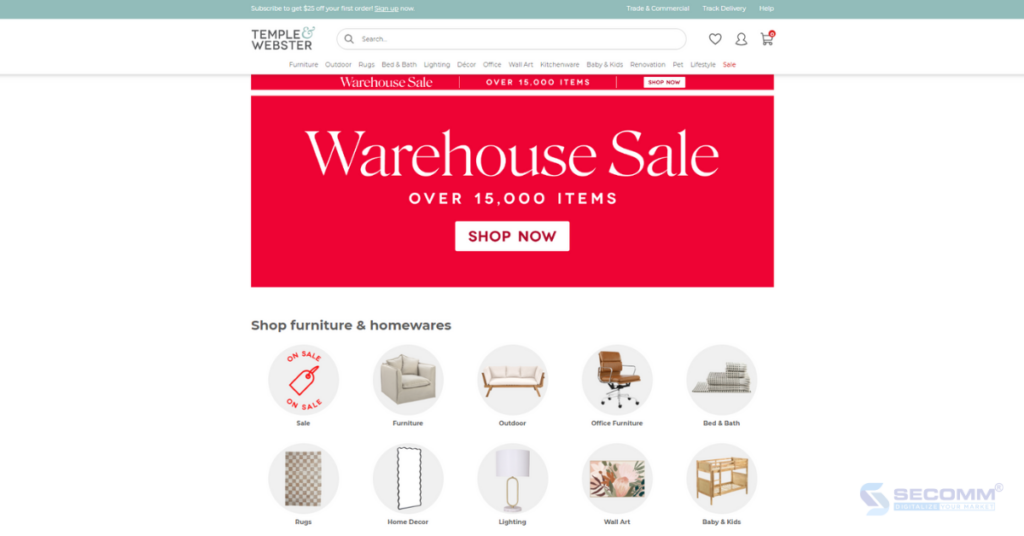
- Website: https://www.templeandwebster.com.au/
- Platform: Magento Open Source
- Traffic: 24.57M/month
- Ranking: #99 (Australia) & #6,317 (Global)
Fantastic Furniture
For over 30 years, Fantastic Furniture has become the top choice for customers seeking flexible and efficient furniture solutions. Currently, the brand owns more than 80 retail stores nationwide in Australia. In the realm of online sales, Fantastic Furniture has focused on building and expanding its eCommerce website.
Several unique features have been customized to facilitate easy shopping for customers. Some of these include Quick Product View, Product Color Selection, Product Comparison, Displaying Real Product Photos from customers’ Instagram, and diverse payment options such as Afterpay, Zip, and Latitude.
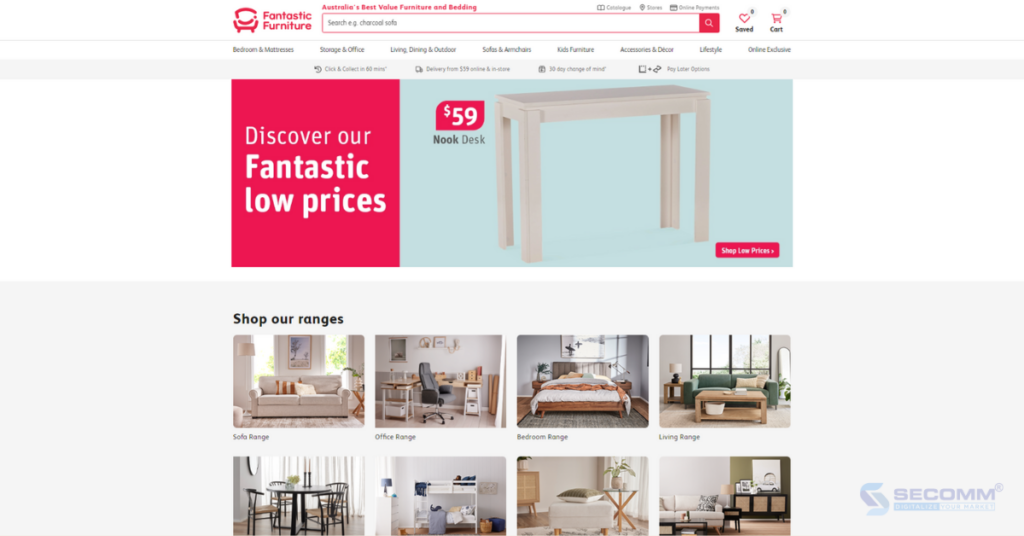
- Website: https://www.fantasticfurniture.com.au/
- Platform: SAP Commerce Cloud
- Traffic: 7.870M/month
- Ranking: #275 (Australia) & #21,372 (Global)
Amart Furniture
The next brand on this list is Amart Furniture. With a presence in over 40 locations in the Australian and New Zealand markets, Amart Furniture has gained popularity and trust from local consumers. The brand offers a diverse range of high-quality products and unique decorative solutions.
Amart Furniture’s furniture eCommerce website is a leading shopping destination in Australia, attracting over 6 million visits each month. With an intuitive interface and numerous advanced features, the website provides customers with a convenient and comfortable online shopping experience.
Additionally, Amart Furniture offers a 5-year quality guarantee on all its products and regularly introduces attractive promotional programs to attract and retain customers.
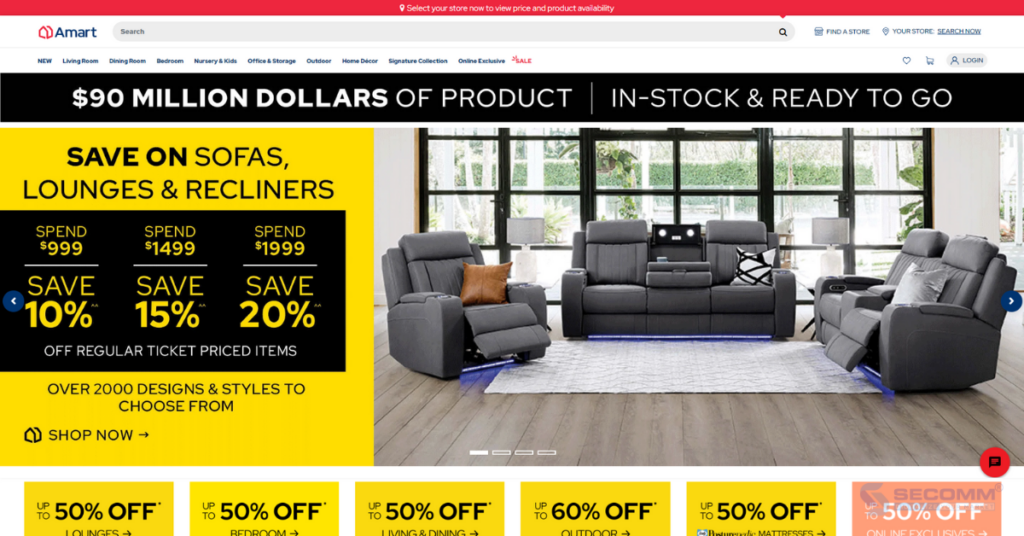
- Website: https://www.amartfurniture.com.au/
- Platform: Salesforce Commerce Cloud
- Traffic: 6.311M/month
- Ranking: #332 (Australia) & #24,865 (Global)
Freedom
Freedom is renowned for its minimalist and modern-style furniture products. The brand’s product portfolio is quite diverse, ranging from living rooms, bedrooms, kitchens, outdoor furniture, and more. Freedom’s eCommerce website is designed with a harmonious and visually appealing interface, featuring numerous unique features to provide customers with an optimal experience.
Freedom also focuses on establishing a Loyalty Program, allowing customers to create accounts to accumulate points and enjoy attractive benefits while shopping. The combination of uniqueness, quality, and convenience of online shopping contributes significantly to Freedom’s strong position in the Australian furniture market.

- Website: Freedom.com.au
- Platform: SAP Commerce Cloud
- Traffic: 4.915M/month
- Ranking: #403 (Australia) & #29,160 (Global)
Nick Scali
Nick Scali is a specialized Australian brand in designing sofas and retailing furniture. With over 50 years of operation, this brand has captivated customers with innovative designs and a commitment to providing sophisticated living spaces for every household.
Nick Scali’s furniture eCommerce website features several special functionalities to facilitate easy navigation and product purchases. Notably, the 360-degree product view and customization options for size and color based on customer preferences are highlighted. Additionally, the website’s minimalist and intuitive design further enhances the customer experience, making it smooth and enriching.
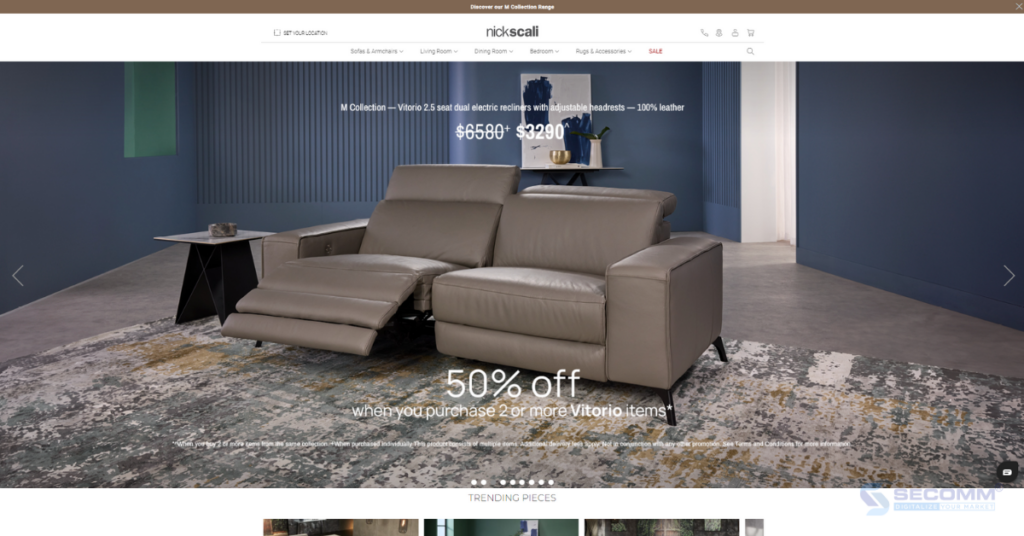
- Website: nickscali.com.au
- Platform: Magento Open Source
- Traffic: 1.937M/month
- Ranking: #939 (Australia) & #61,660 (Global)
Koala
Koala is well-known in both the Australian and New Zealand markets for its high-quality, modern, and innovative furniture products. Furthermore, in the years 2023 and 2024, Koala’s mattresses consecutively ranked as the most beloved on Product Review.
Koala’s furniture eCommerce website is designed to showcase the elegance and modernity of its products. With an intuitive interface, customers can easily explore and select products. Additionally, industry-specific features such as AR/VR and 360-degree viewing are integrated into the website.

- Website: https://koala.com/en-au
- Platform: Shopify Plus
- Traffic: 1.4M/month
- Ranking: #1,193 (Australia) & #40,802 (Global)
Life Interiors
In the Australian furniture industry, Life Interiors stands out as a prominent and well-regarded name. Over the years, it has been the preferred choice for those who appreciate contemporary styles in furniture.
The brand places a significant focus on its online presence, achieving this through the development of a furniture eCommerce website with tailored features to enhance the shopping and payment experience for customers. Furthermore, Life Interiors regularly launches enticing shopping programs as part of its efforts to attract and engage customers.
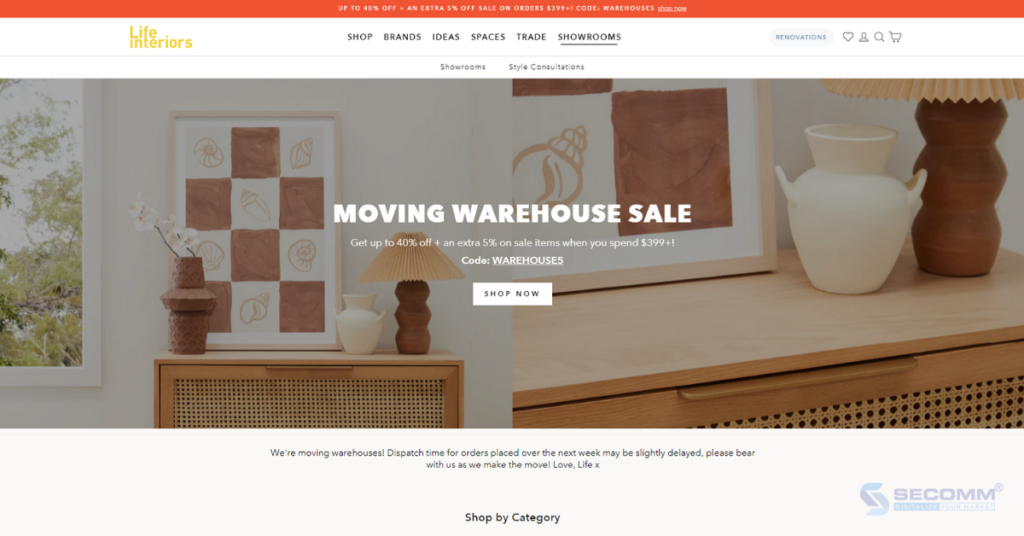
- Website: https://lifeinteriors.com.au/
- Platform: Shopify Plus
- Traffic: 681.8K/month
- Ranking: #3,572 (Australia) & #211,036 (Global)
King Living
King Living is known in the Australian furniture market as an icon of luxury and innovation. The furniture eCommerce website is a reliable online shopping destination for customers seeking curated and high-standard furniture solutions. King Living has invested in developing various advanced features on the website to provide customers with the best shopping experience.
Notable features include 360-degree viewing, VR/AR, product specification viewing and downloading, one-page checkout, and more. Thanks to these efforts, for more than 40 years, King Living has established a strong presence in the consumer community, particularly among those who value the sophistication of premium living spaces.
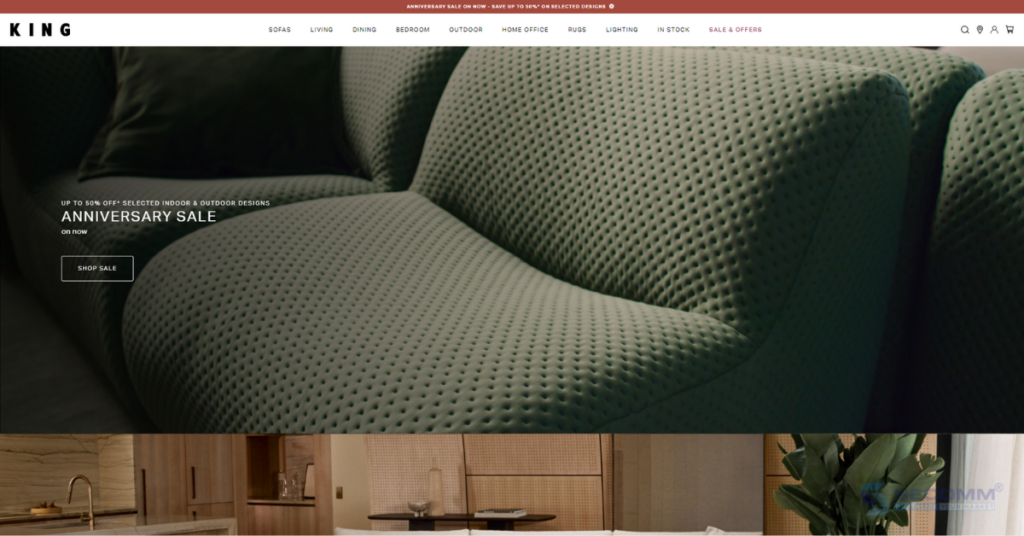
- Website: https://www.kingliving.com.au/
- Platform: Magento Open Source
- Traffic: 224.5K/month
- Ranking: #3,293 (Australia) & #195,617 (Global)
Build your first furniture eCommerce website today!
Above are the top 8 furniture brands in Australia that have successfully established and maintained their online presence by building eCommerce websites and investing to develop custom features.
With years of experience in developing successful e-commerce website projects across various platforms for numerous Australian clients such as Laybyland, Jasnor, RodShop, Trentham Estate, etc., SECOMM has a team of highly experienced experts with advanced technical skills and a deep understanding of the eCommerce market.
For detailed advice, please contact SECOMM or call the hotline (+84)28 7108 9908!
 2
2

 926
926

 0
0

 1
1





